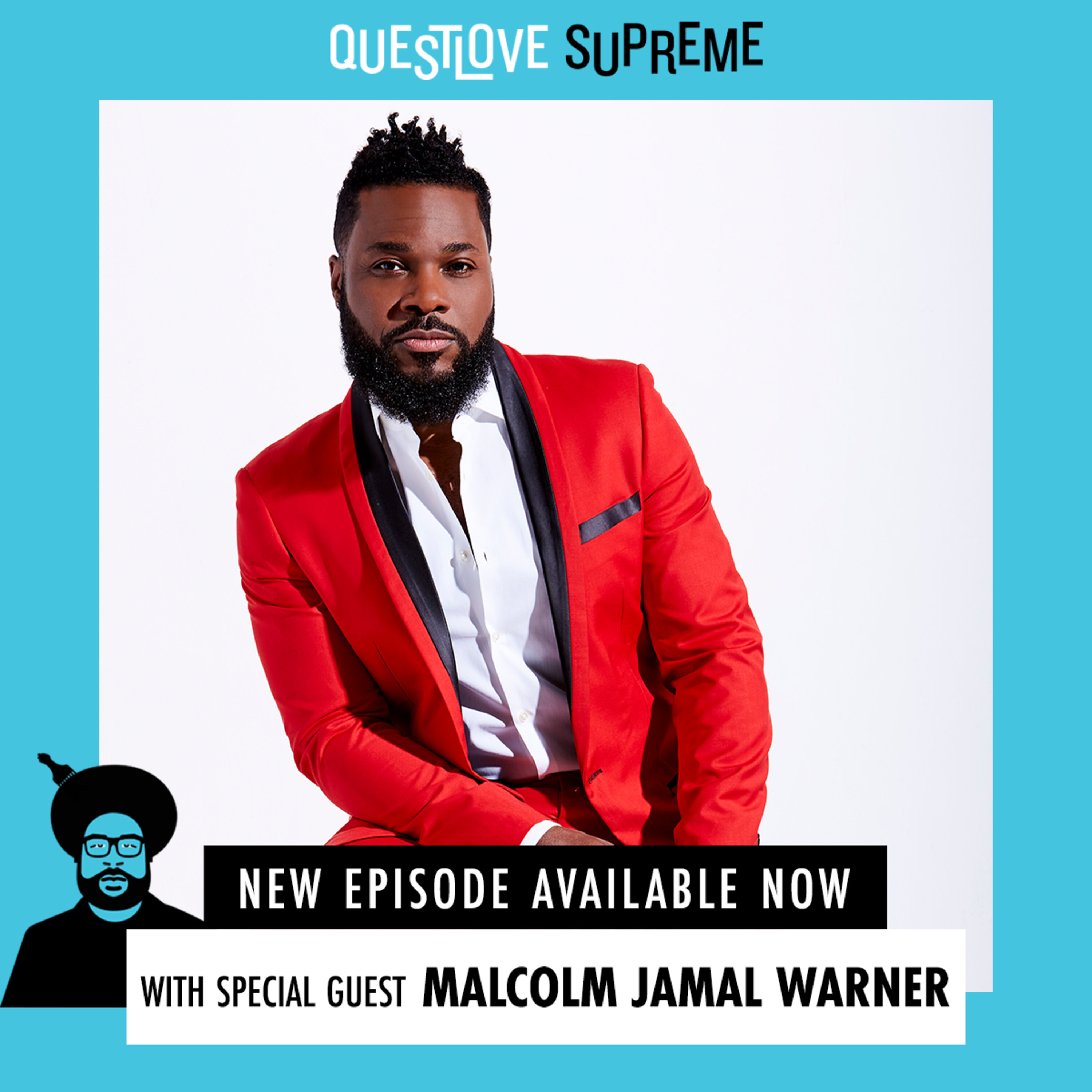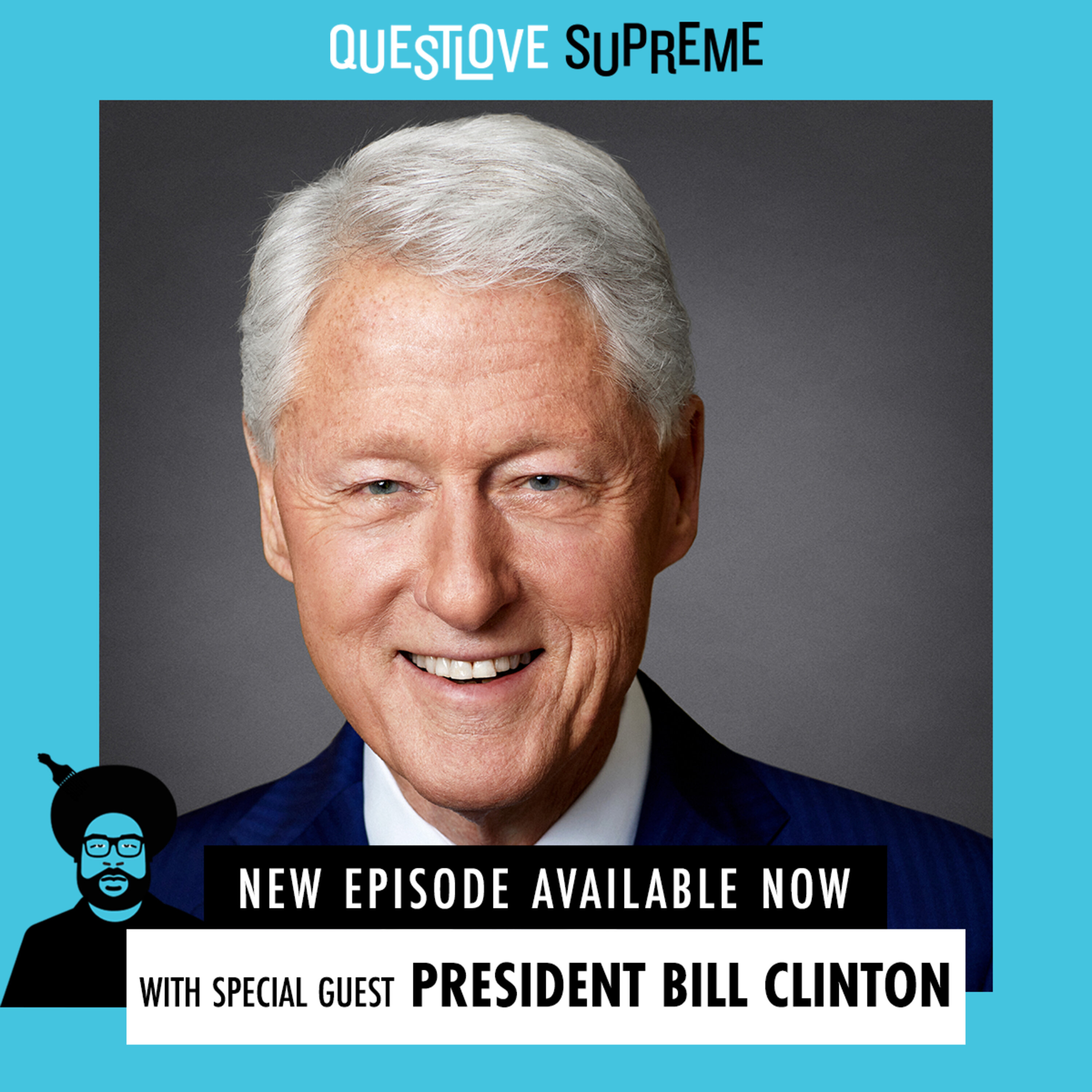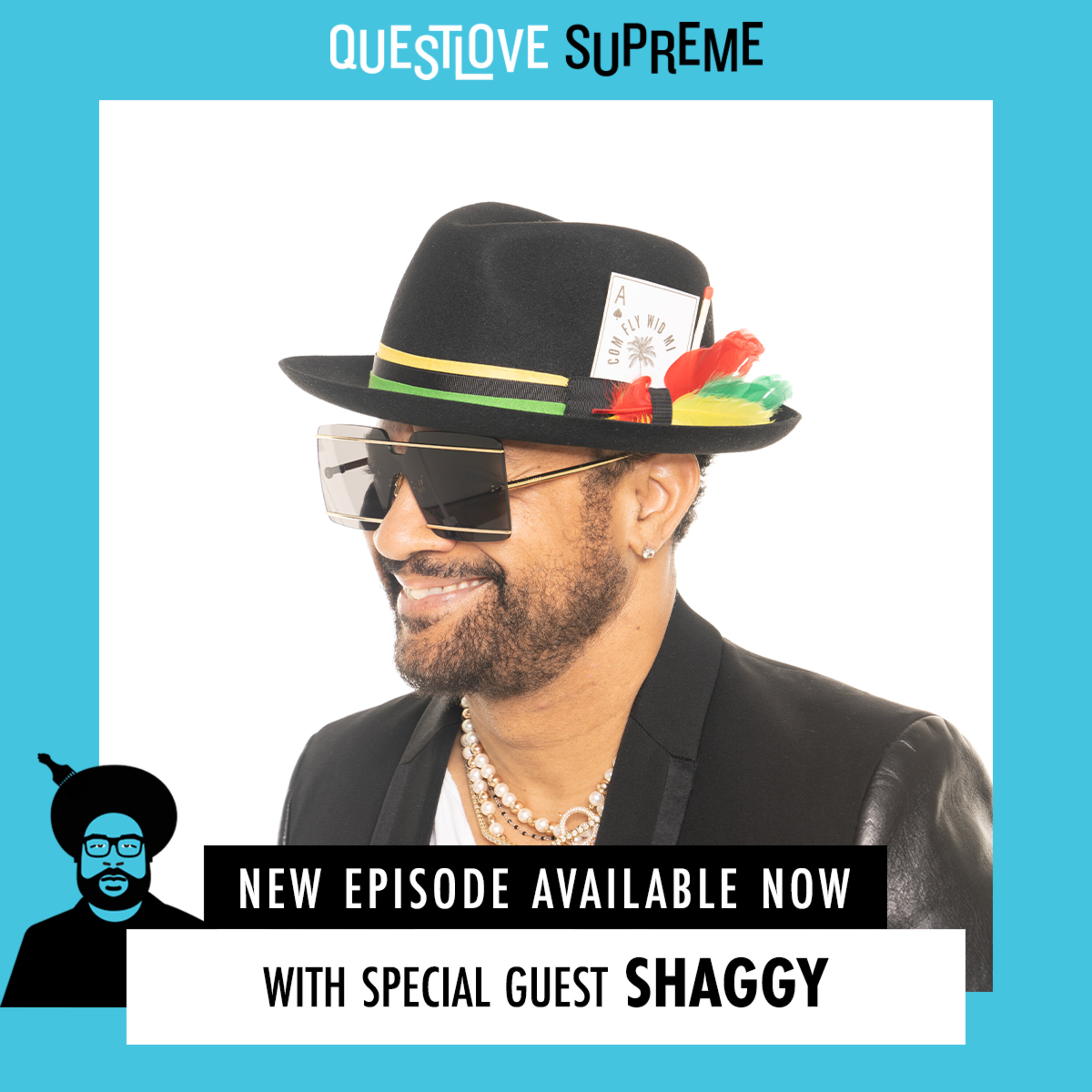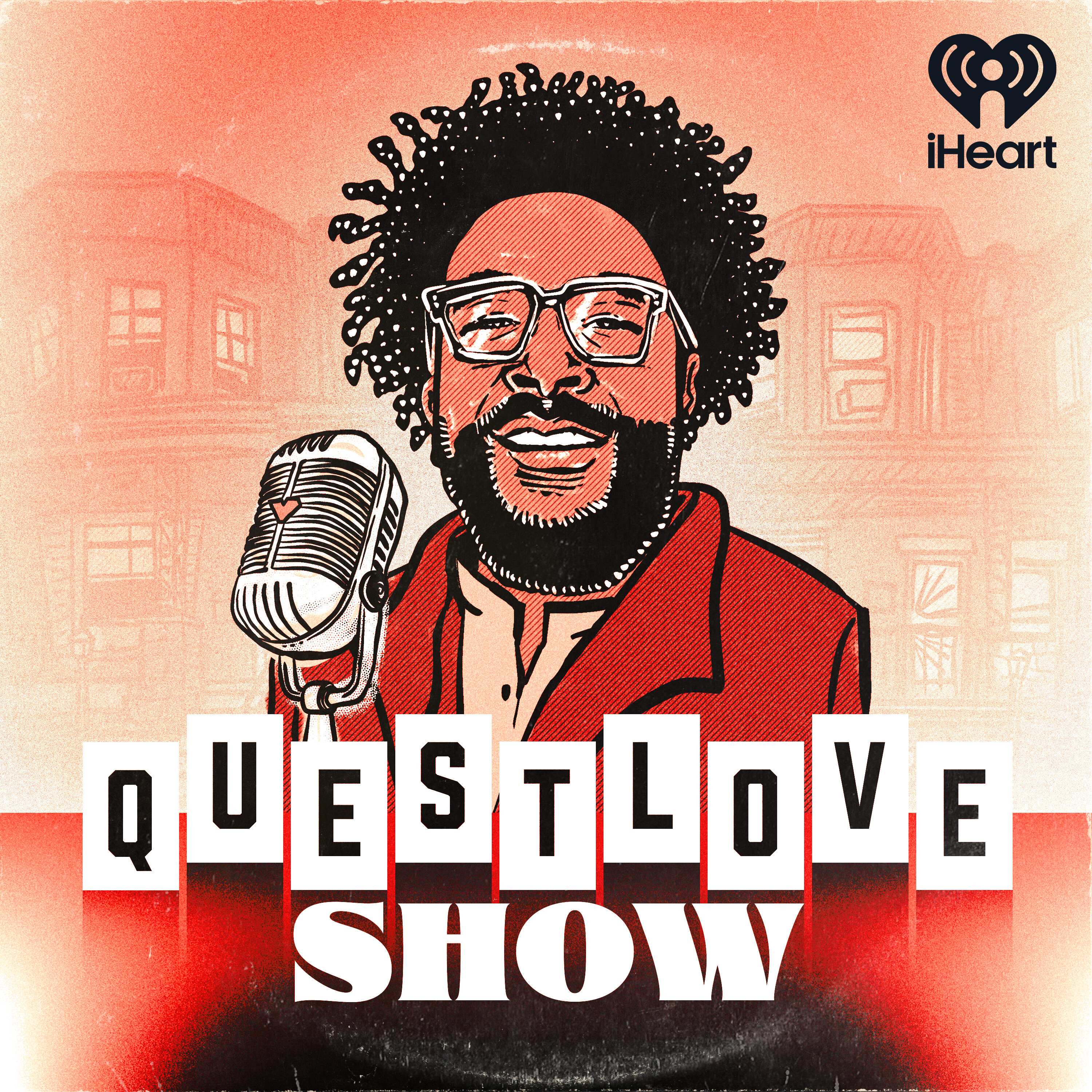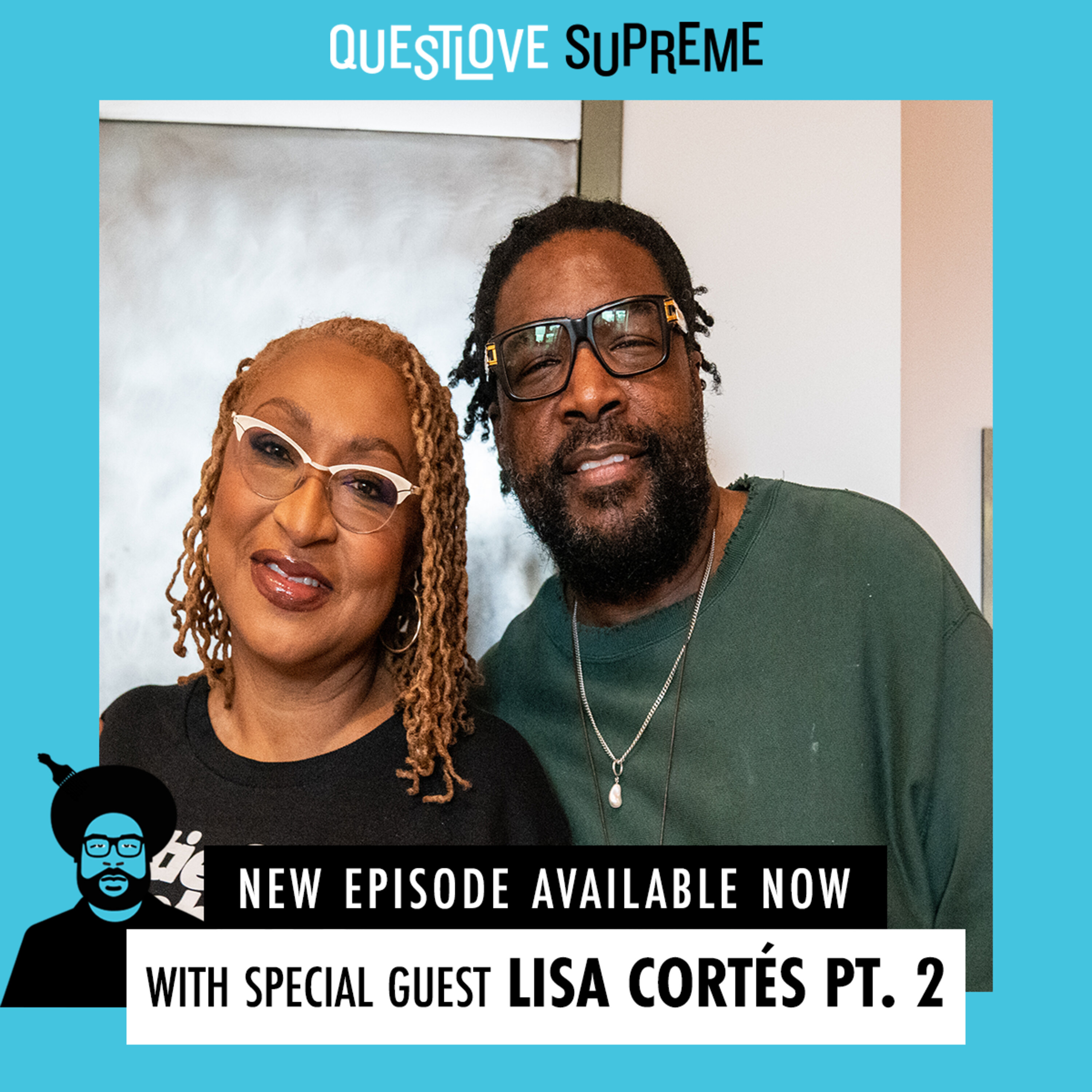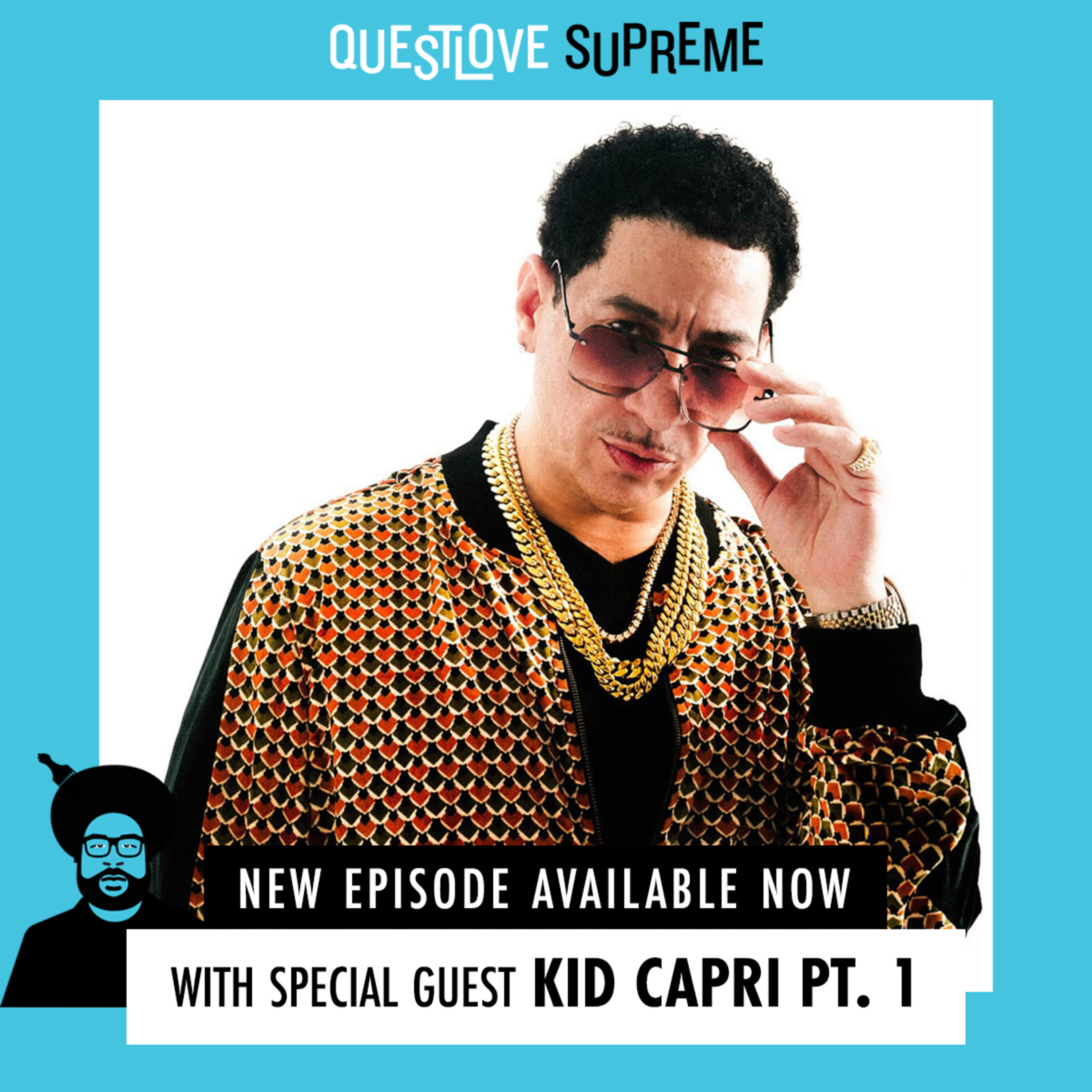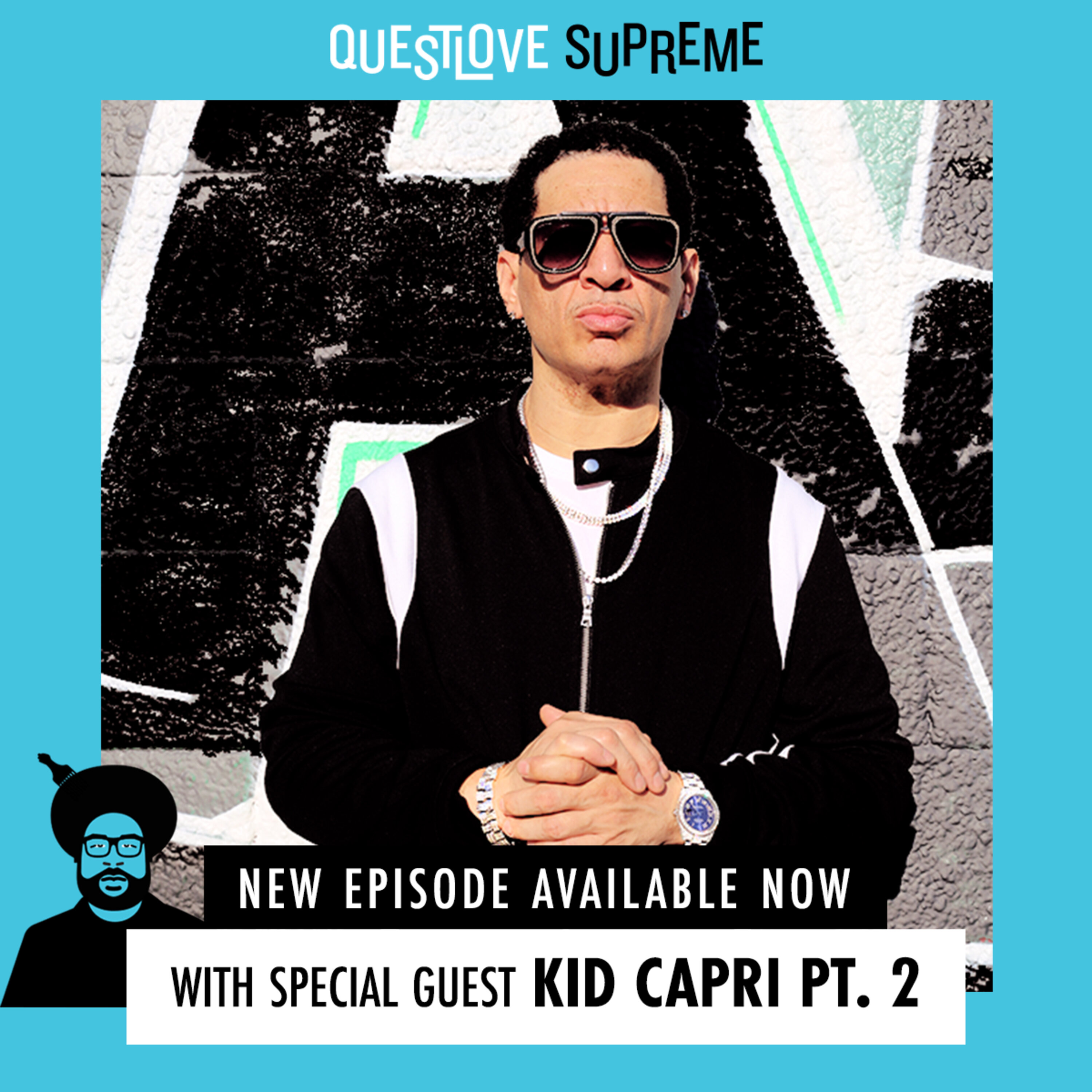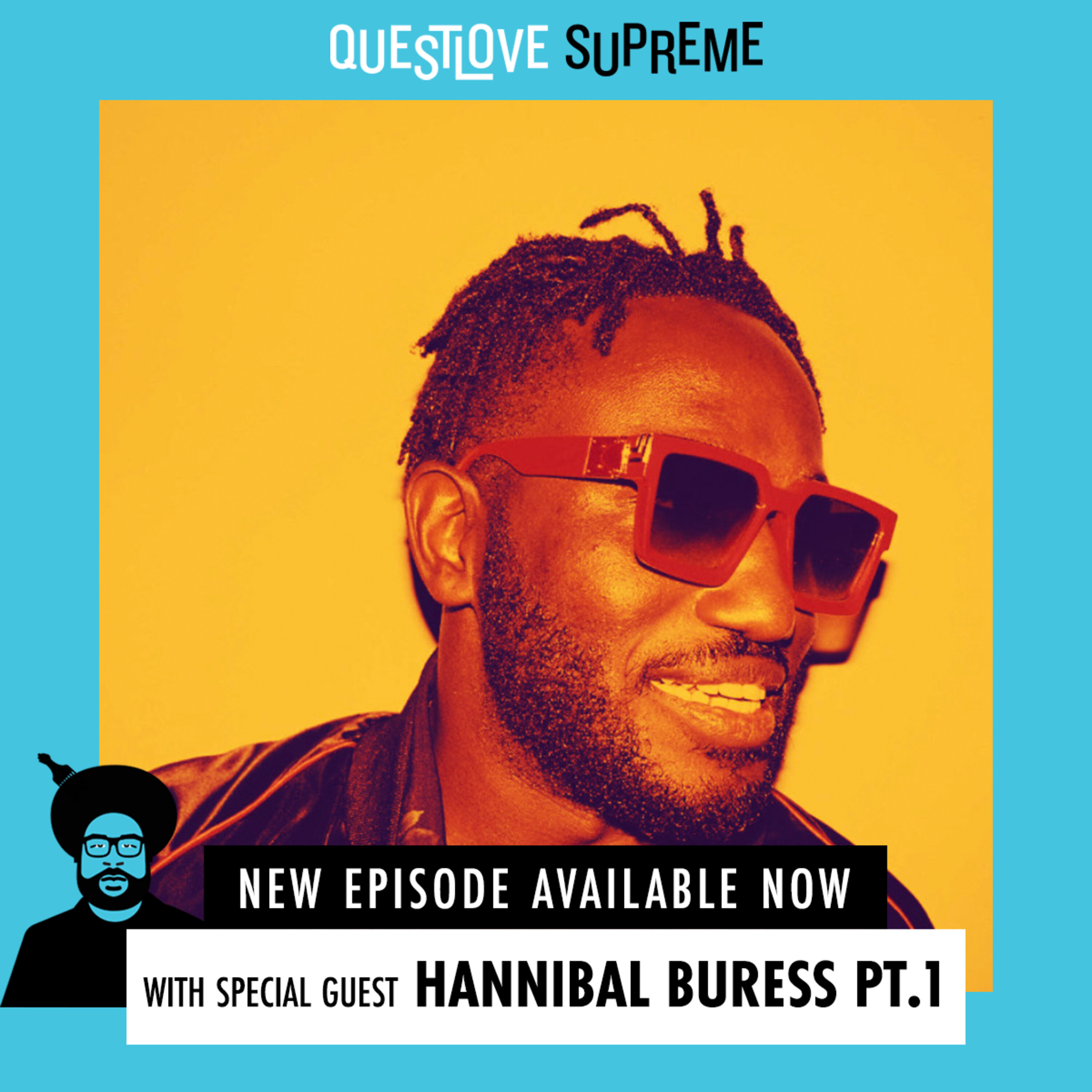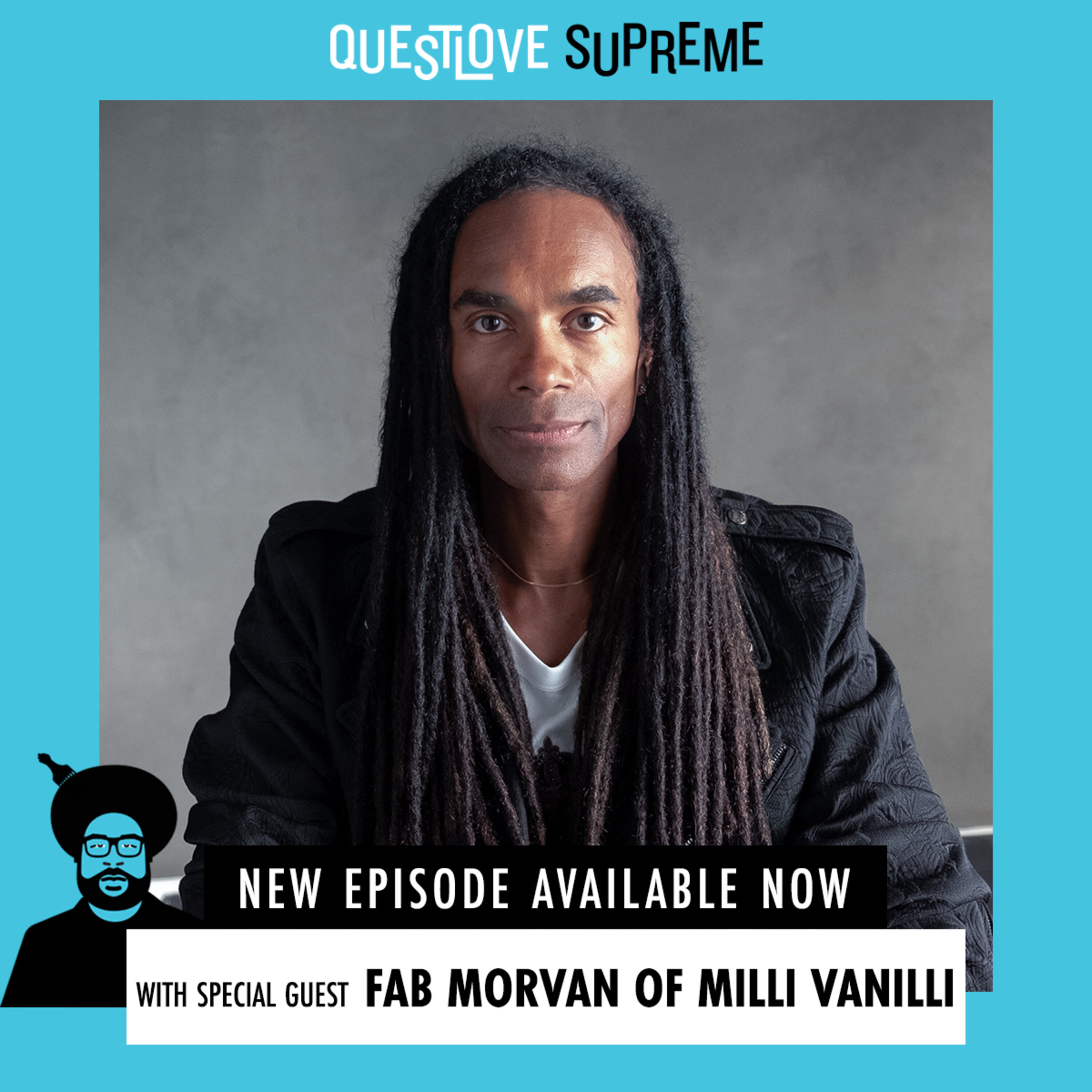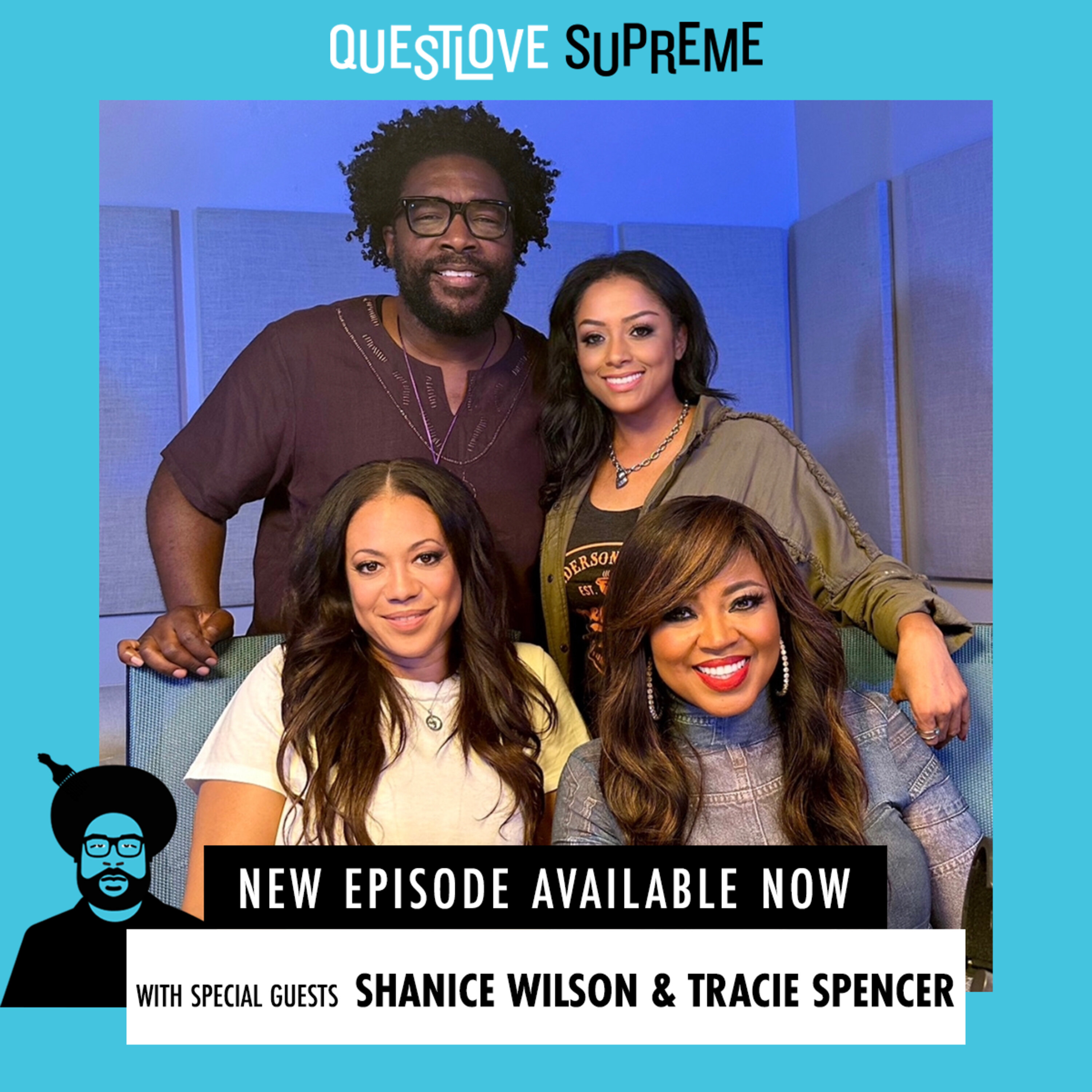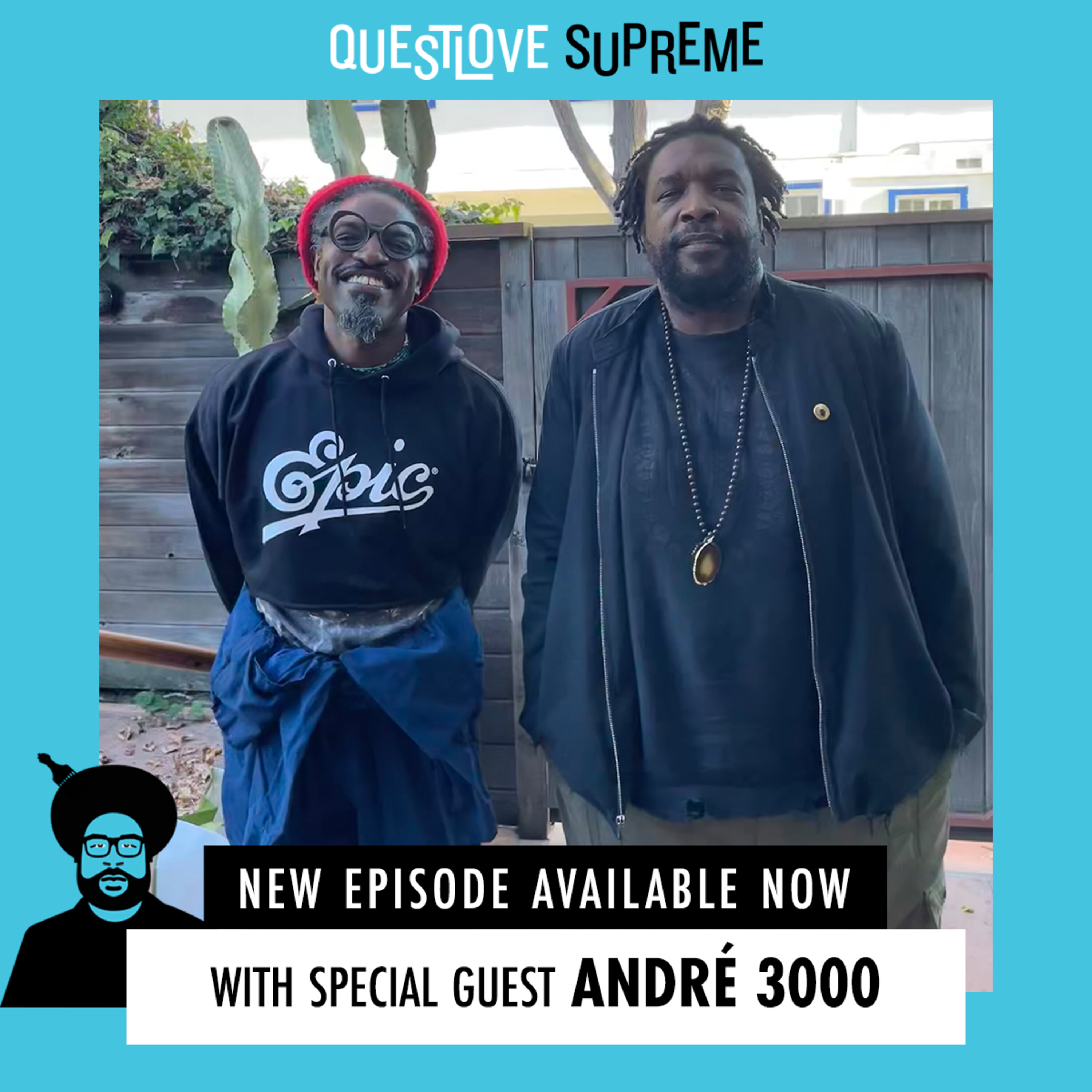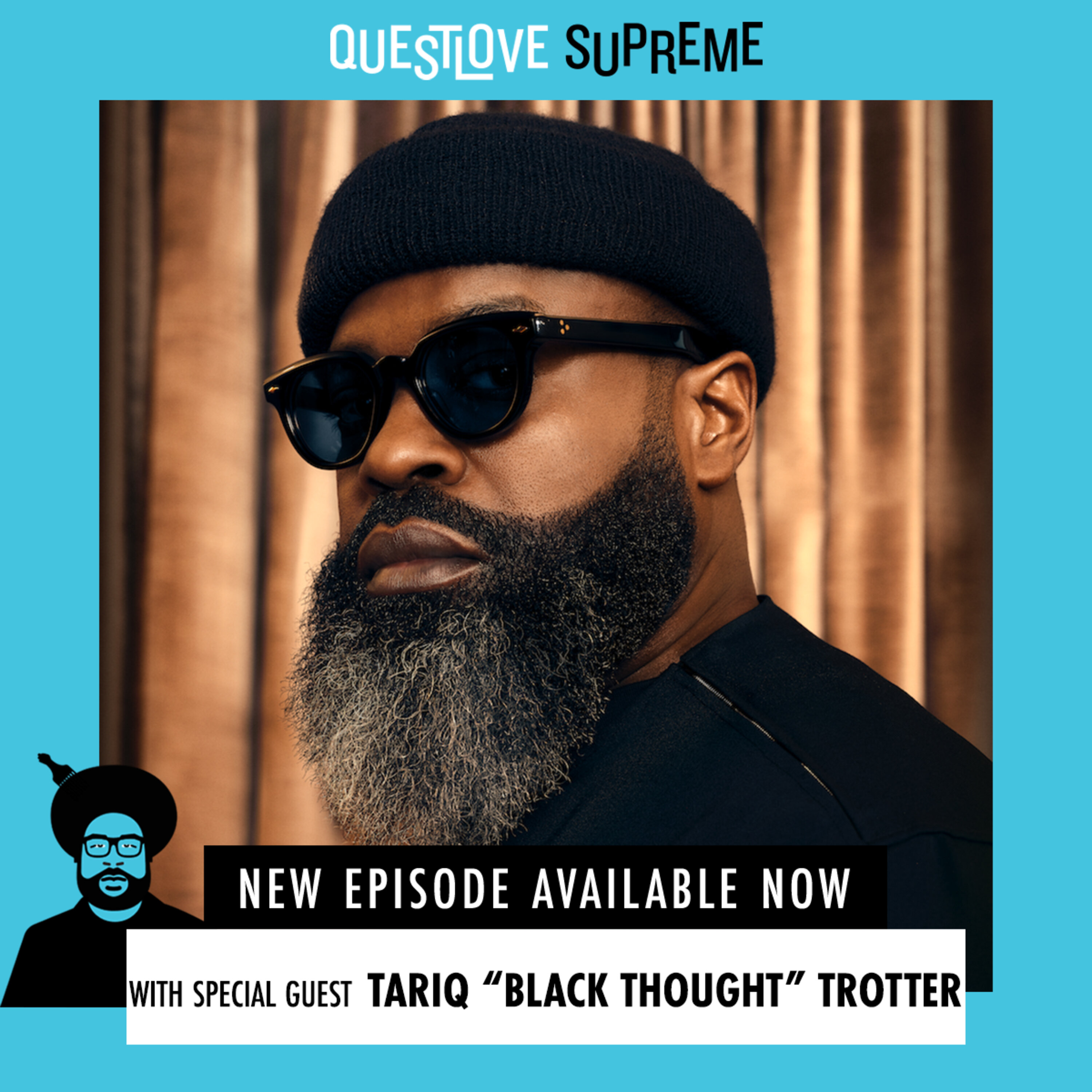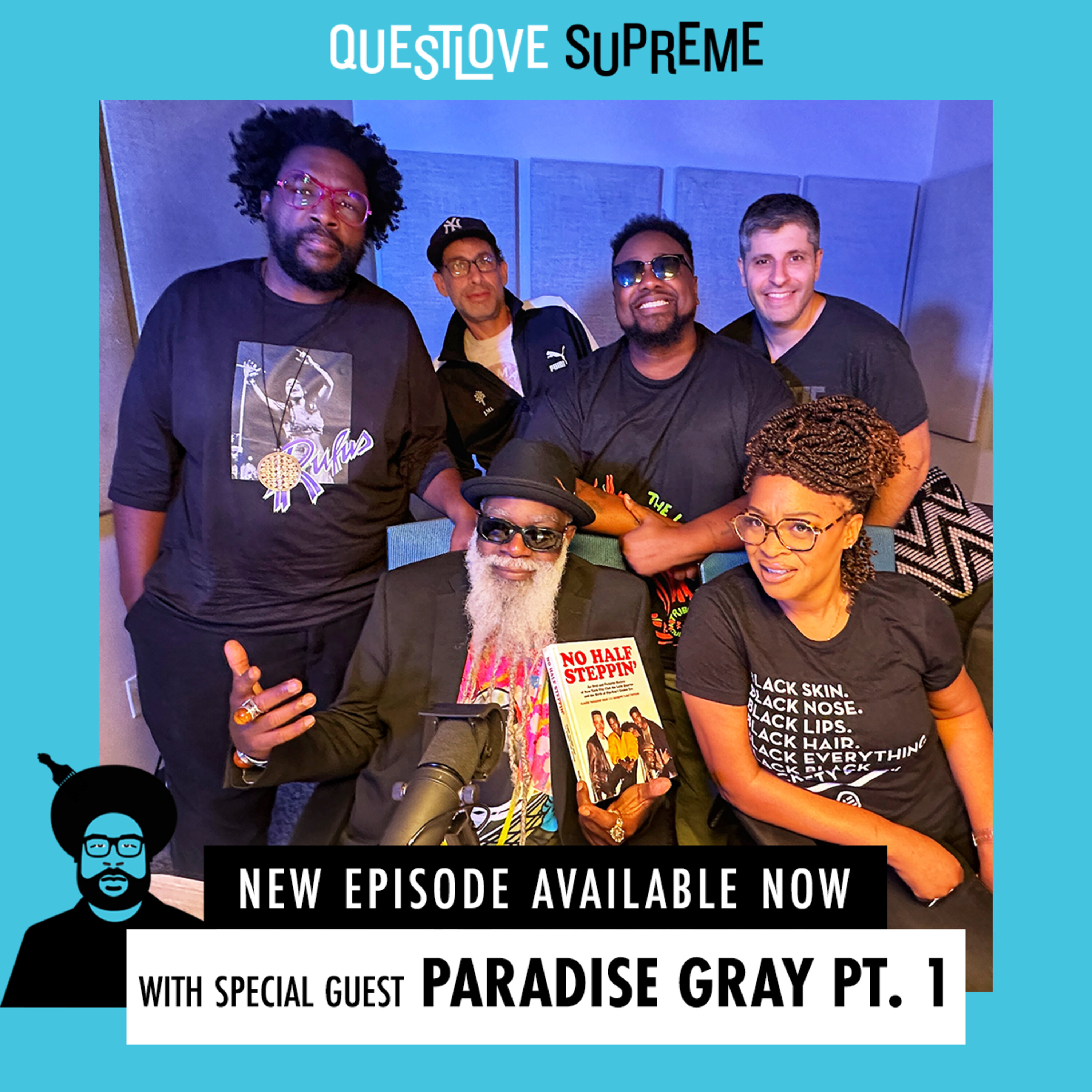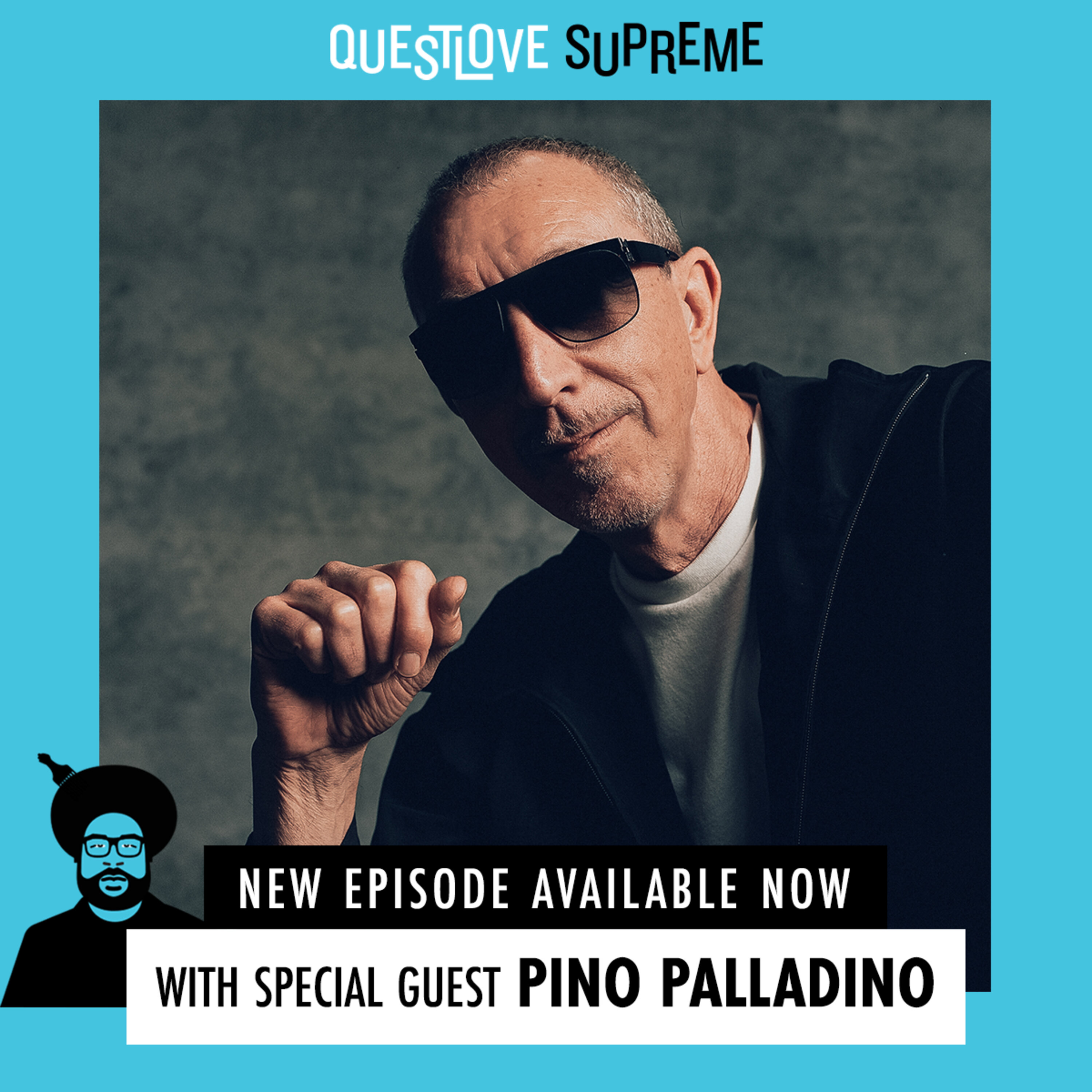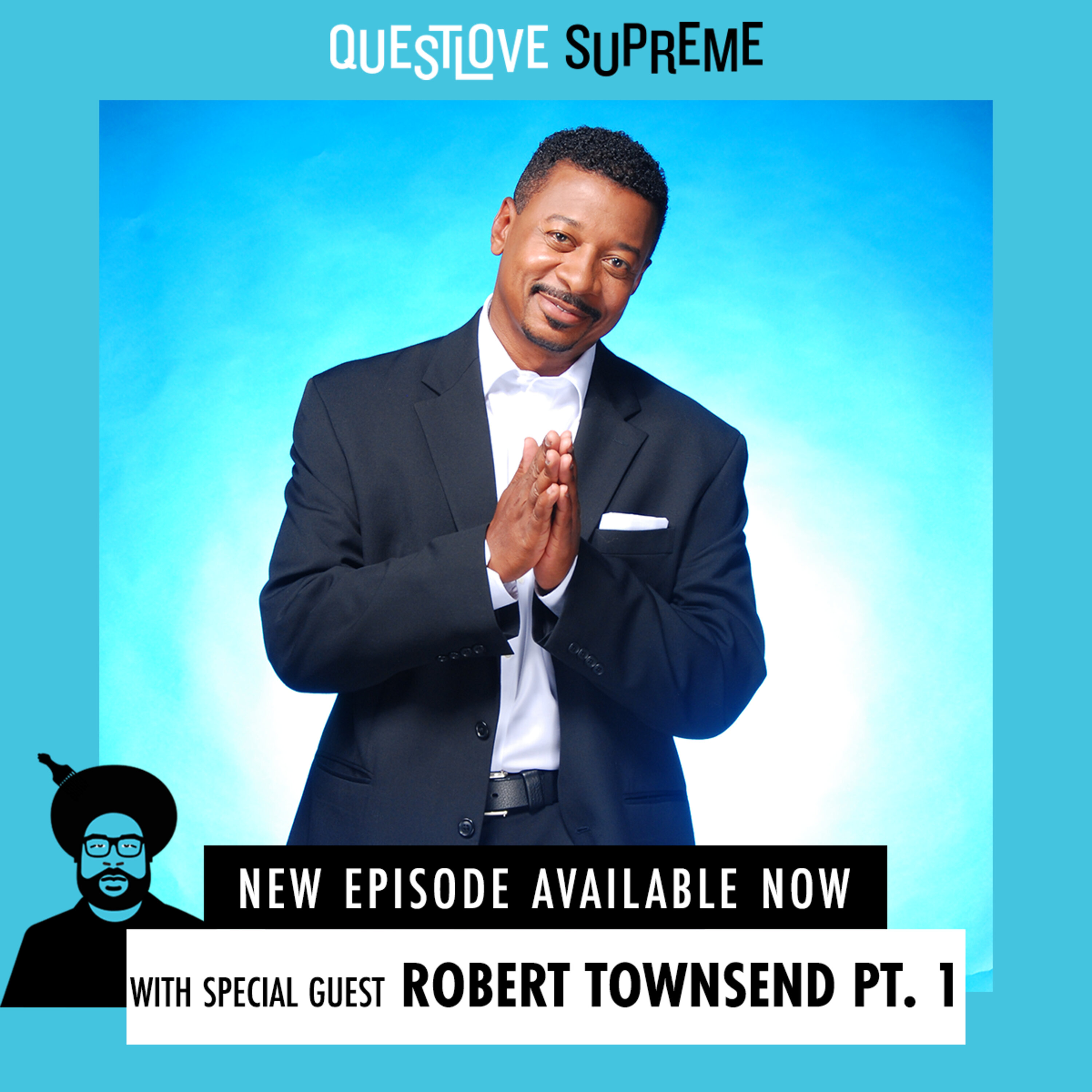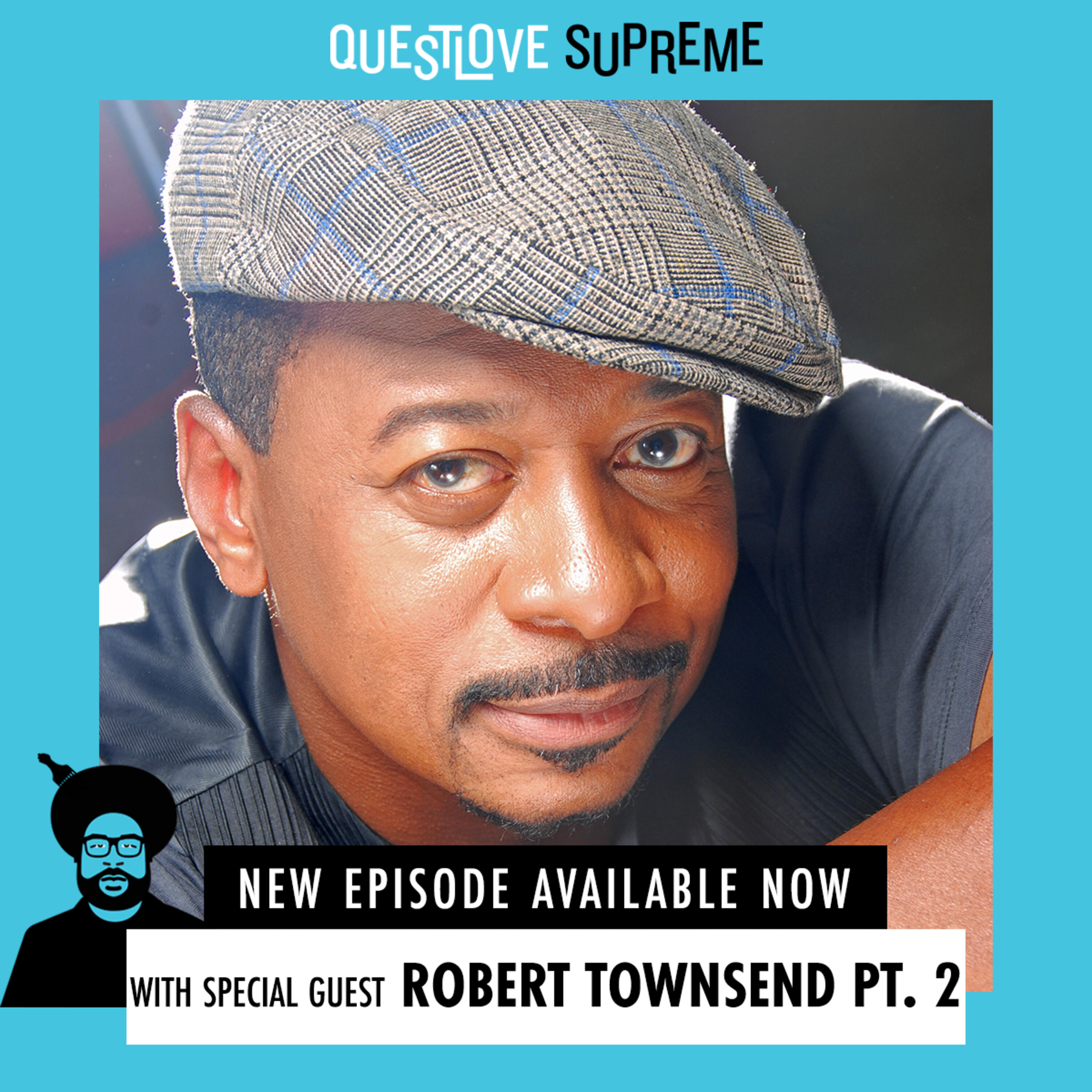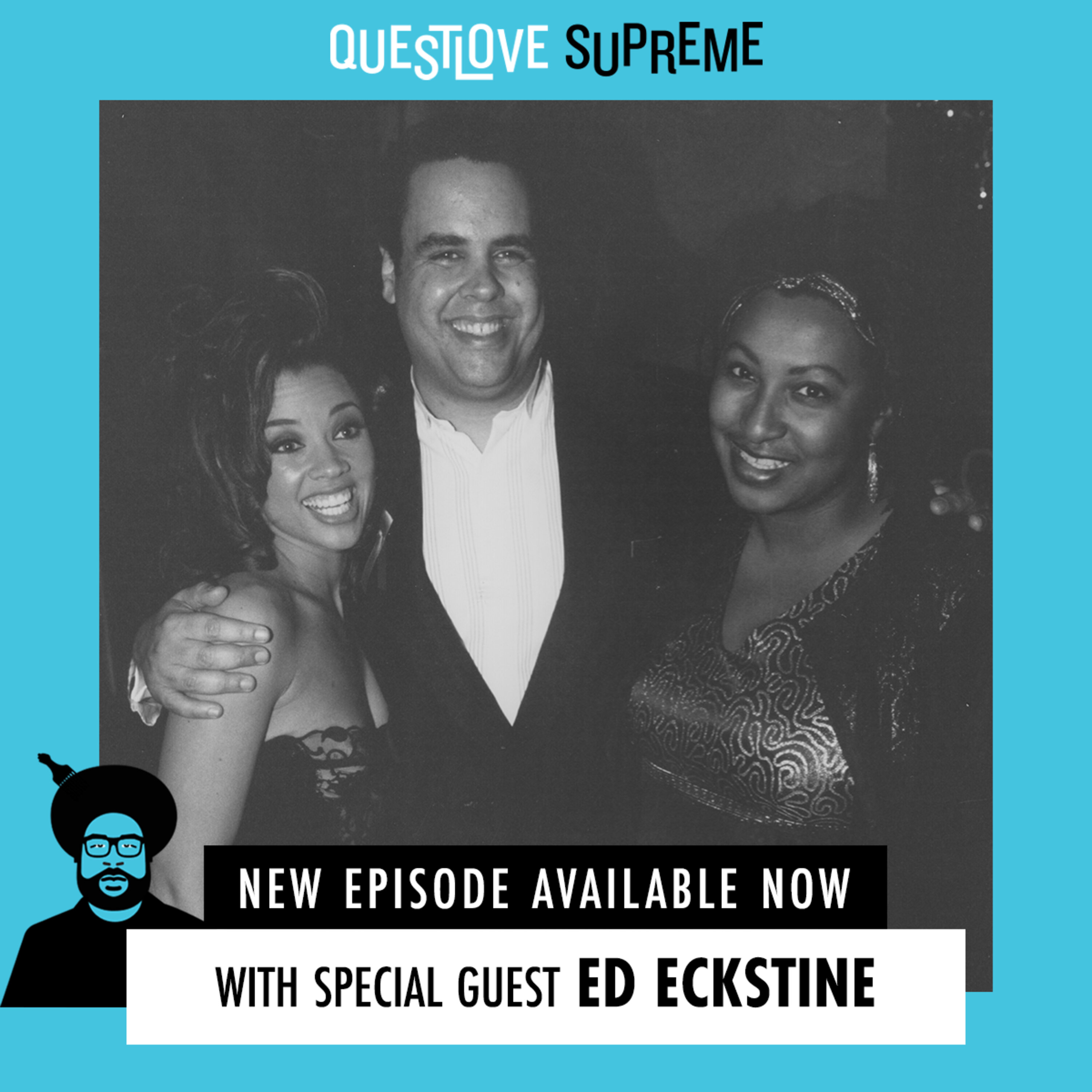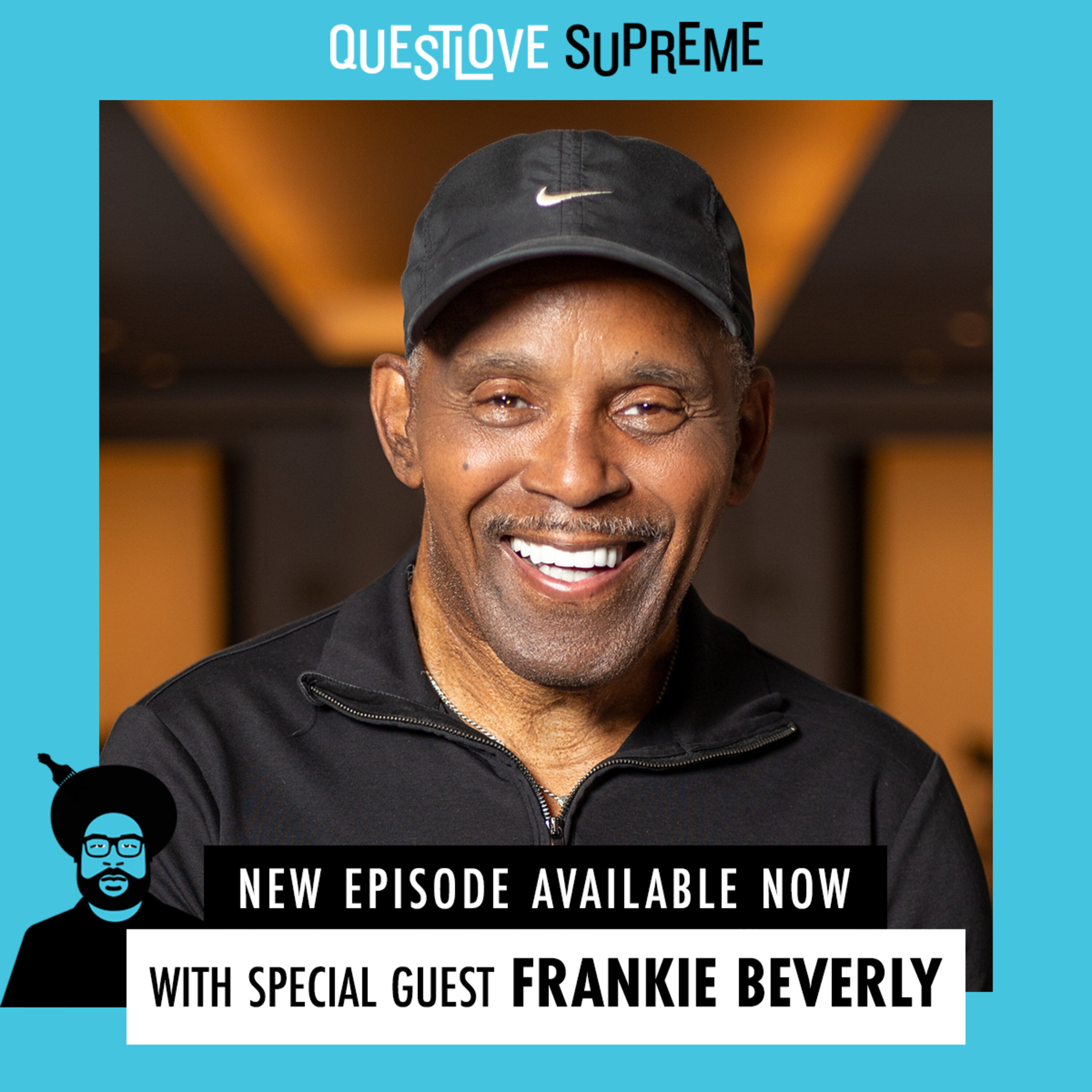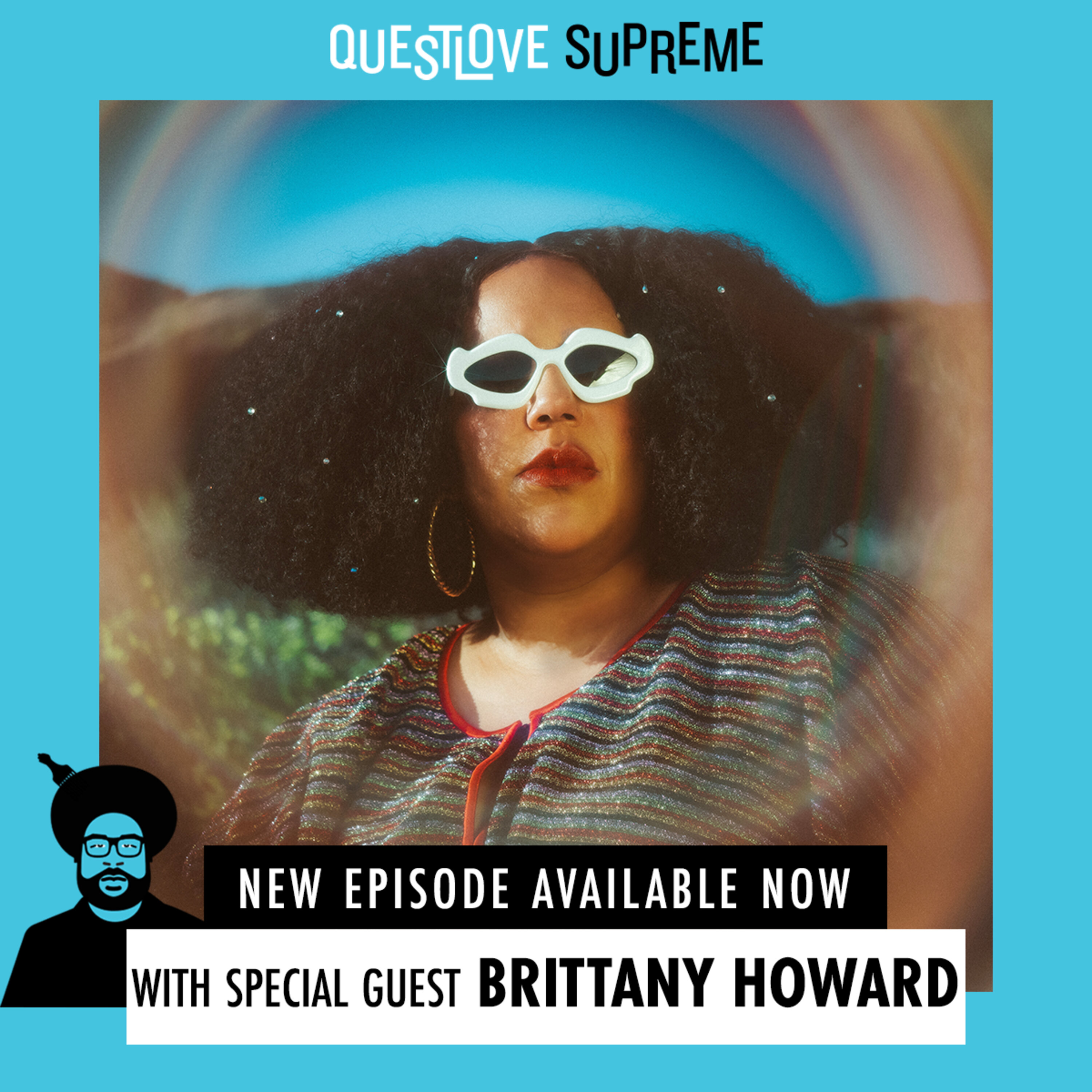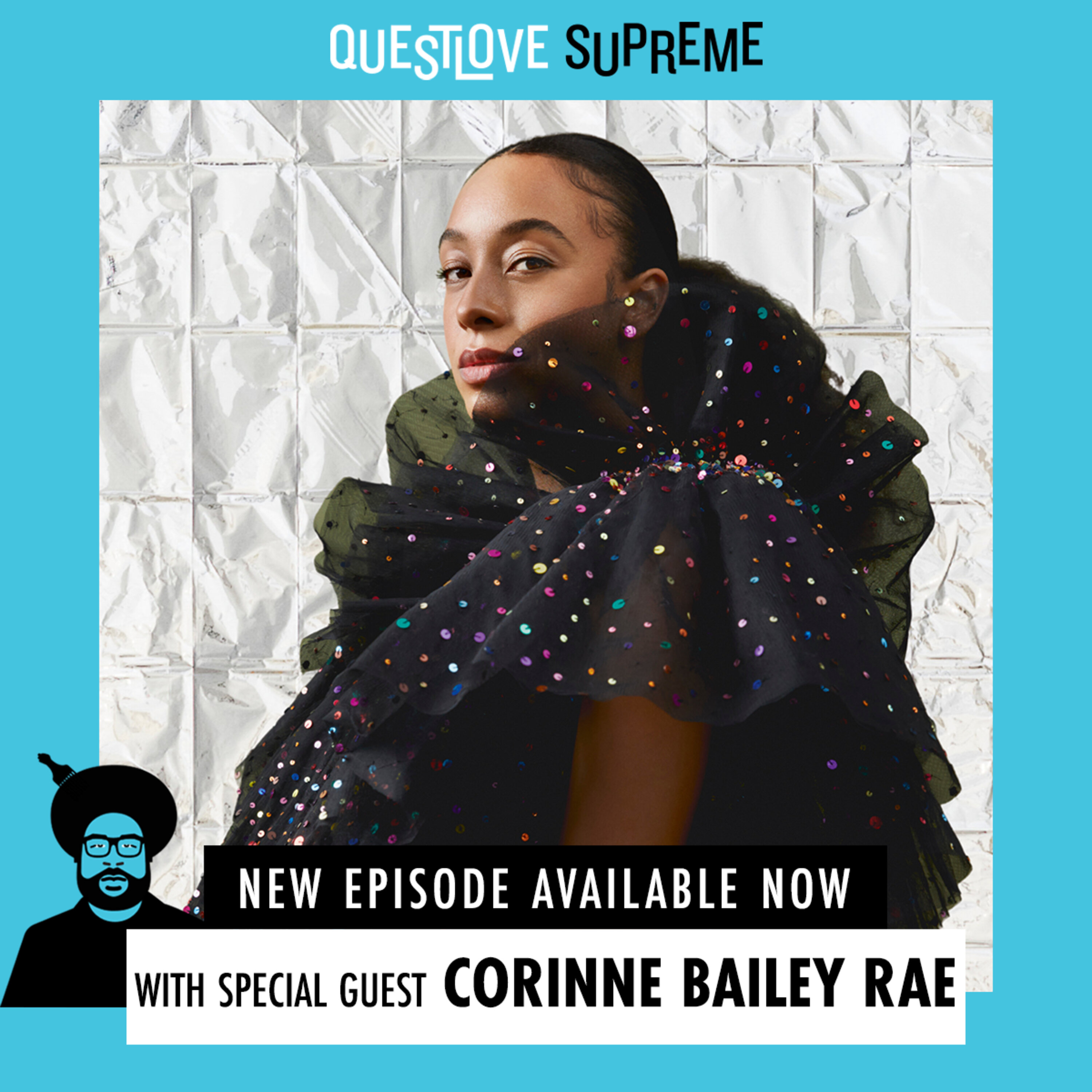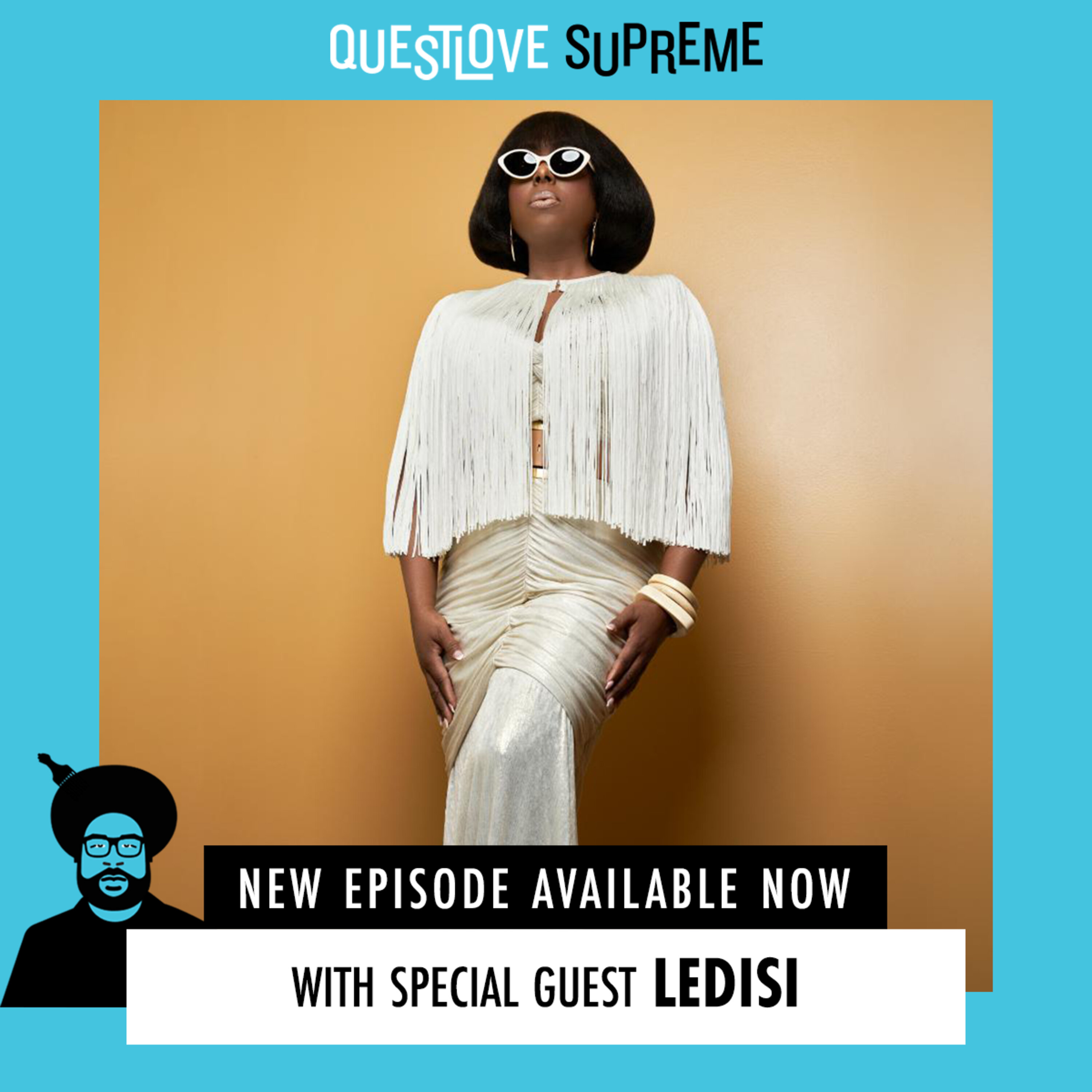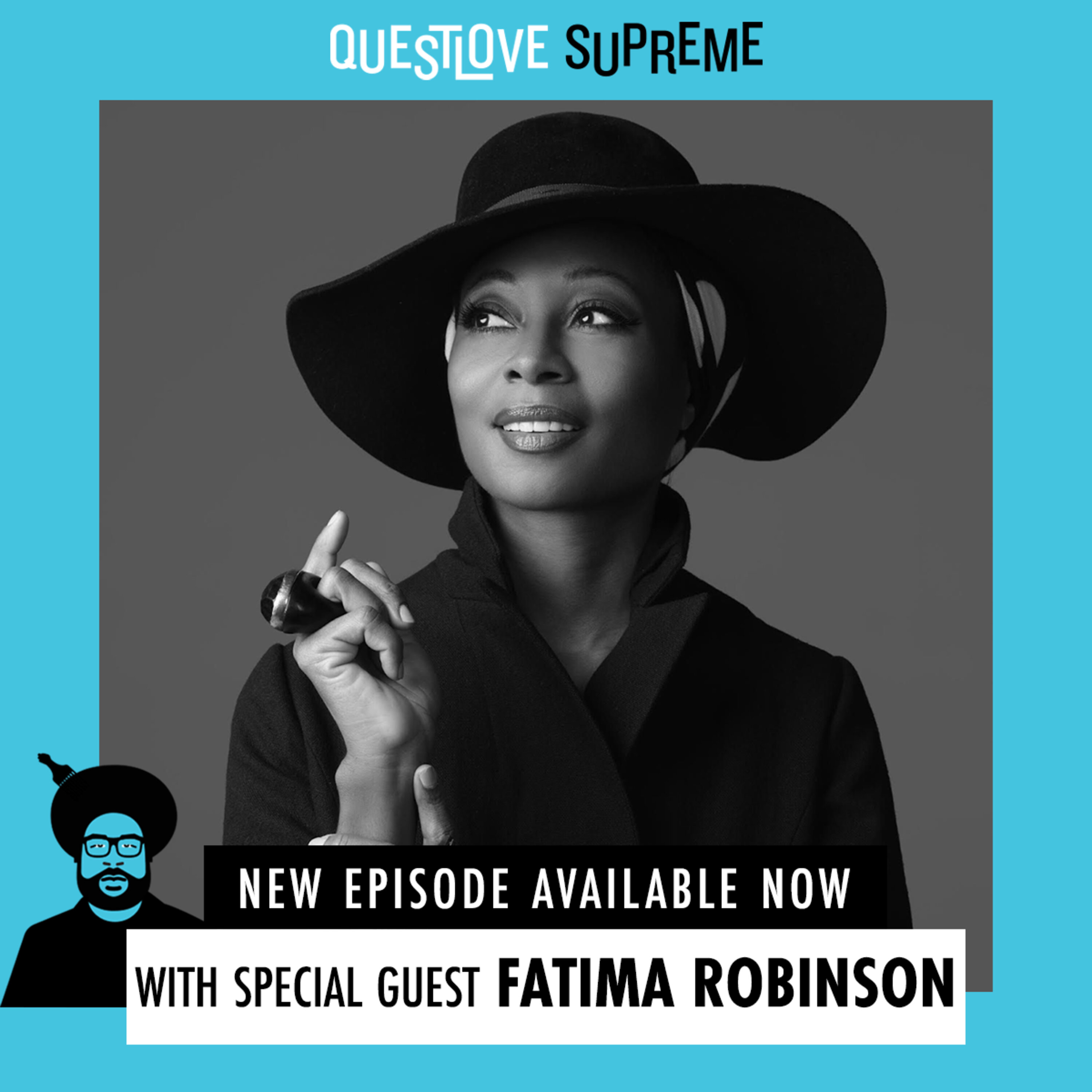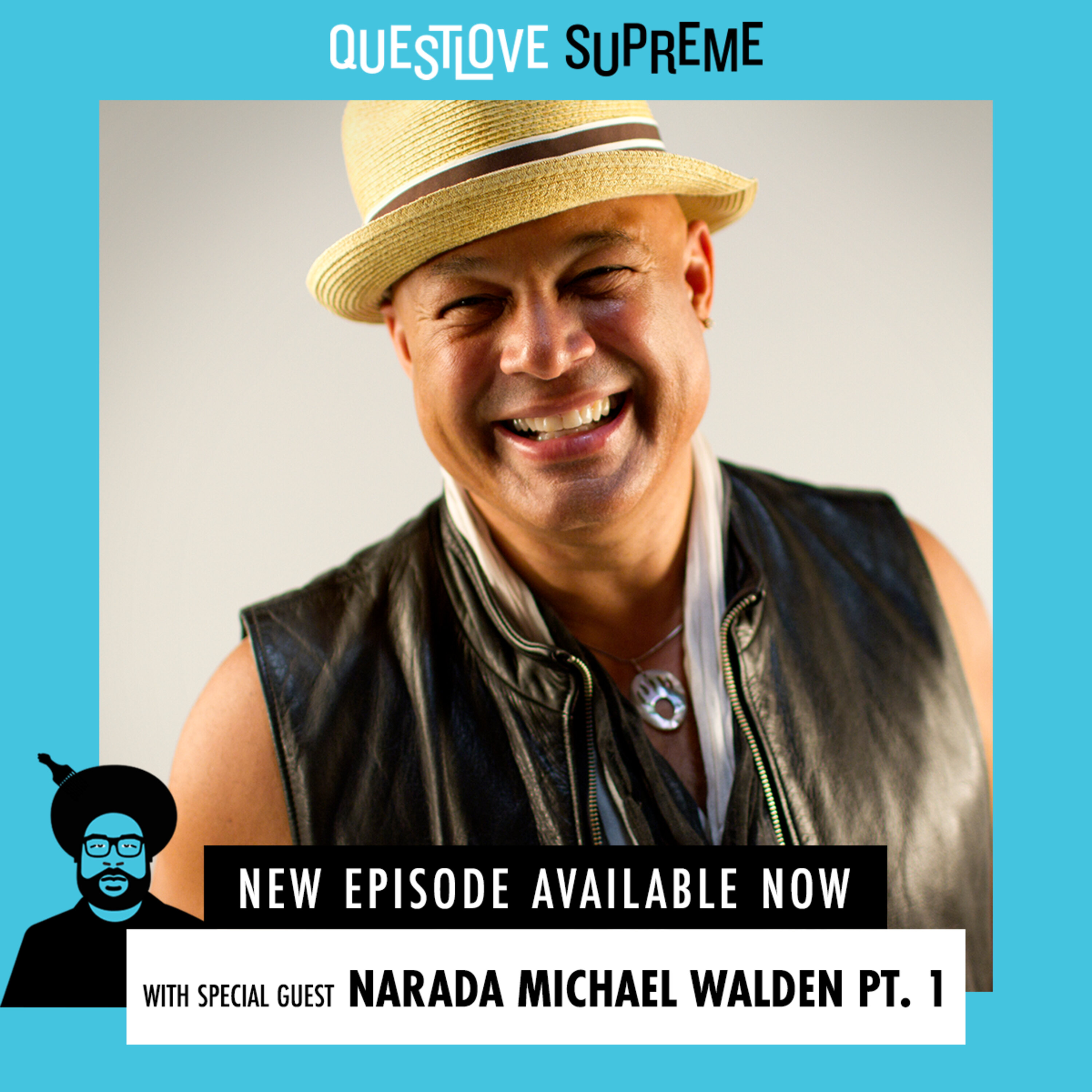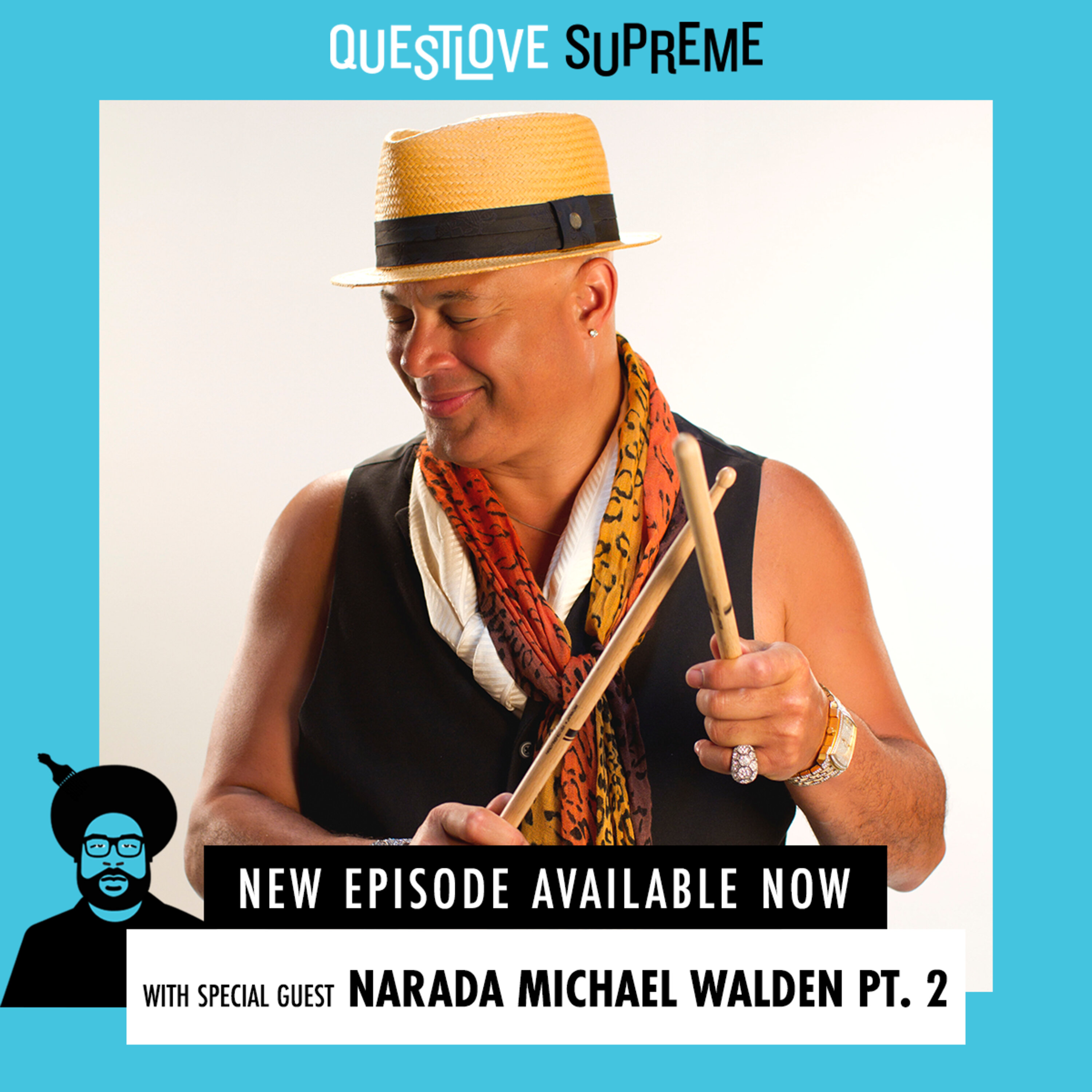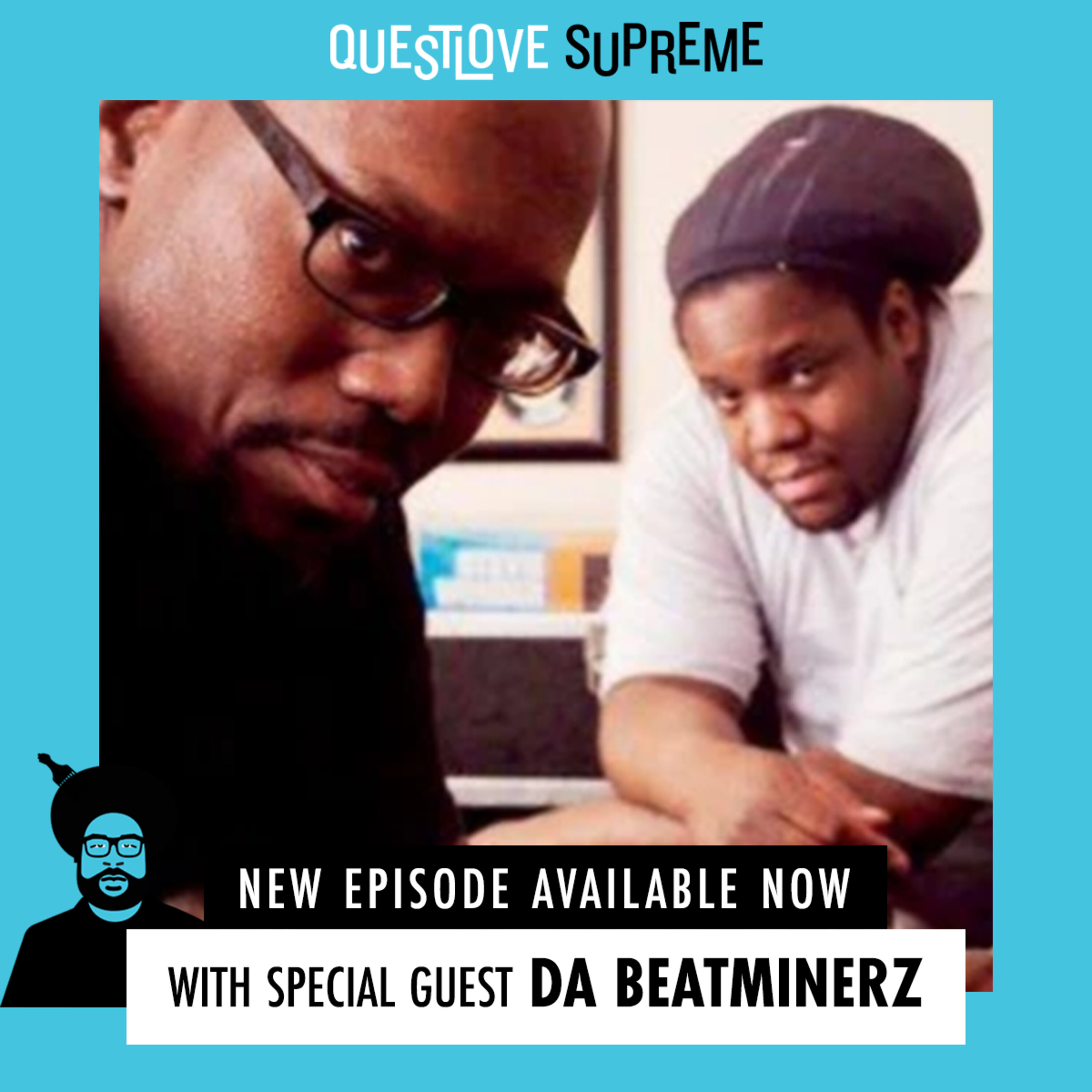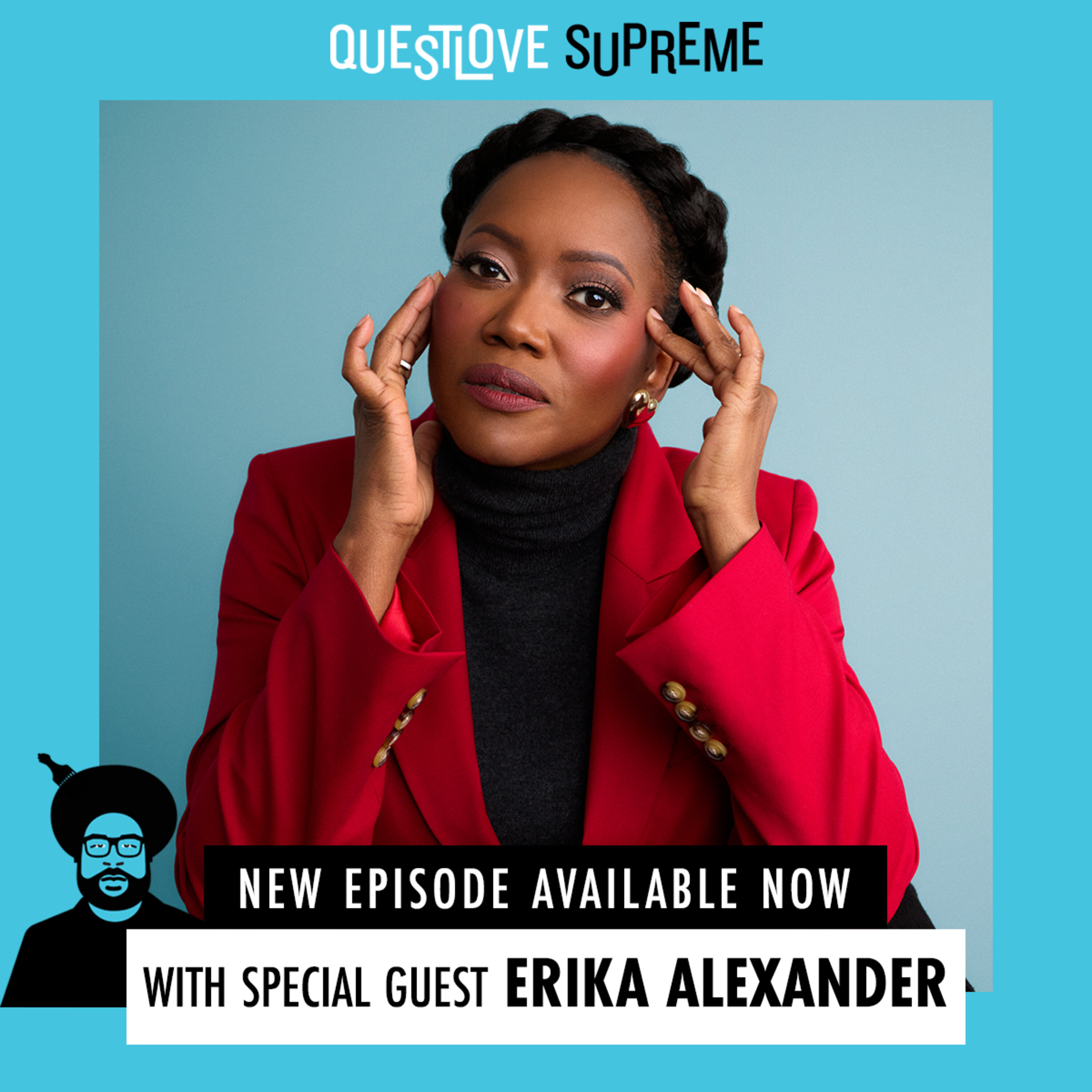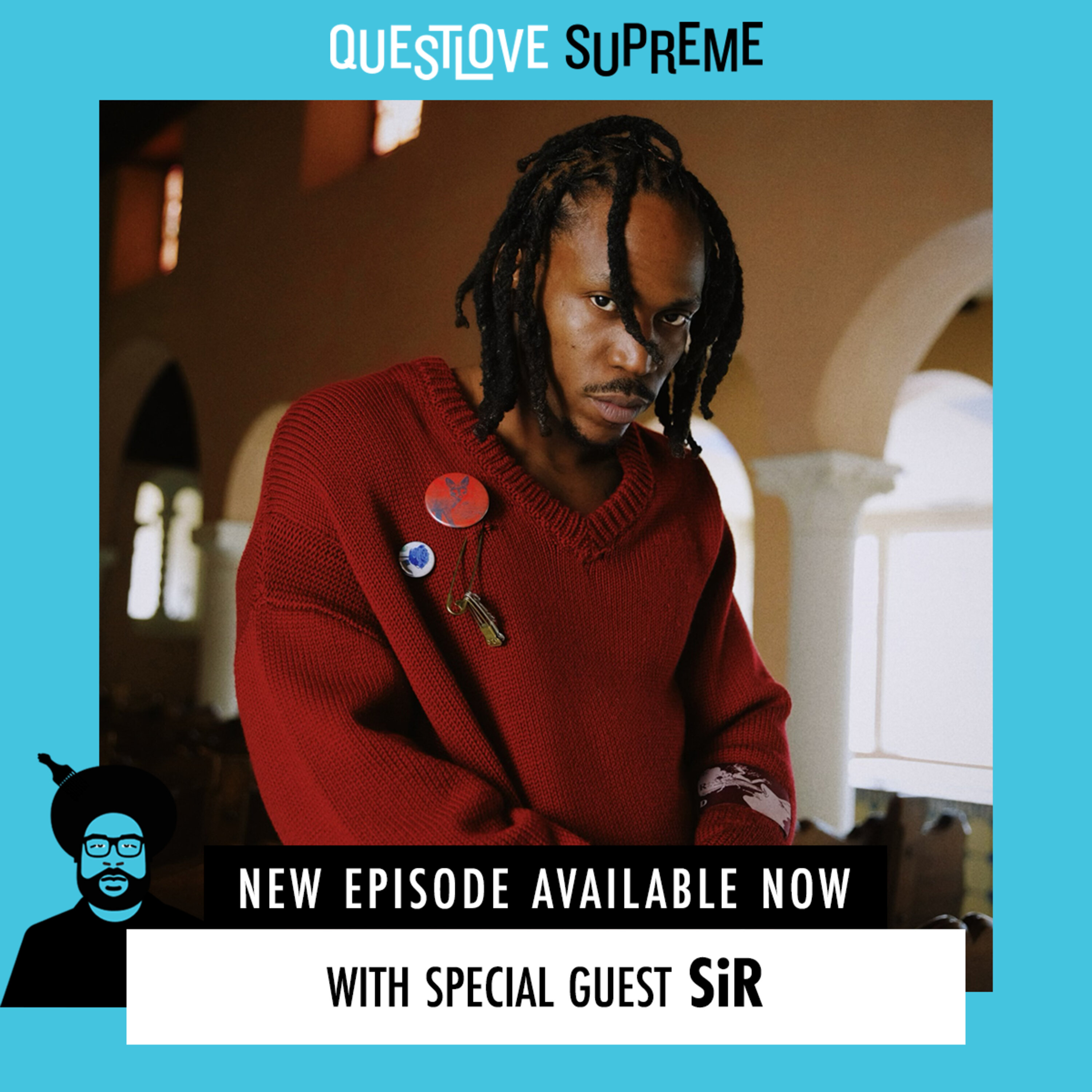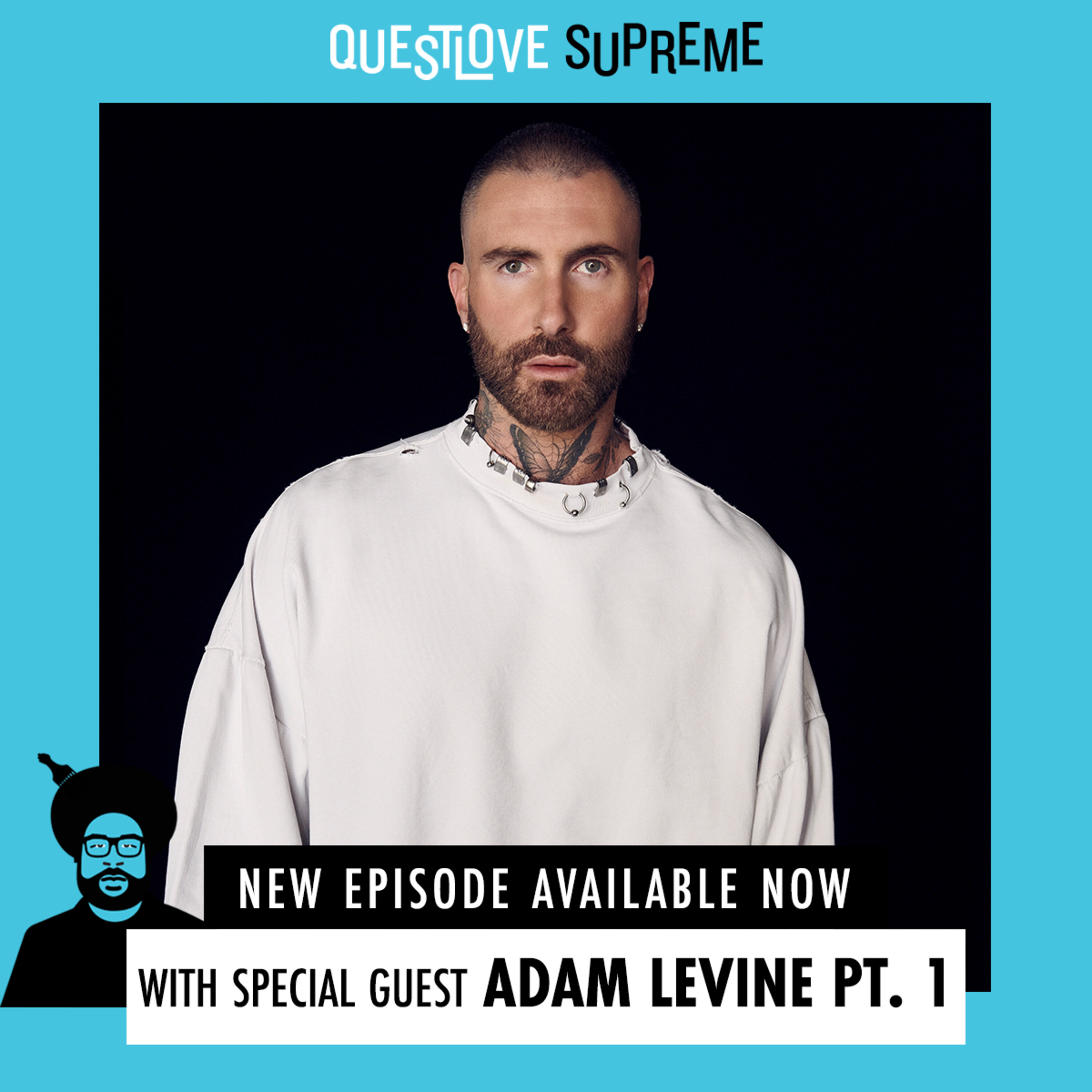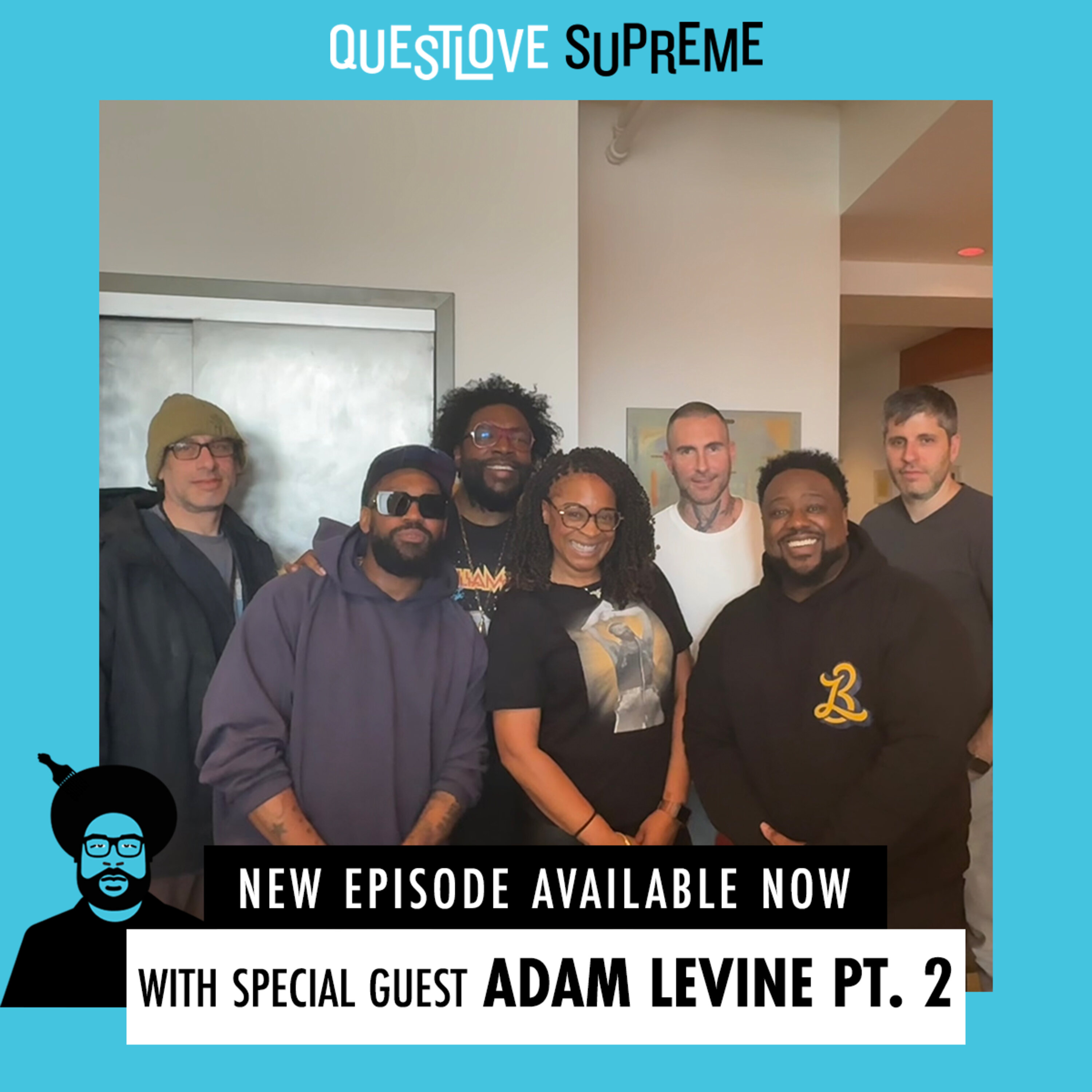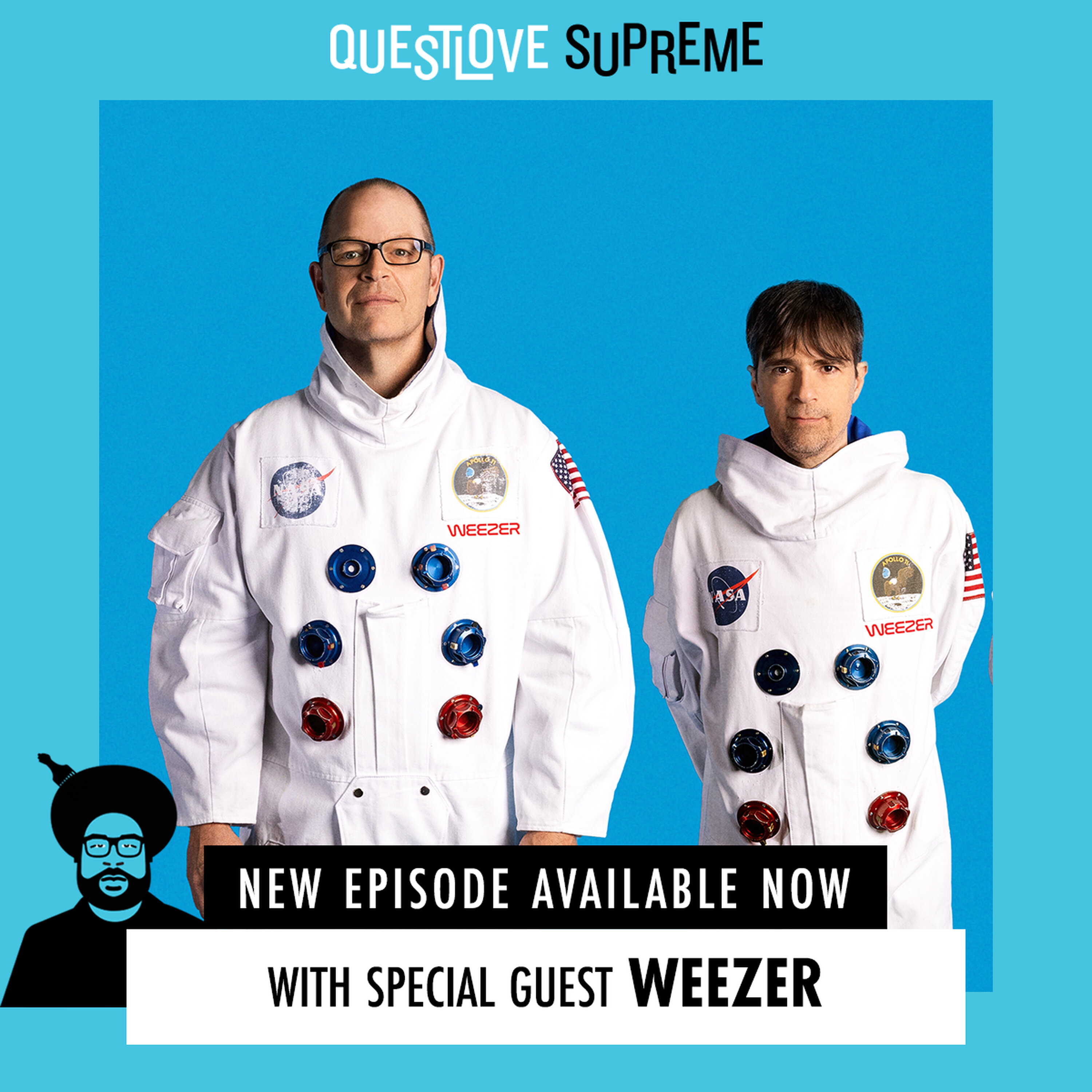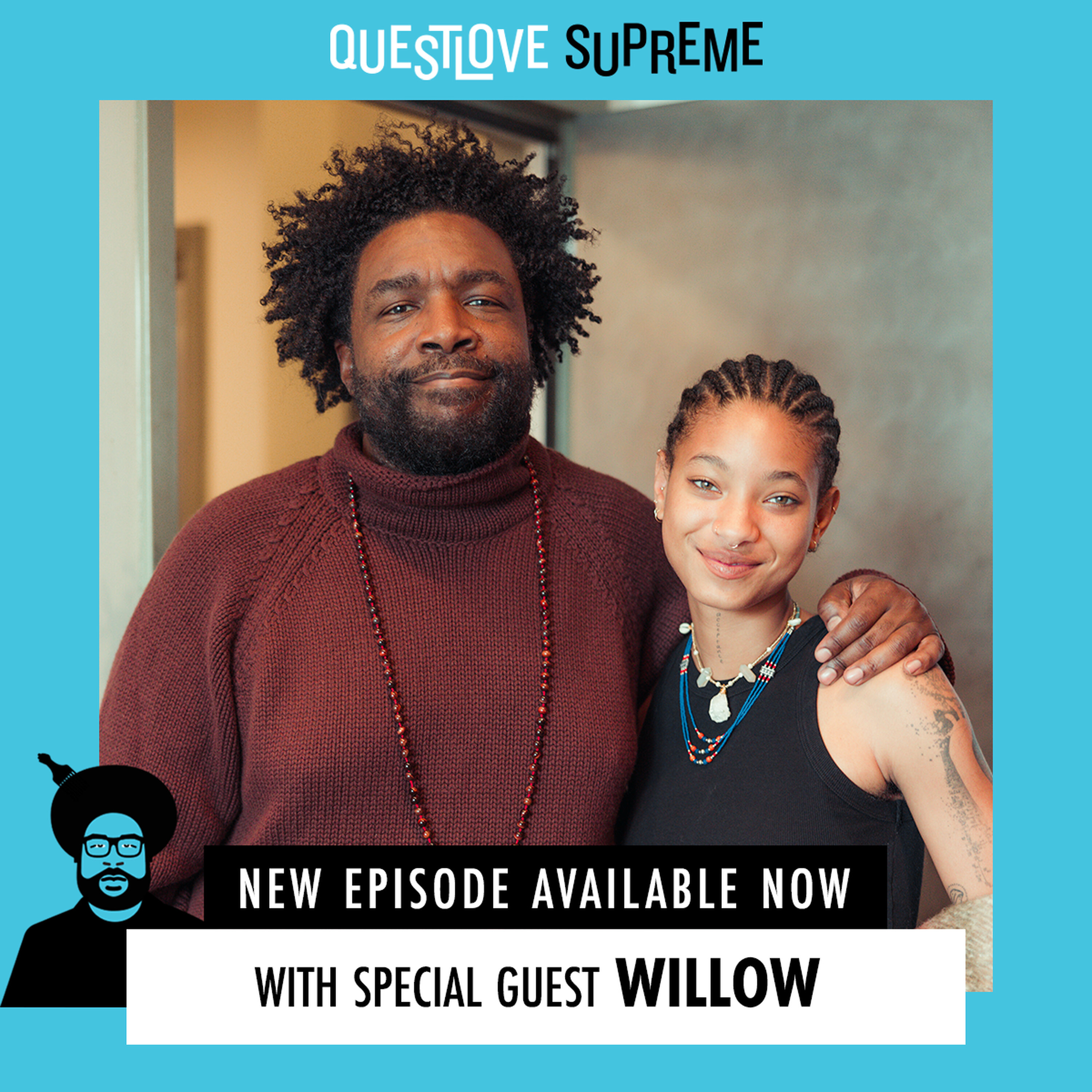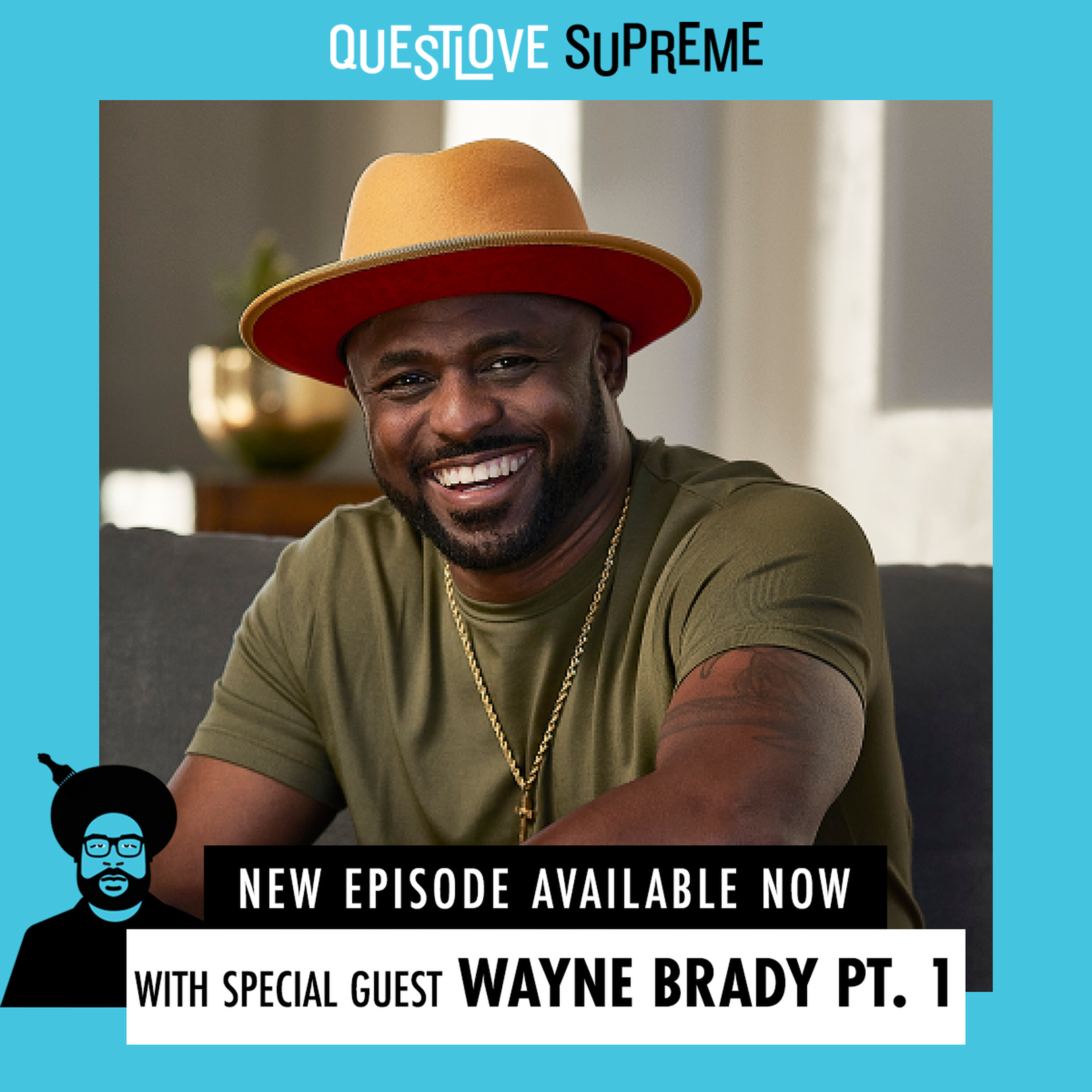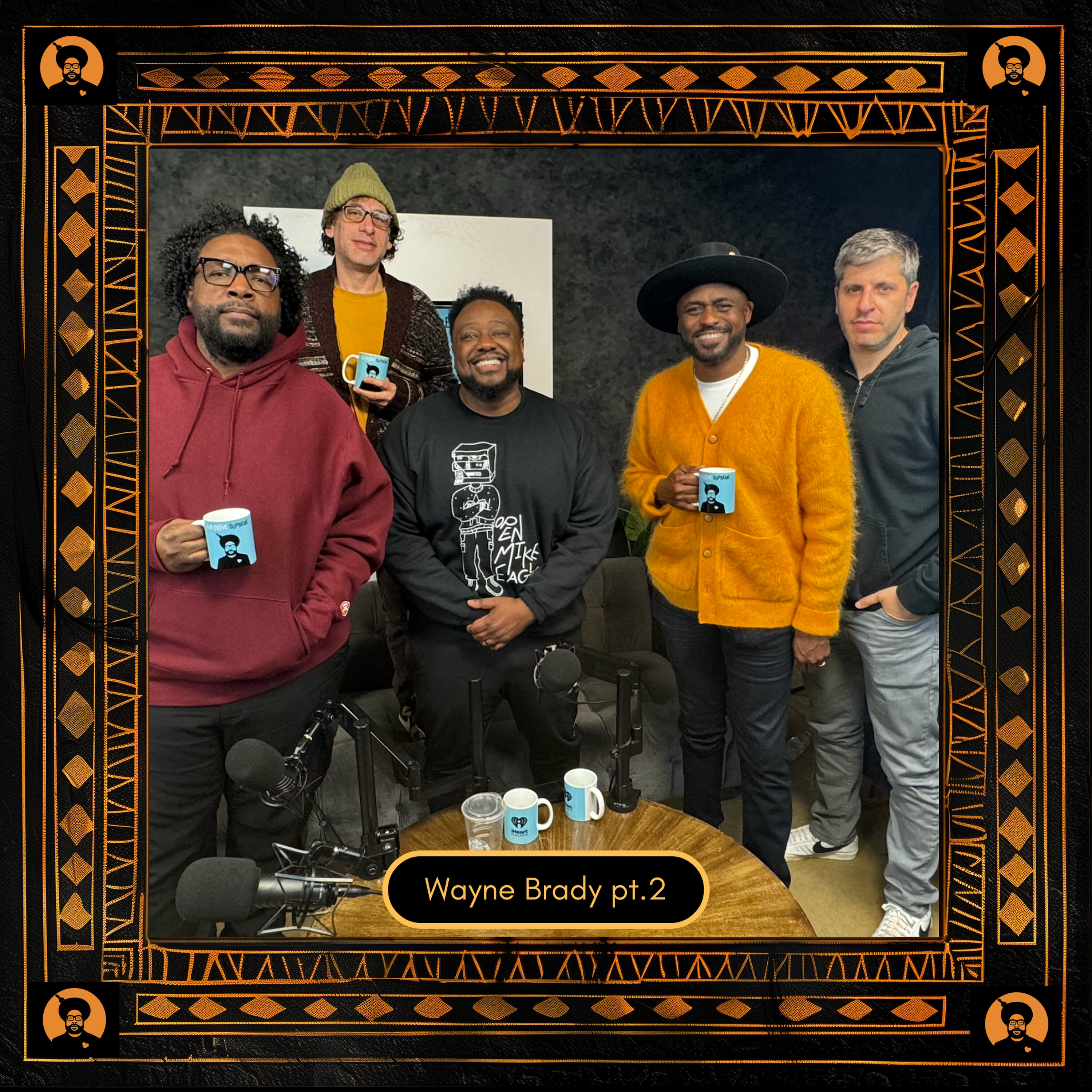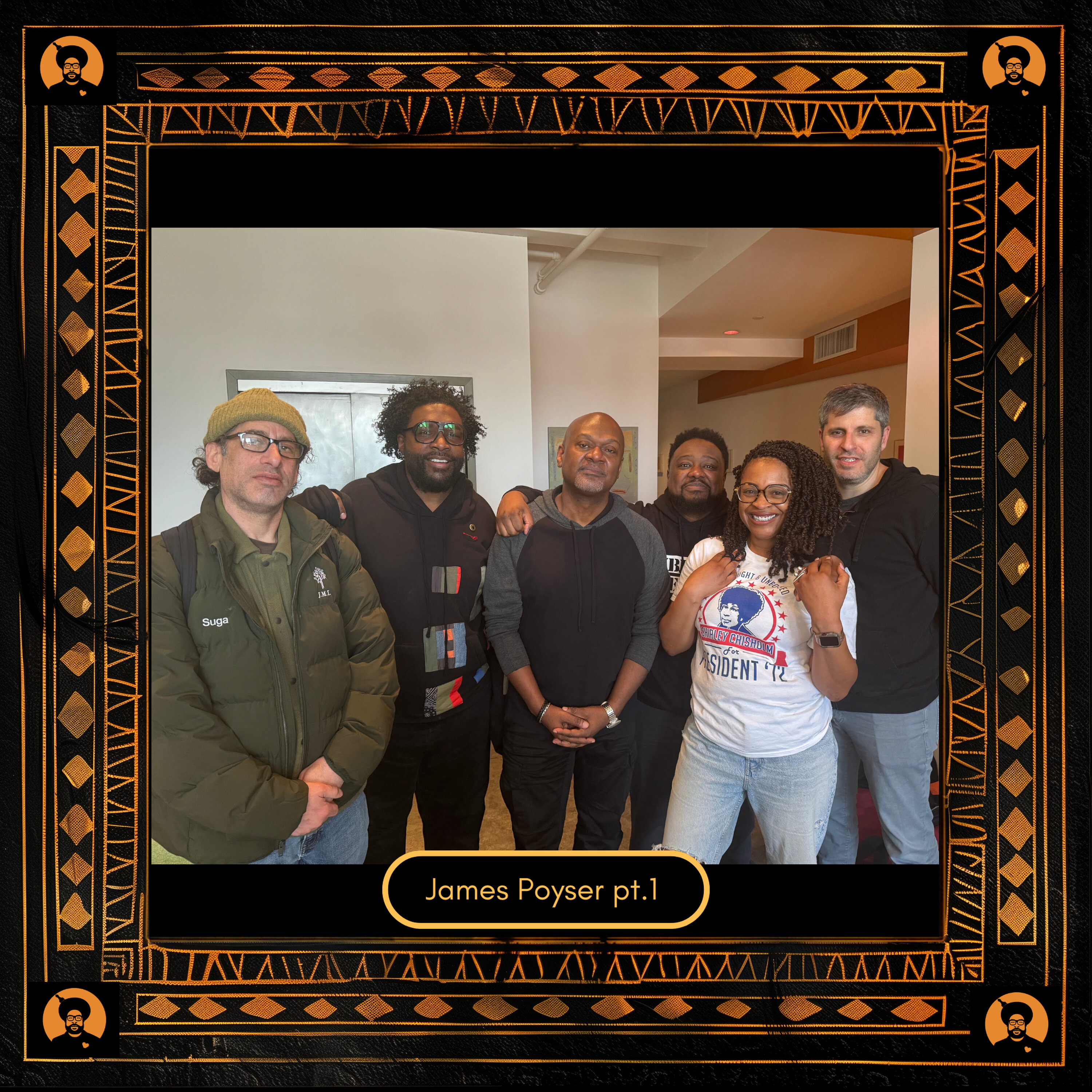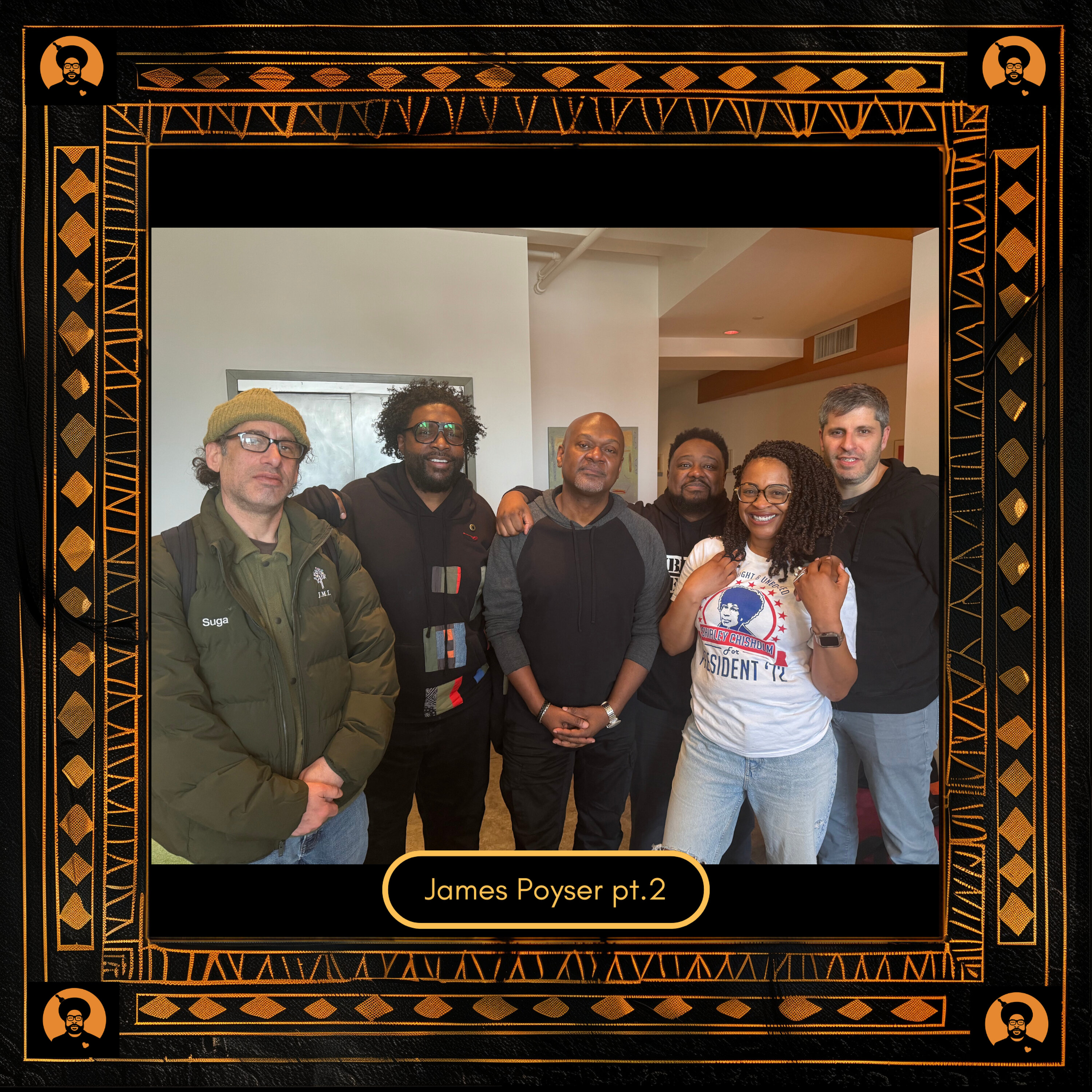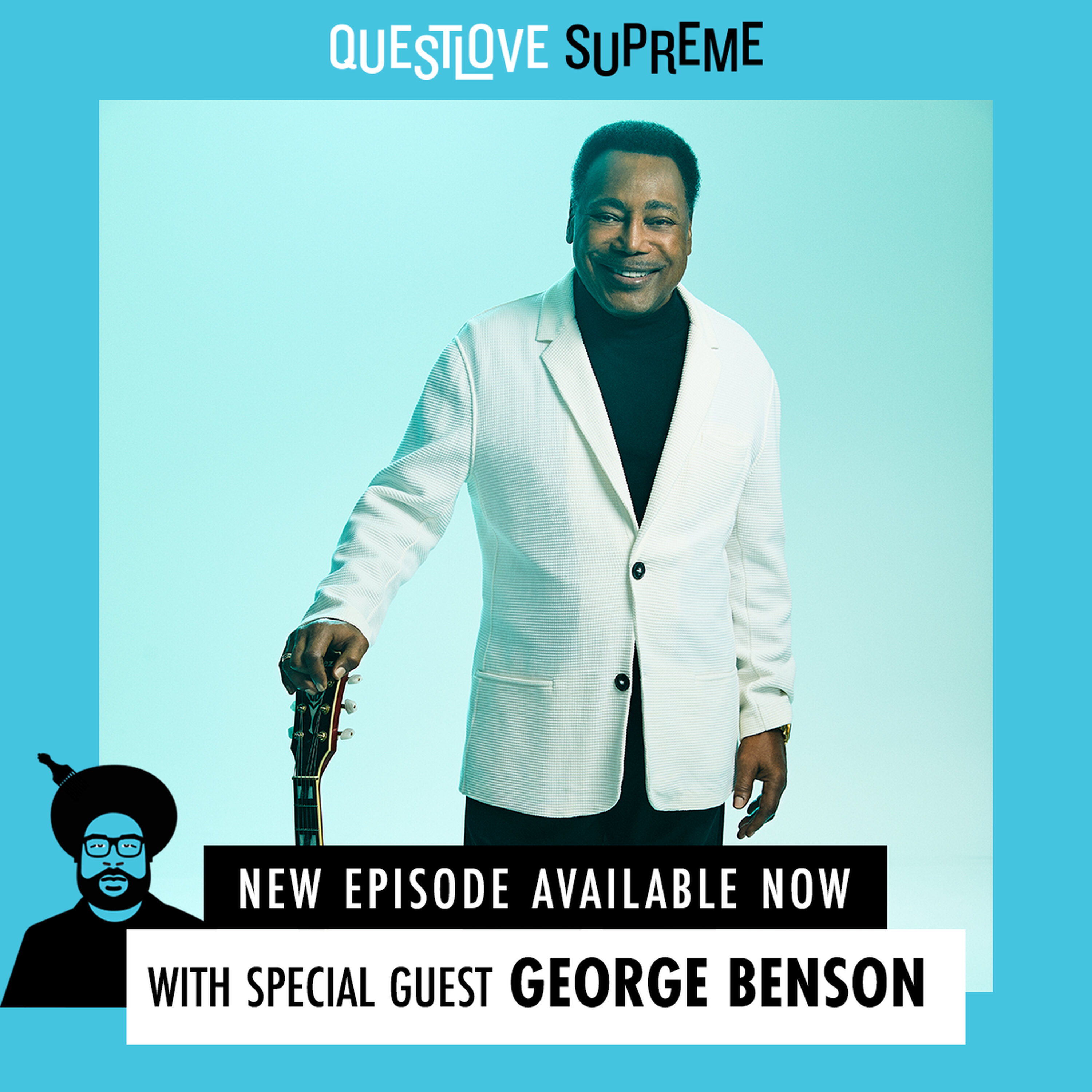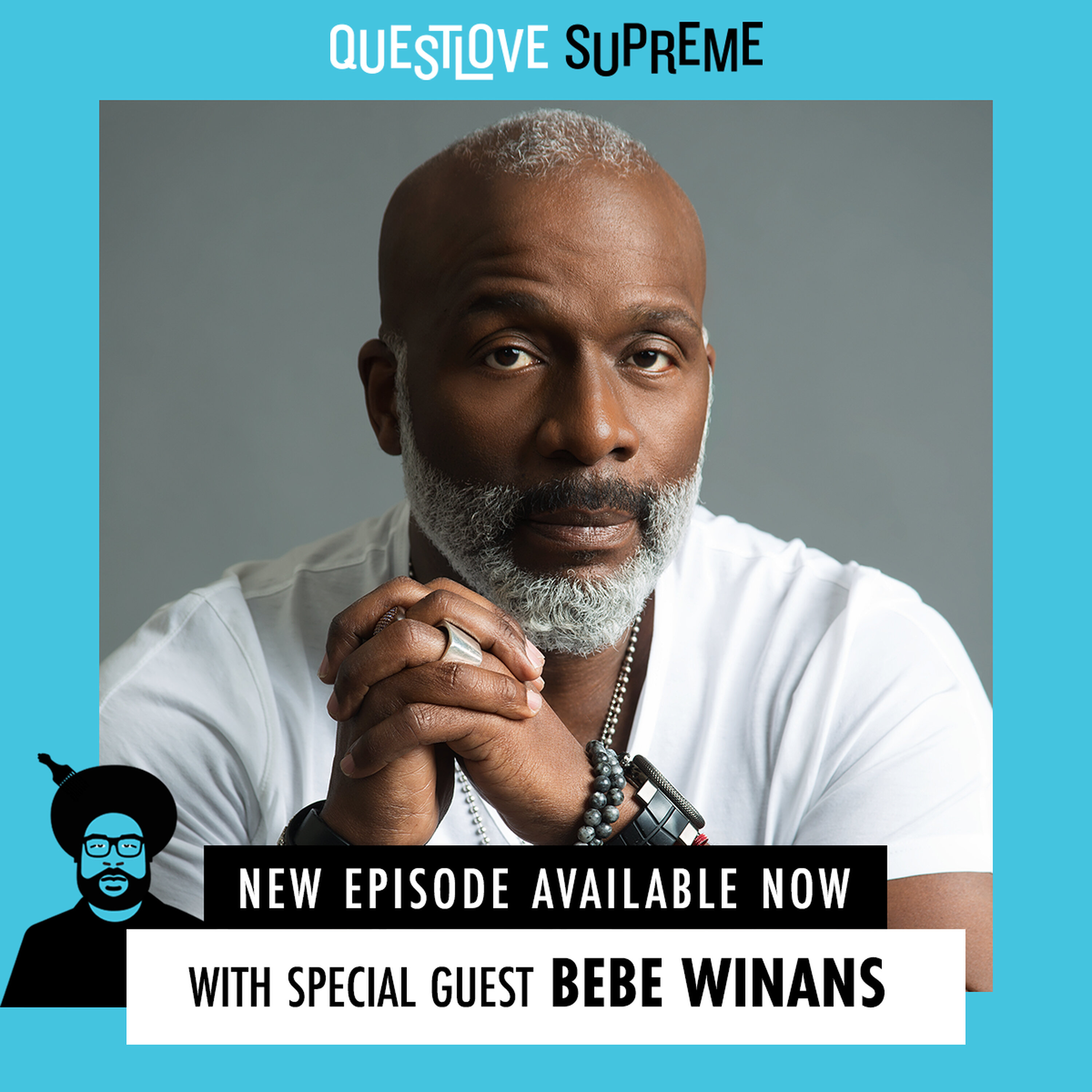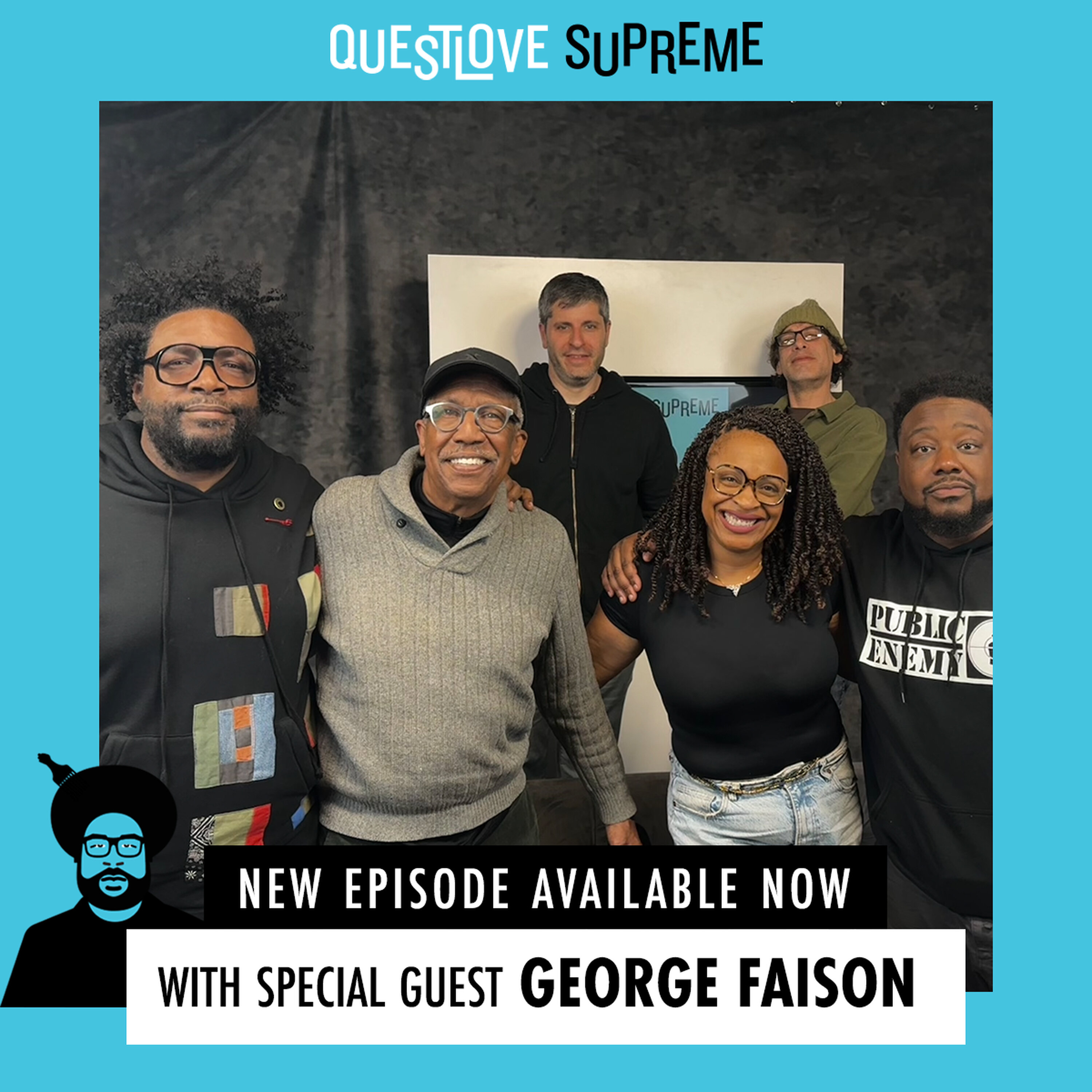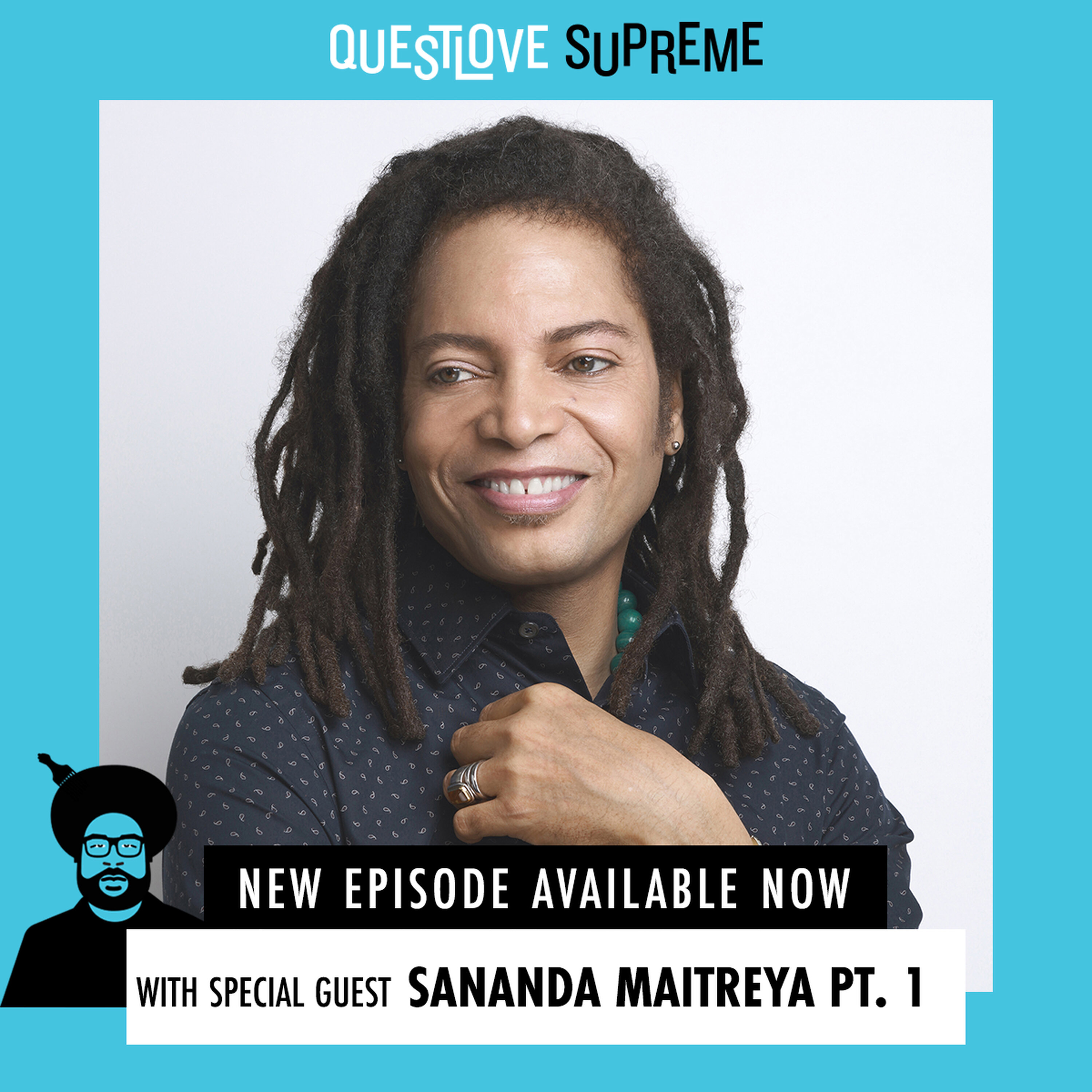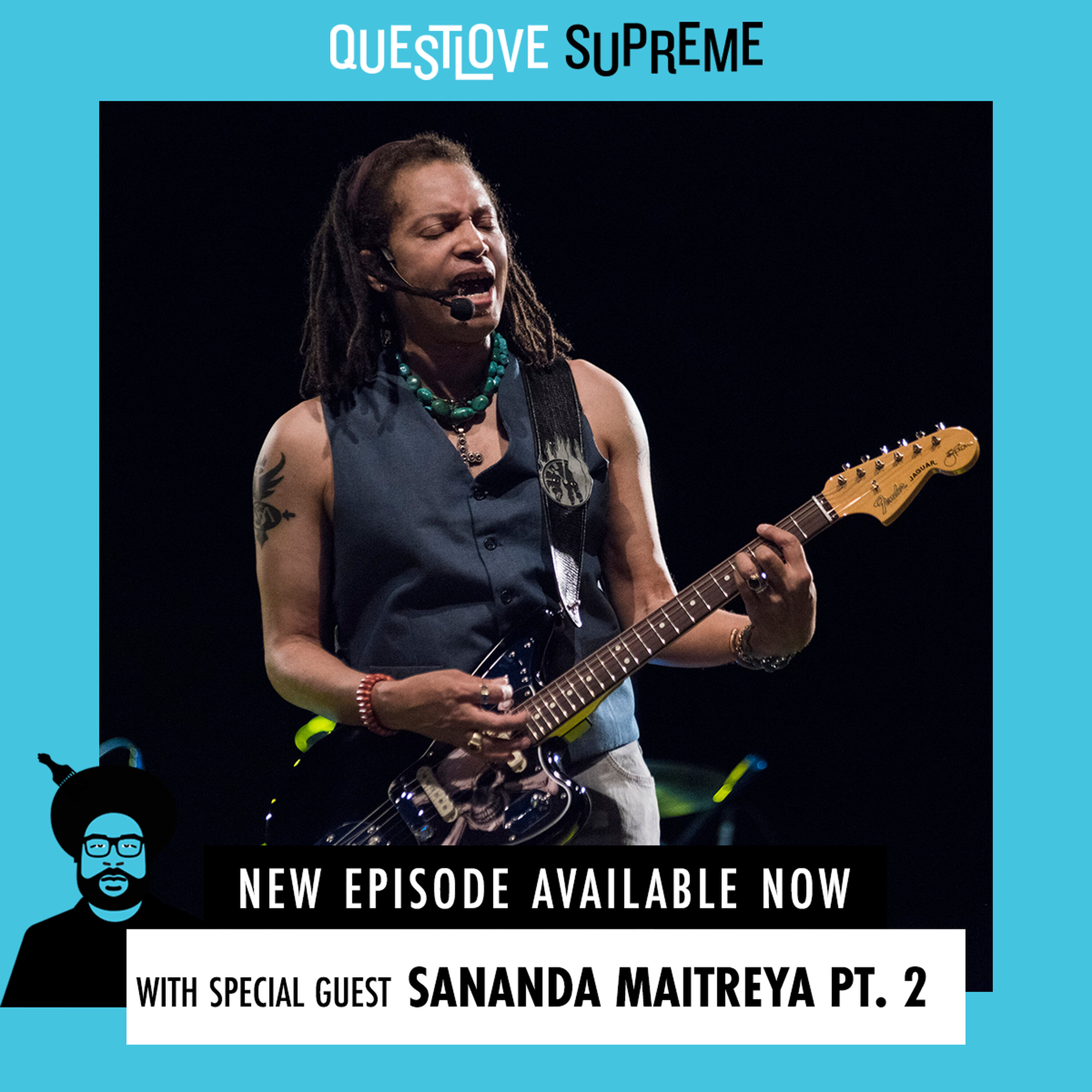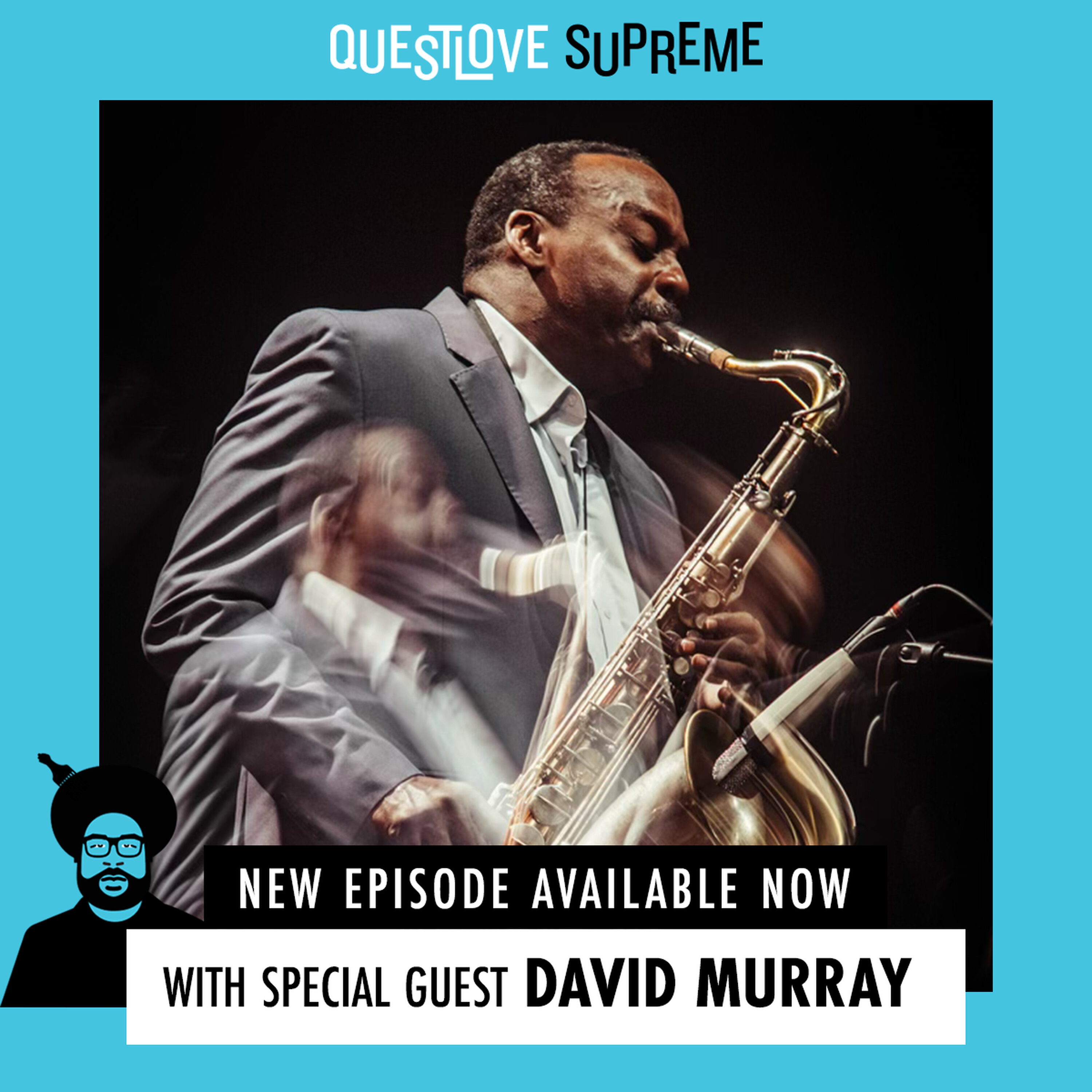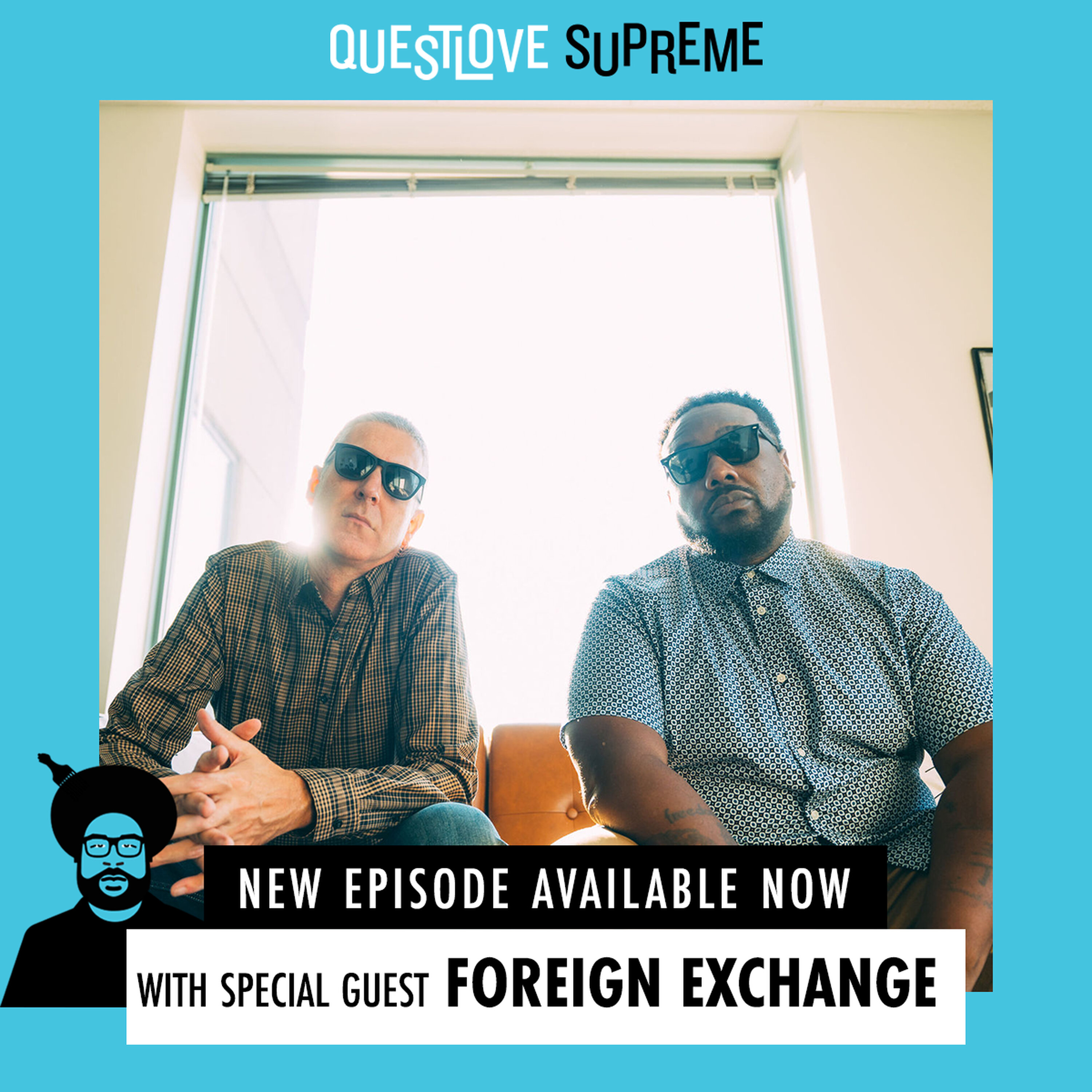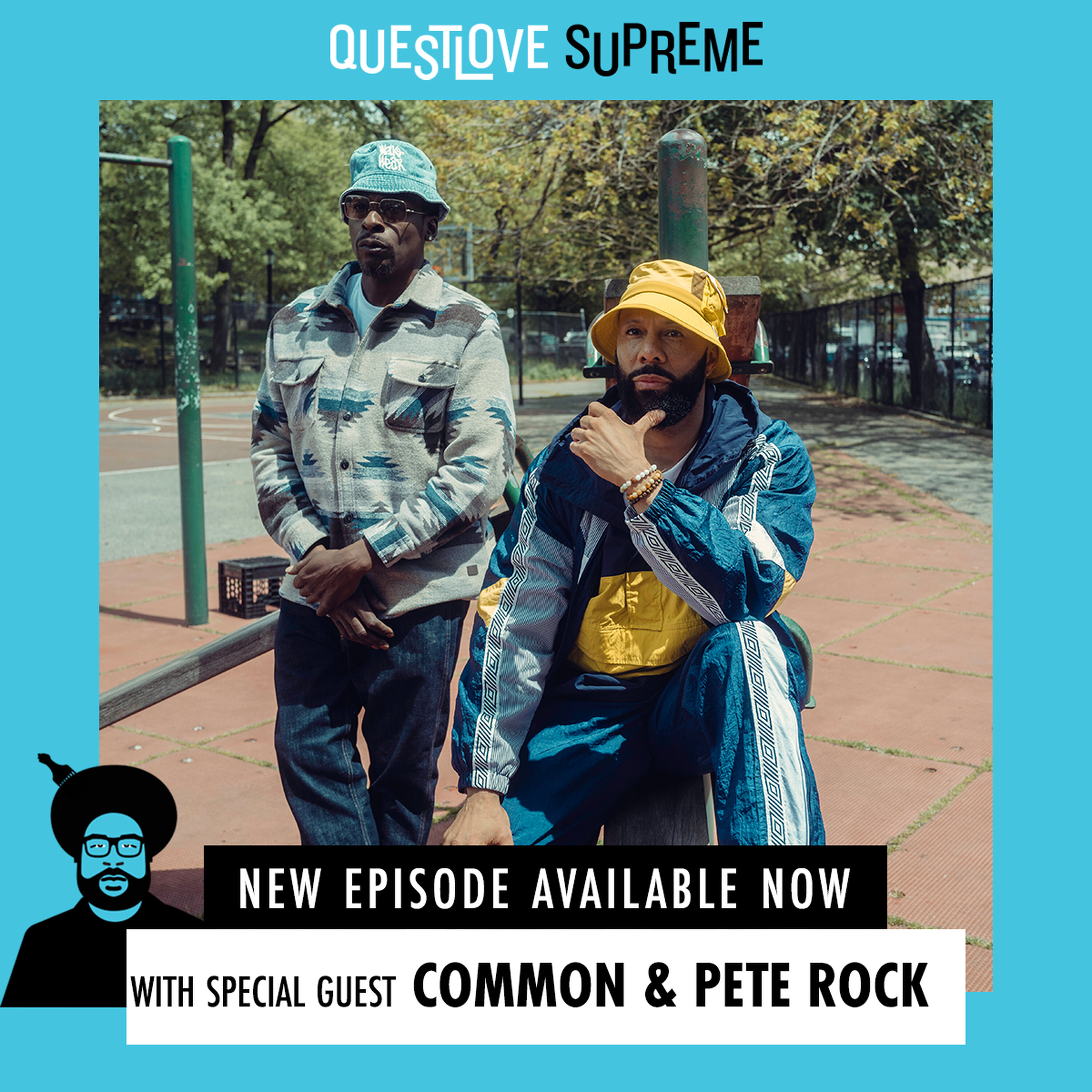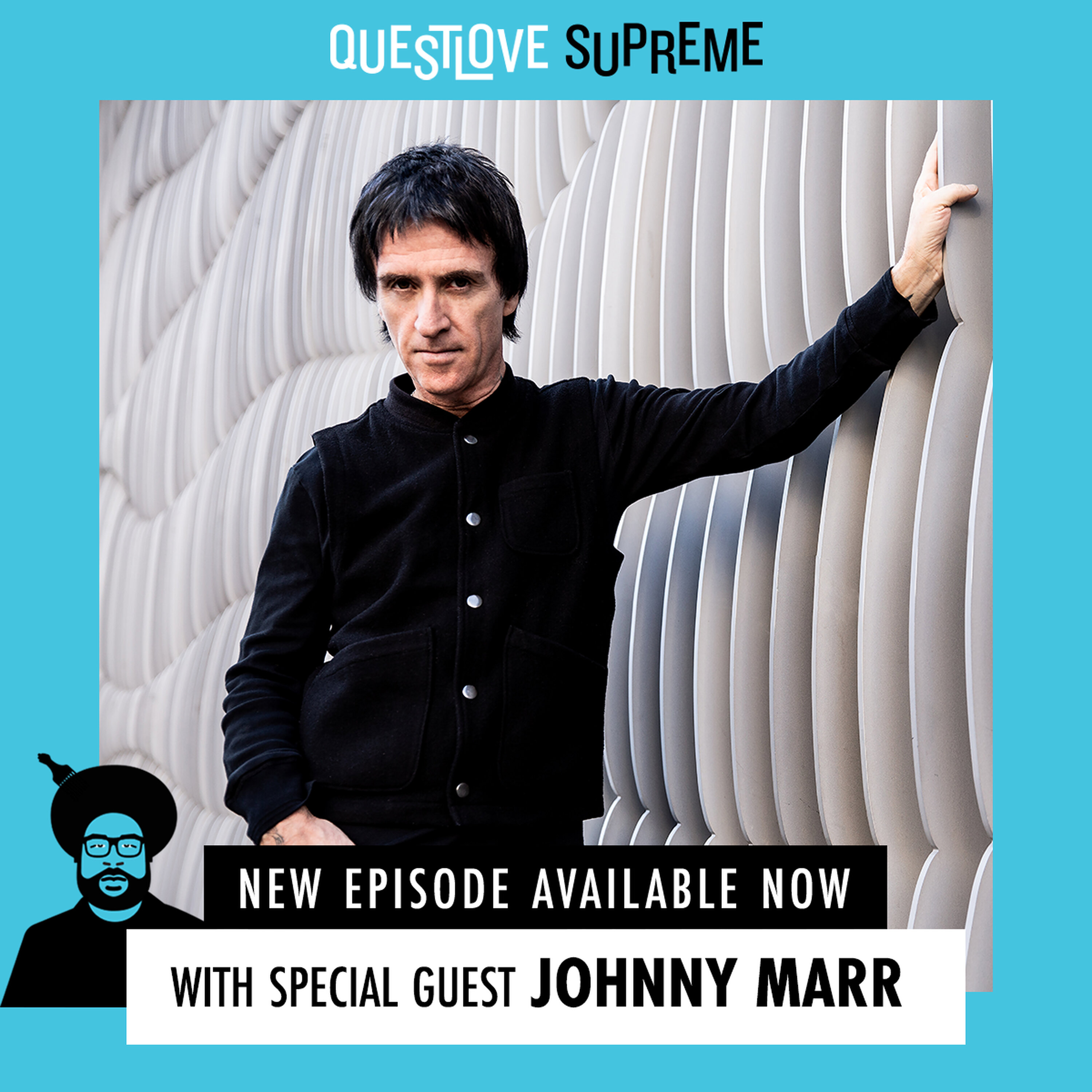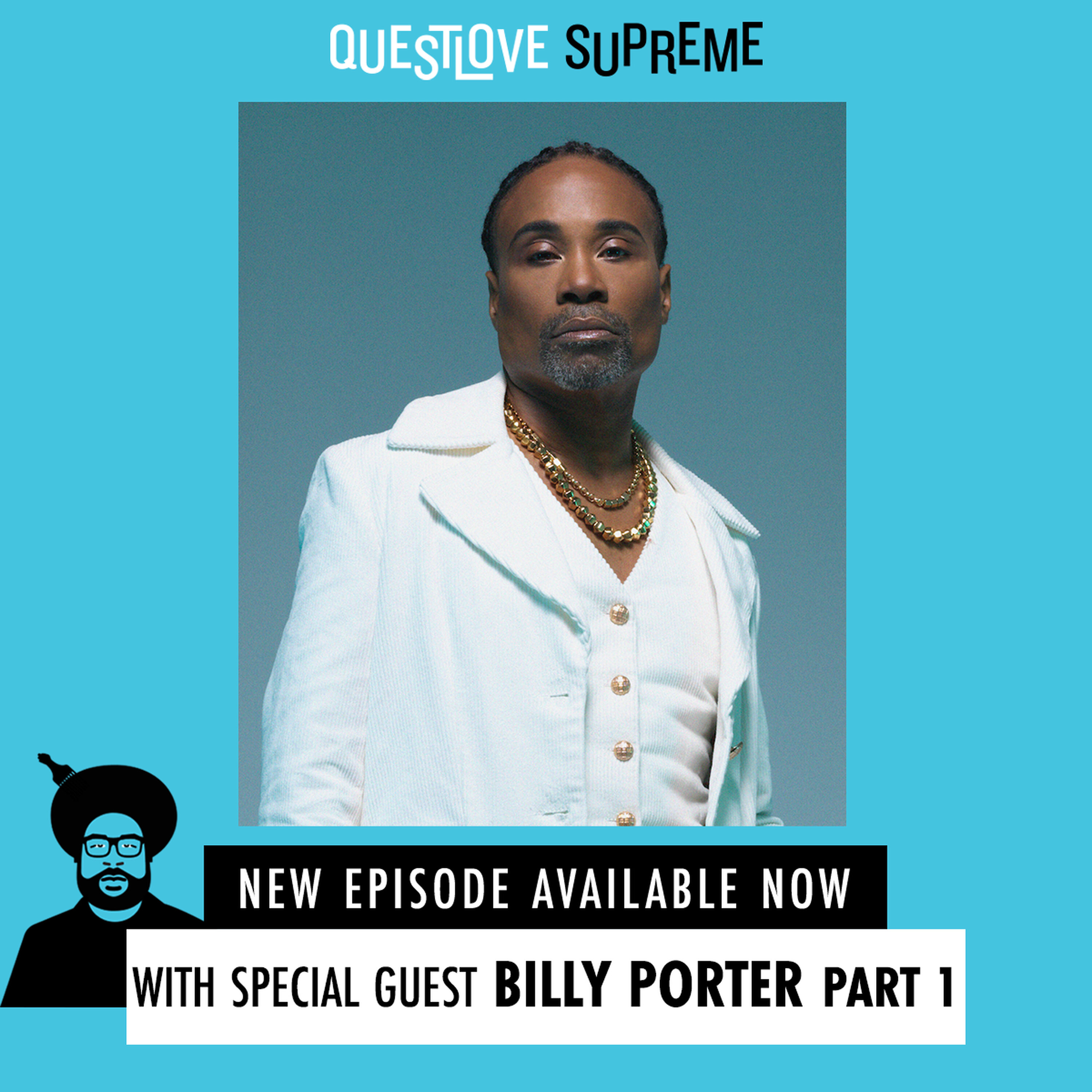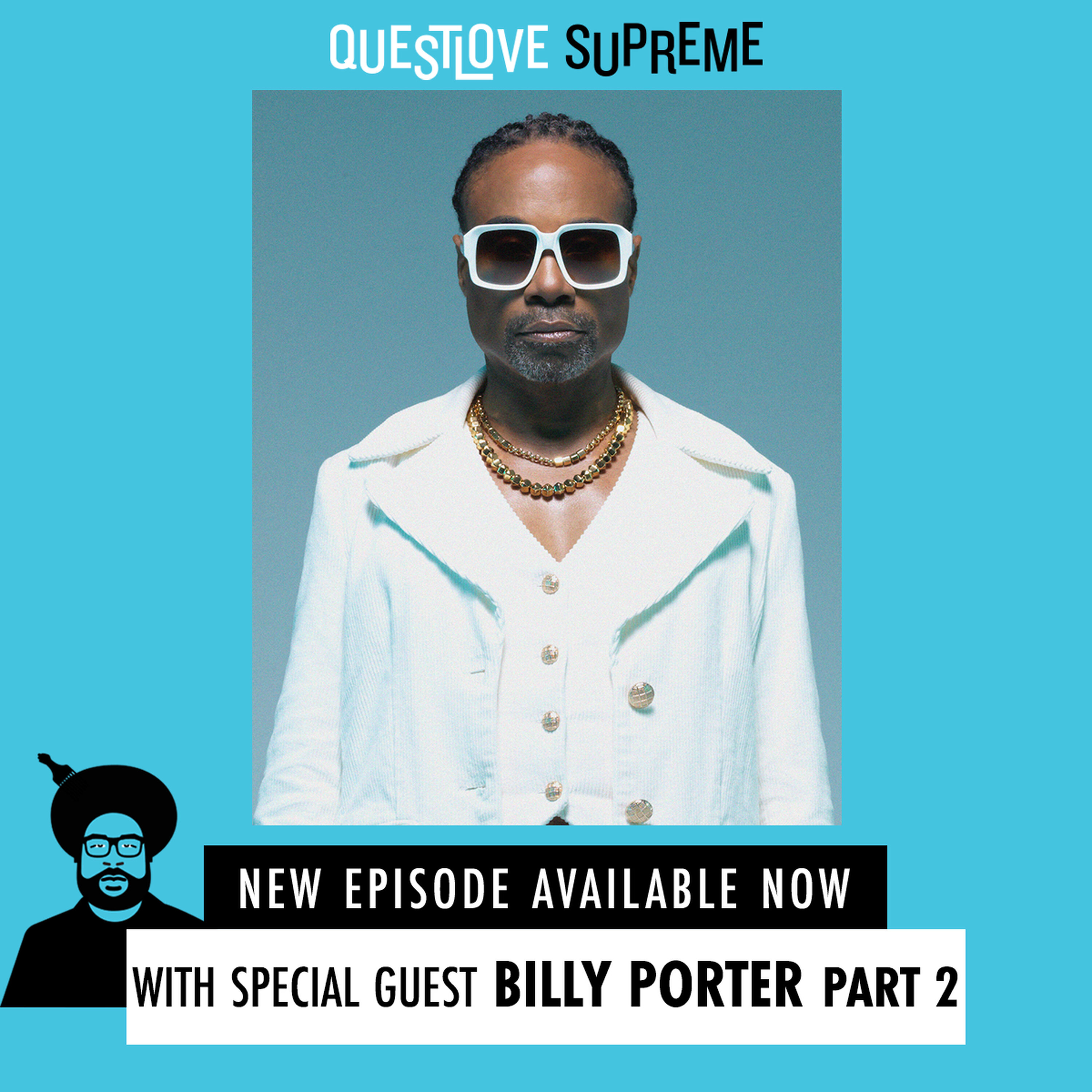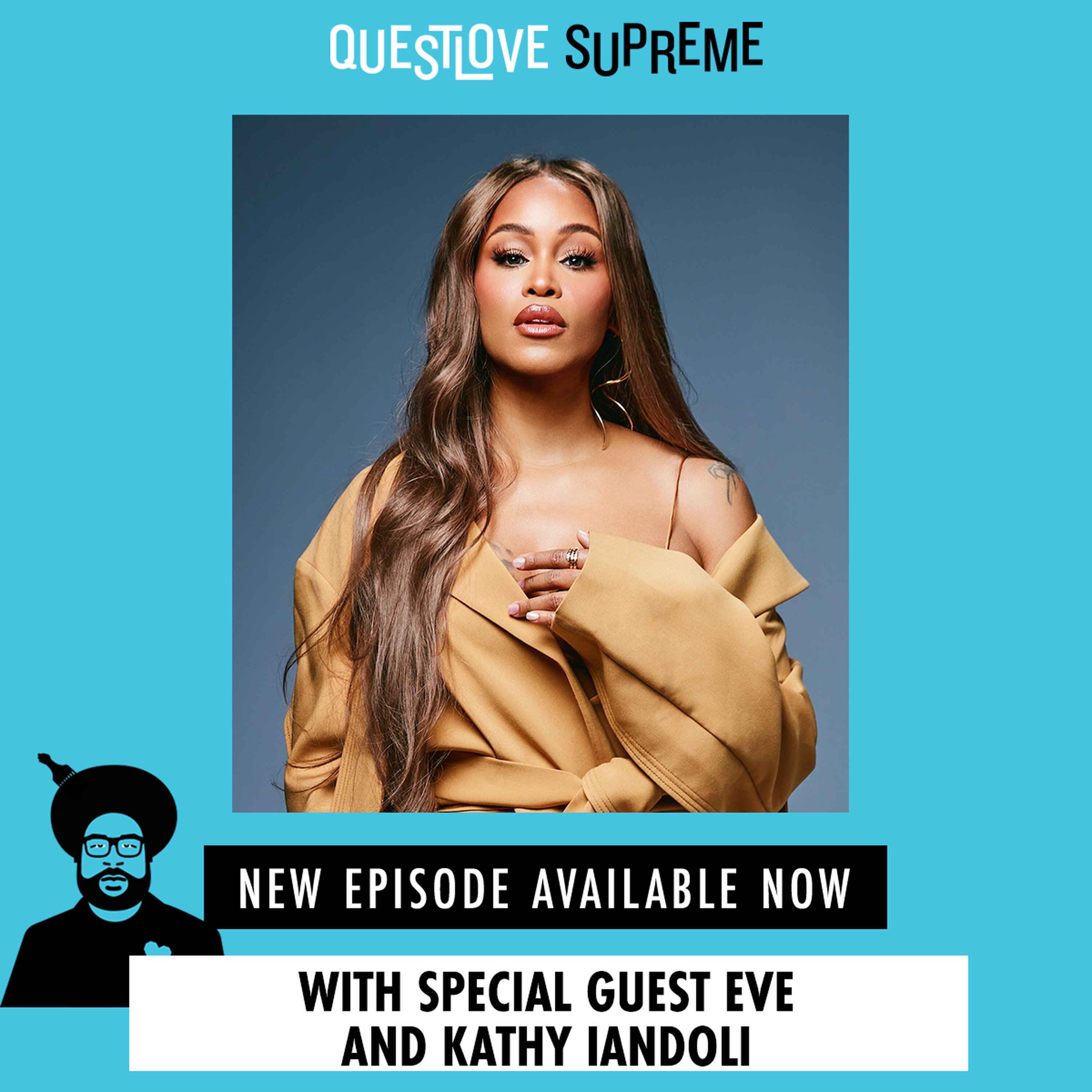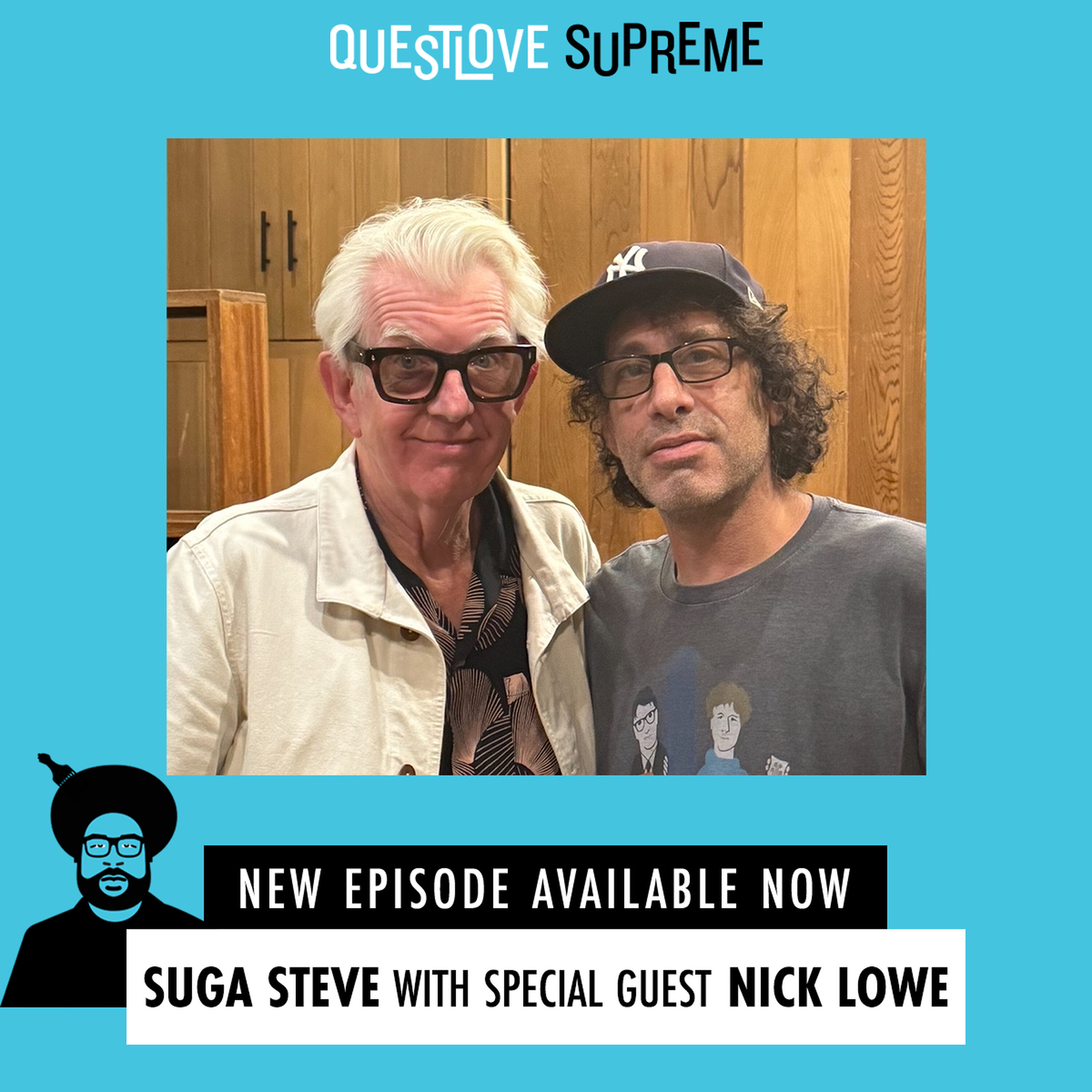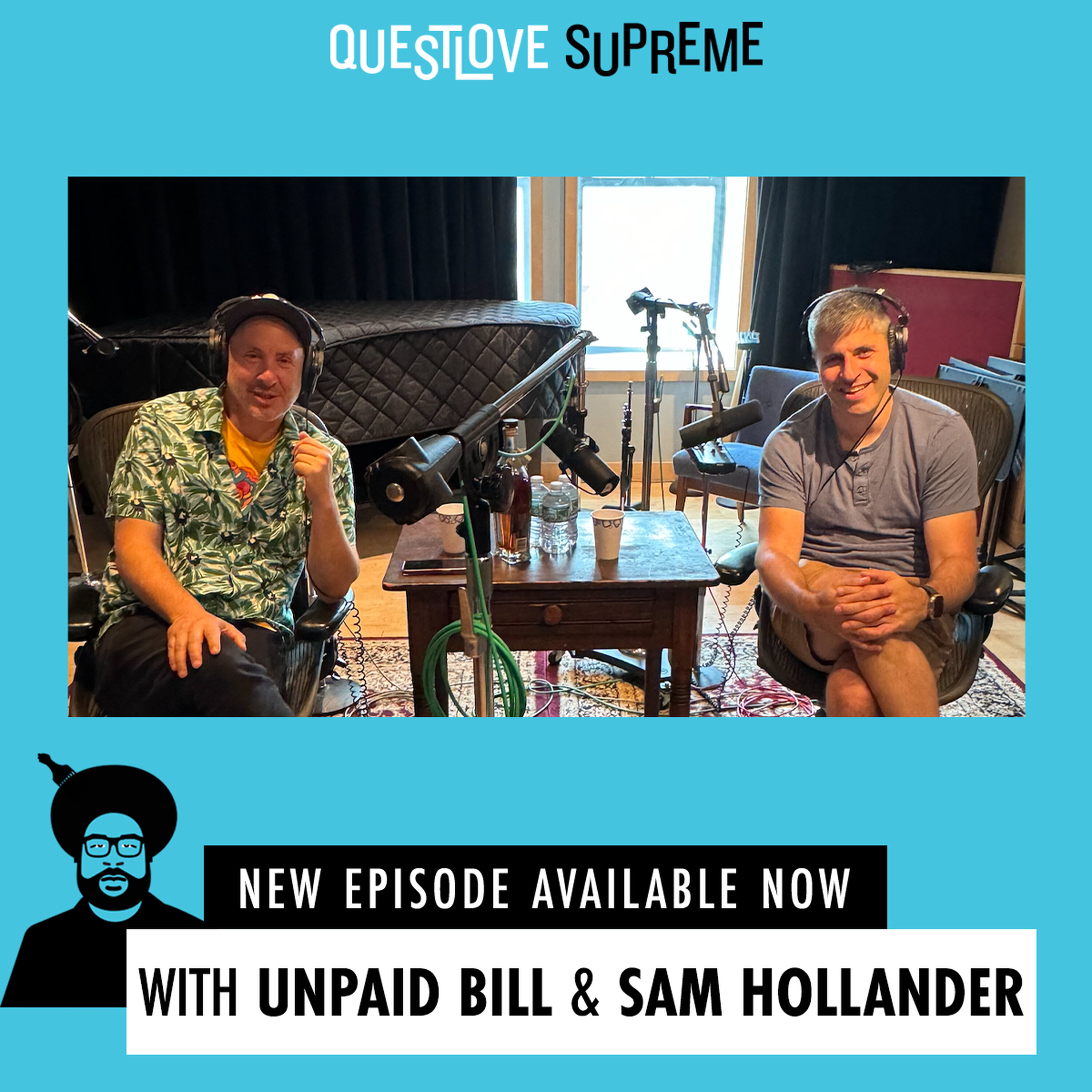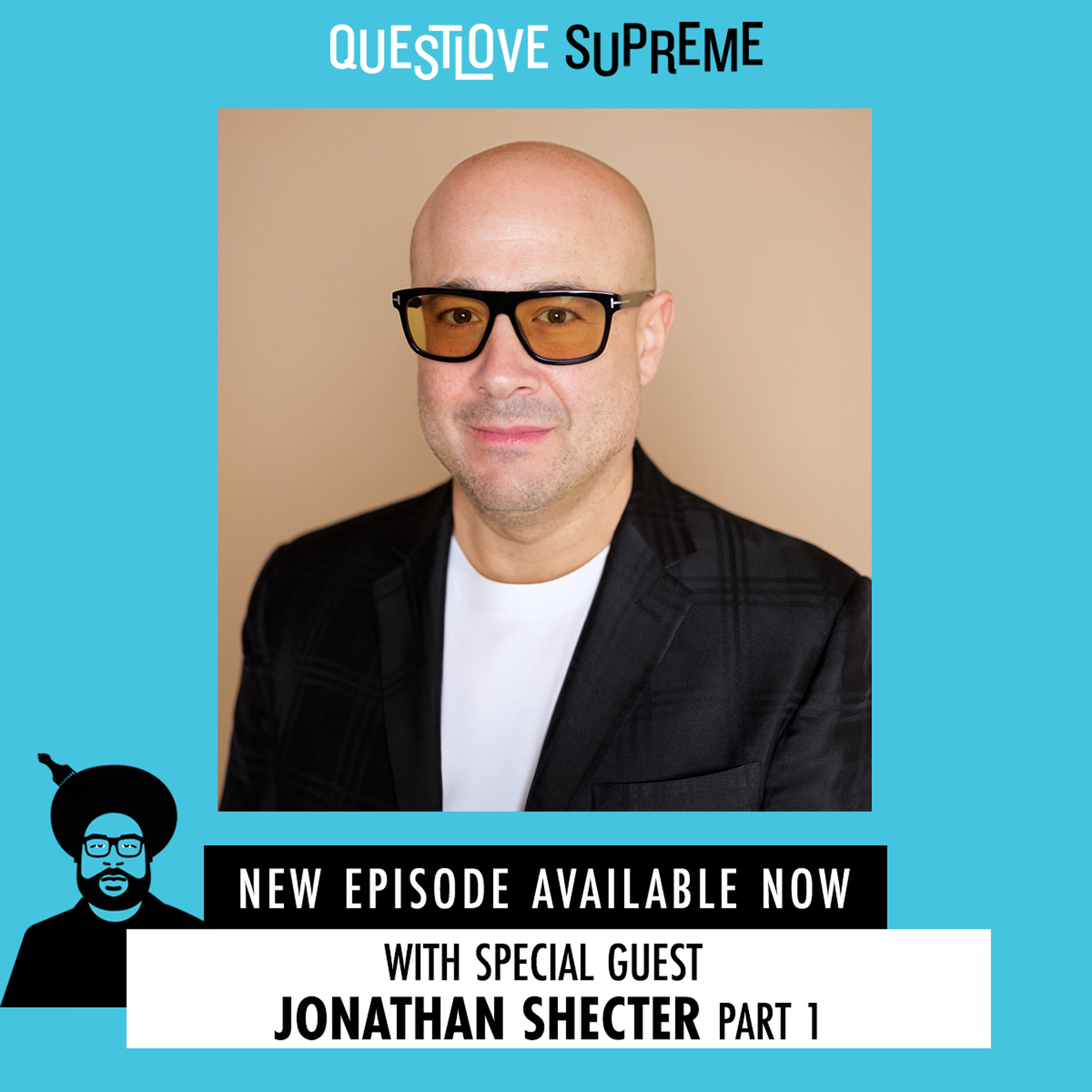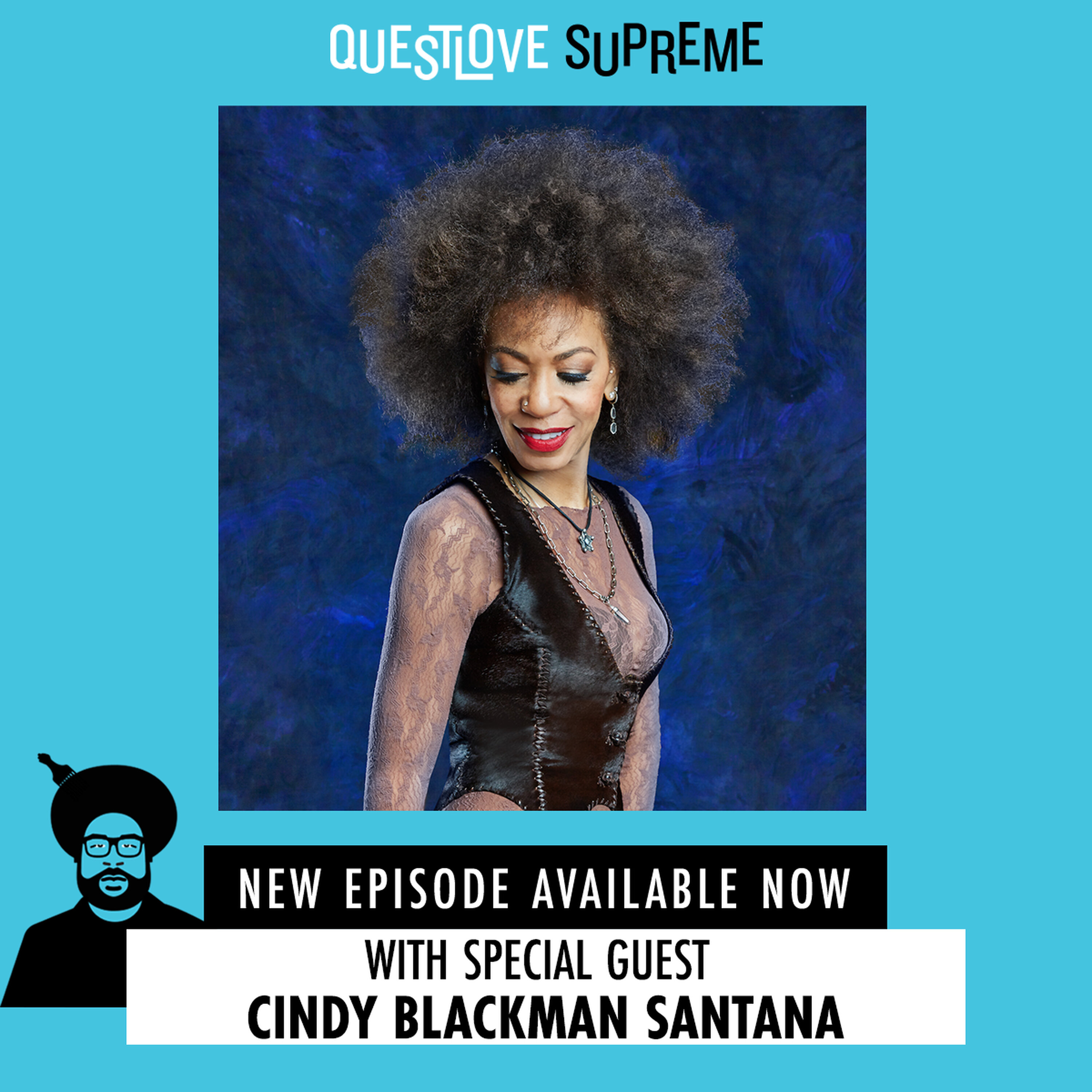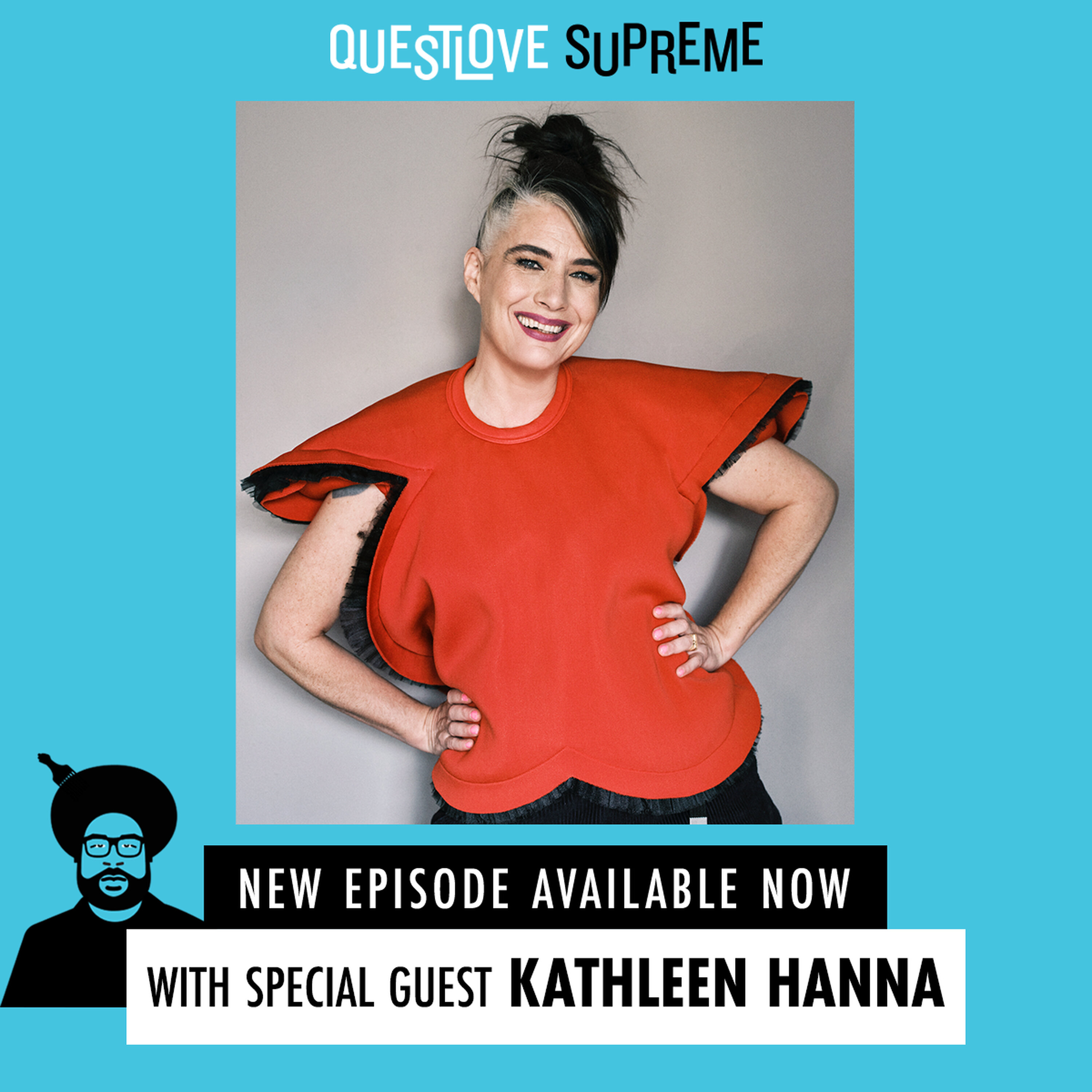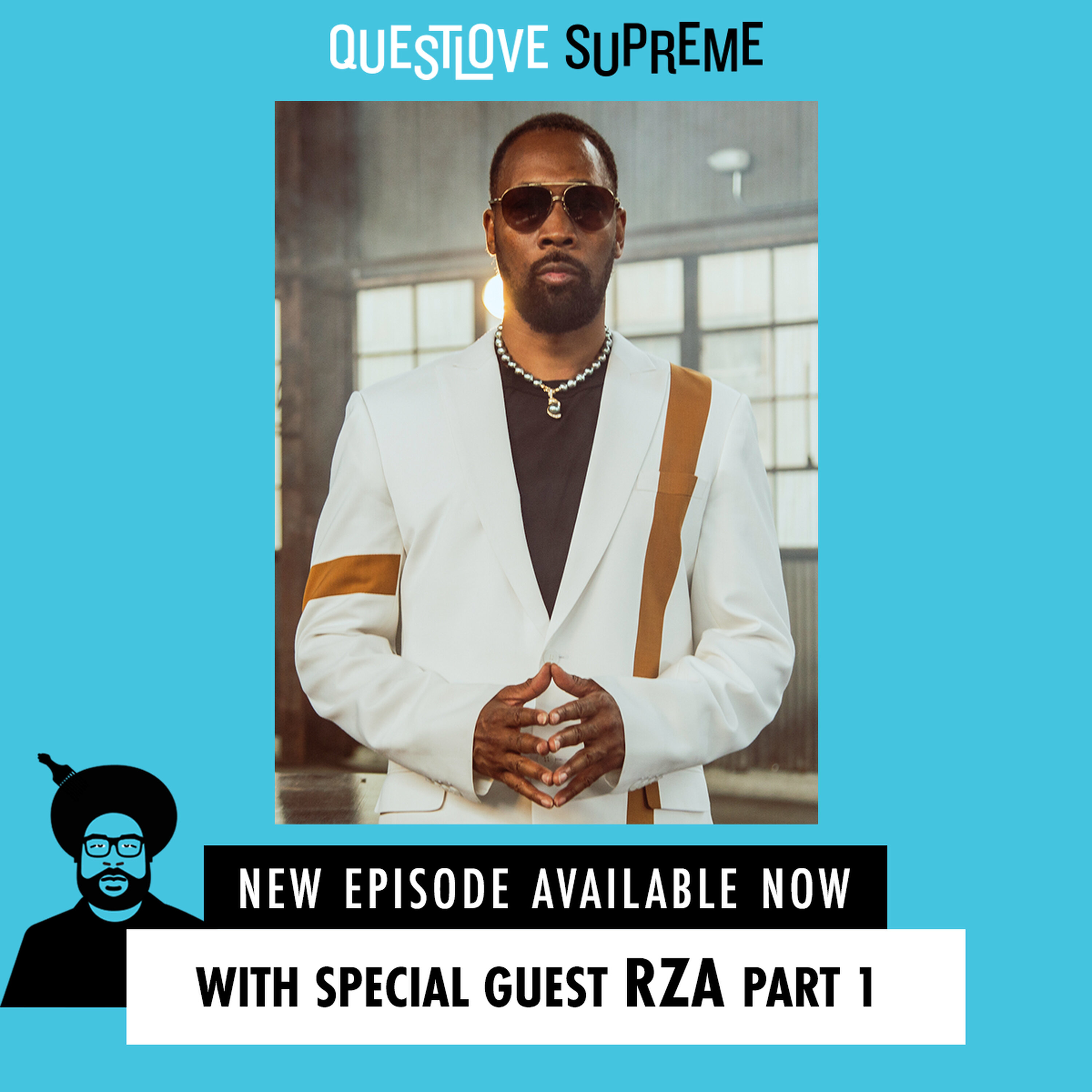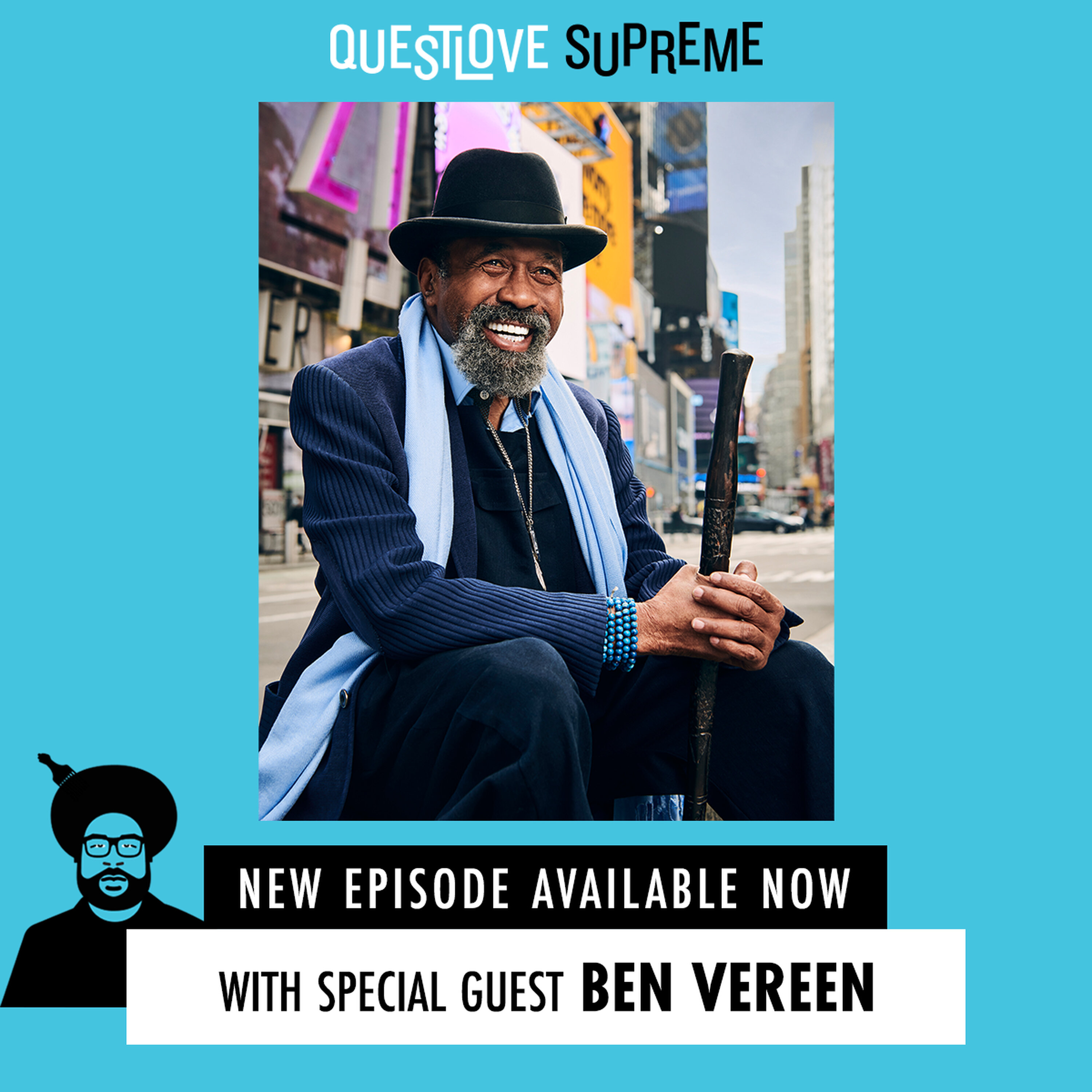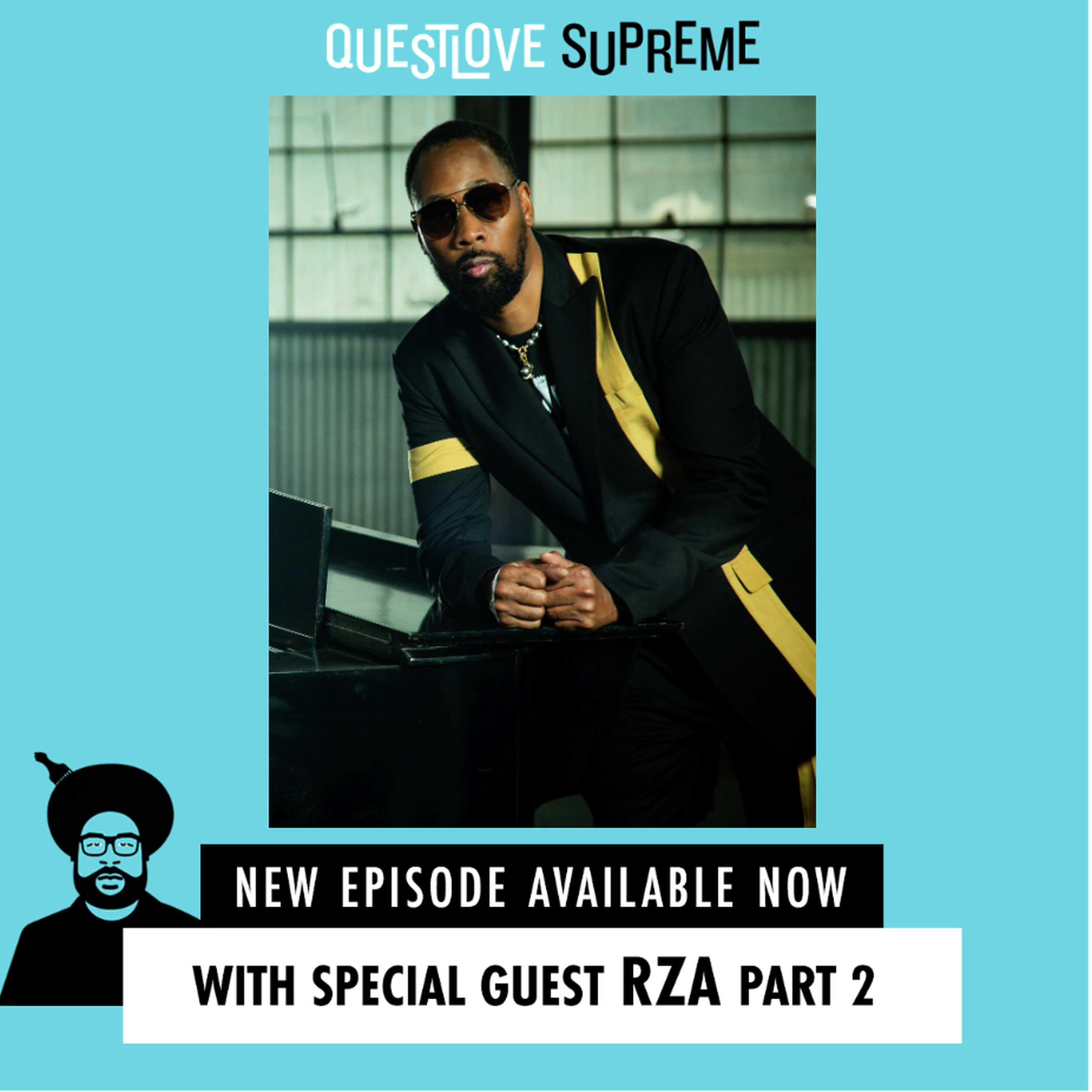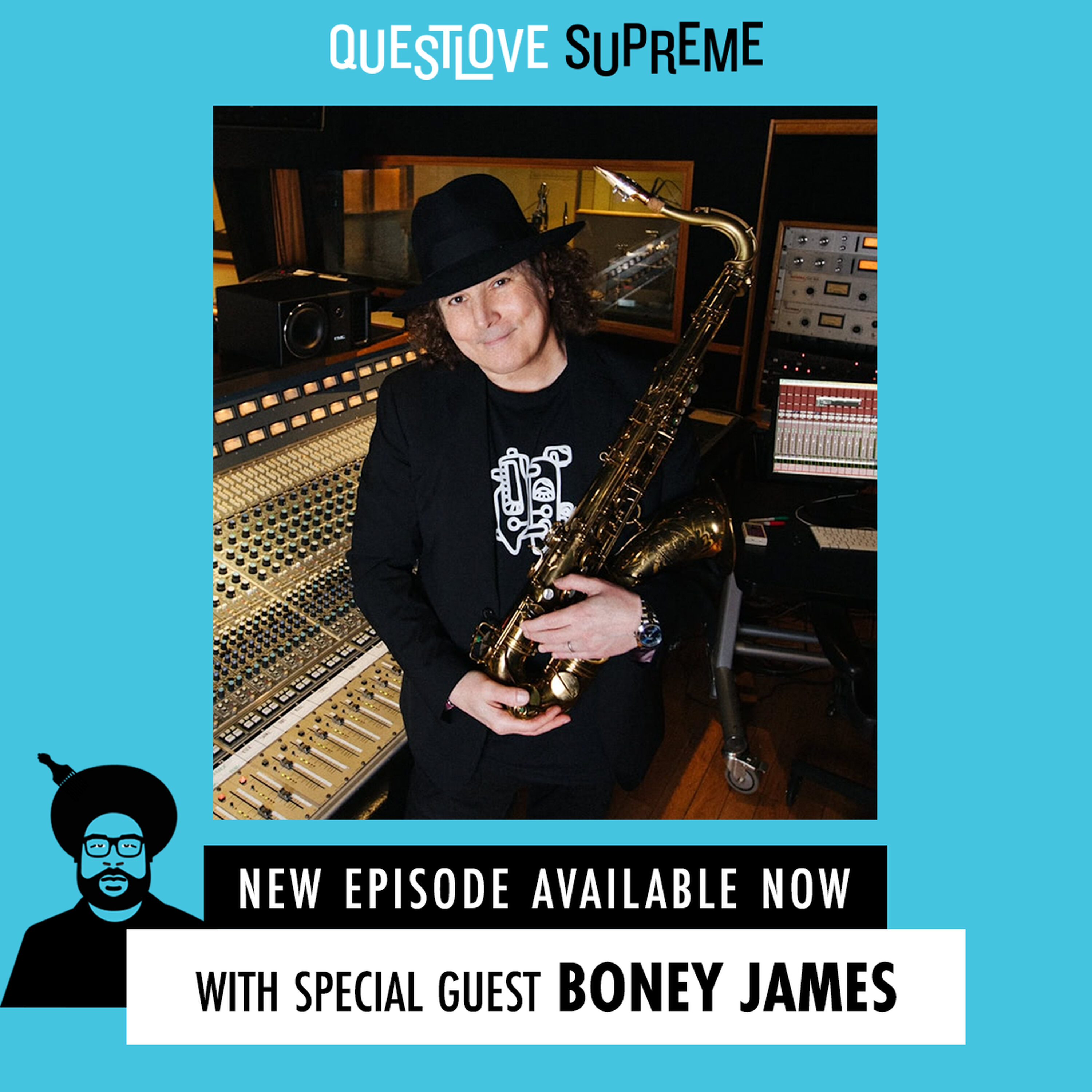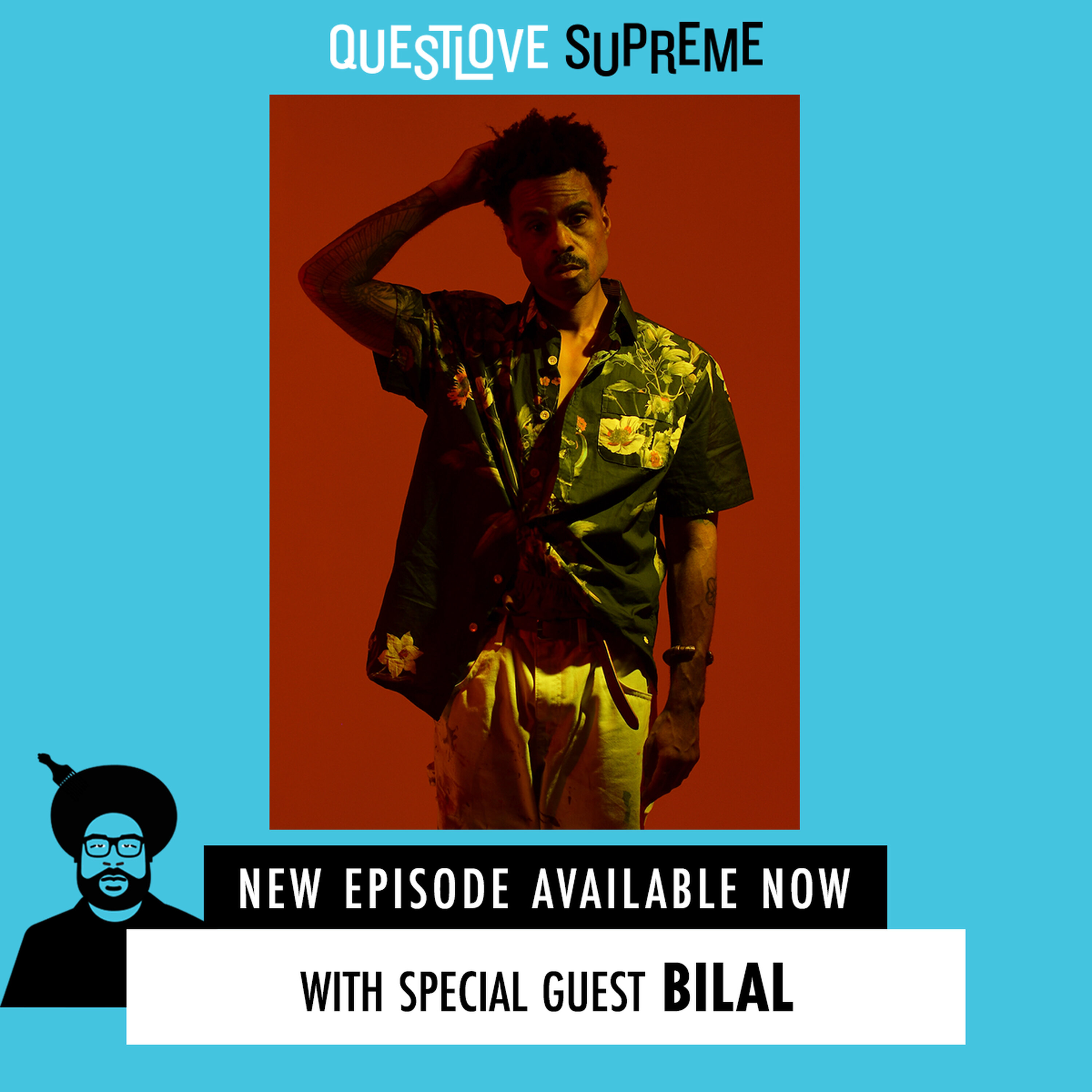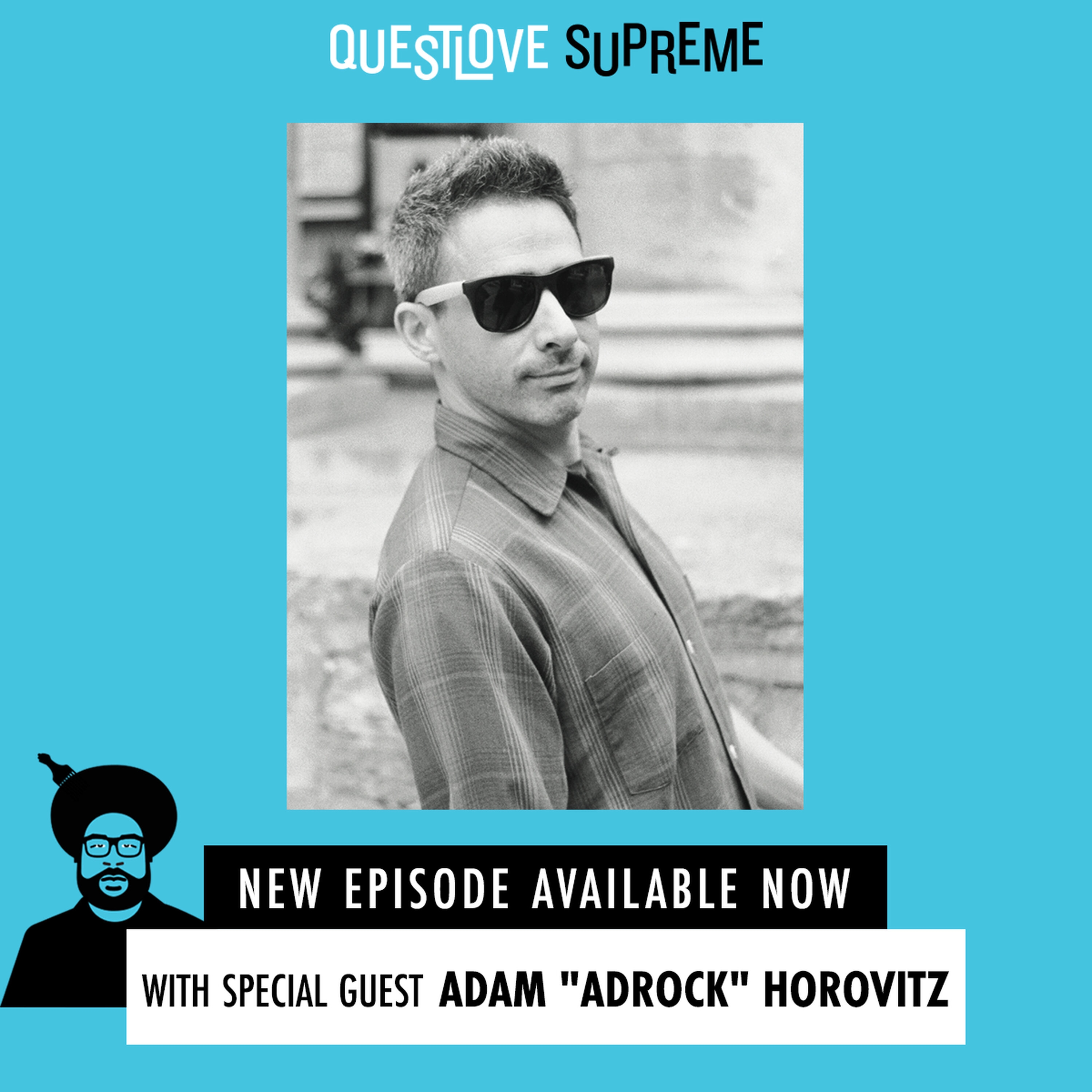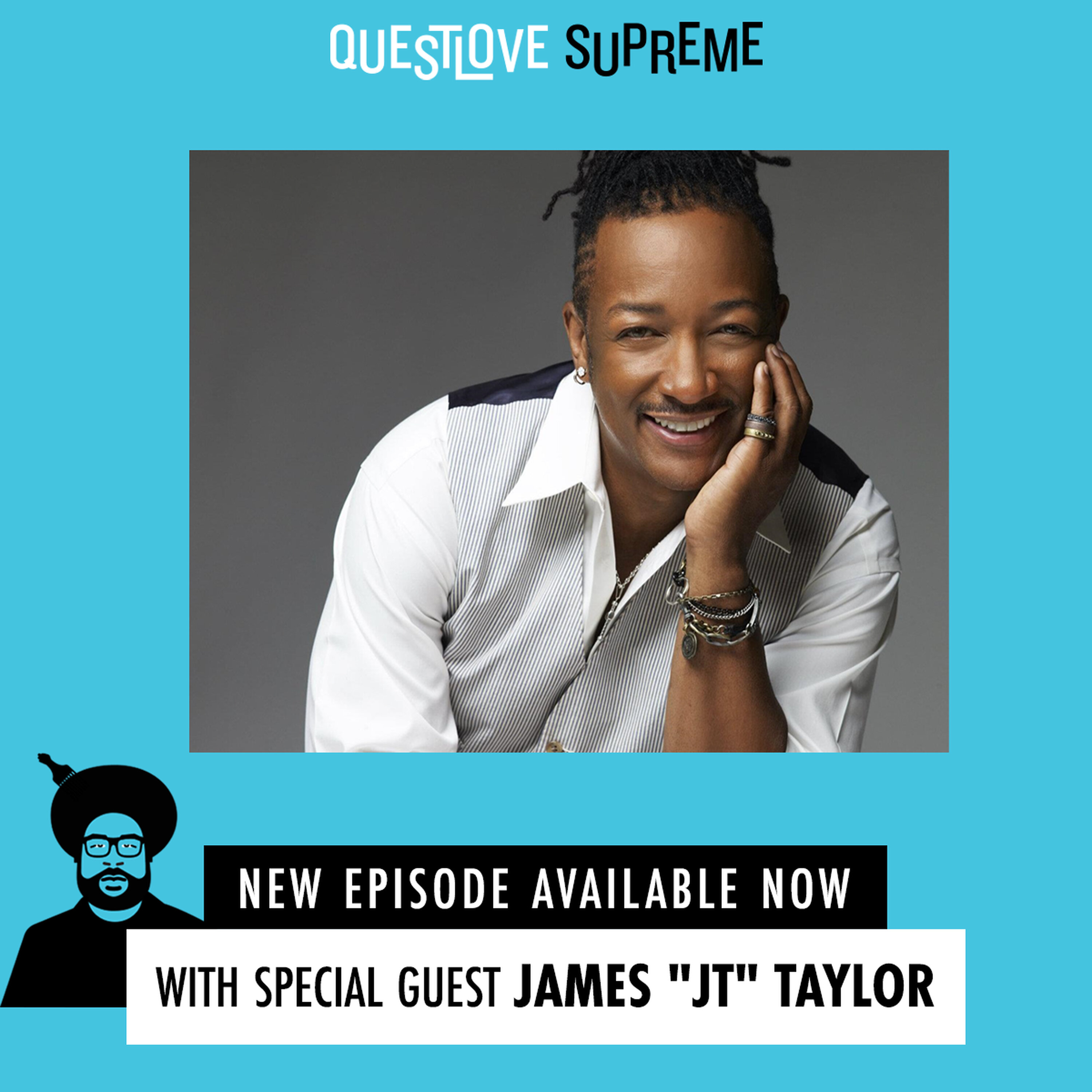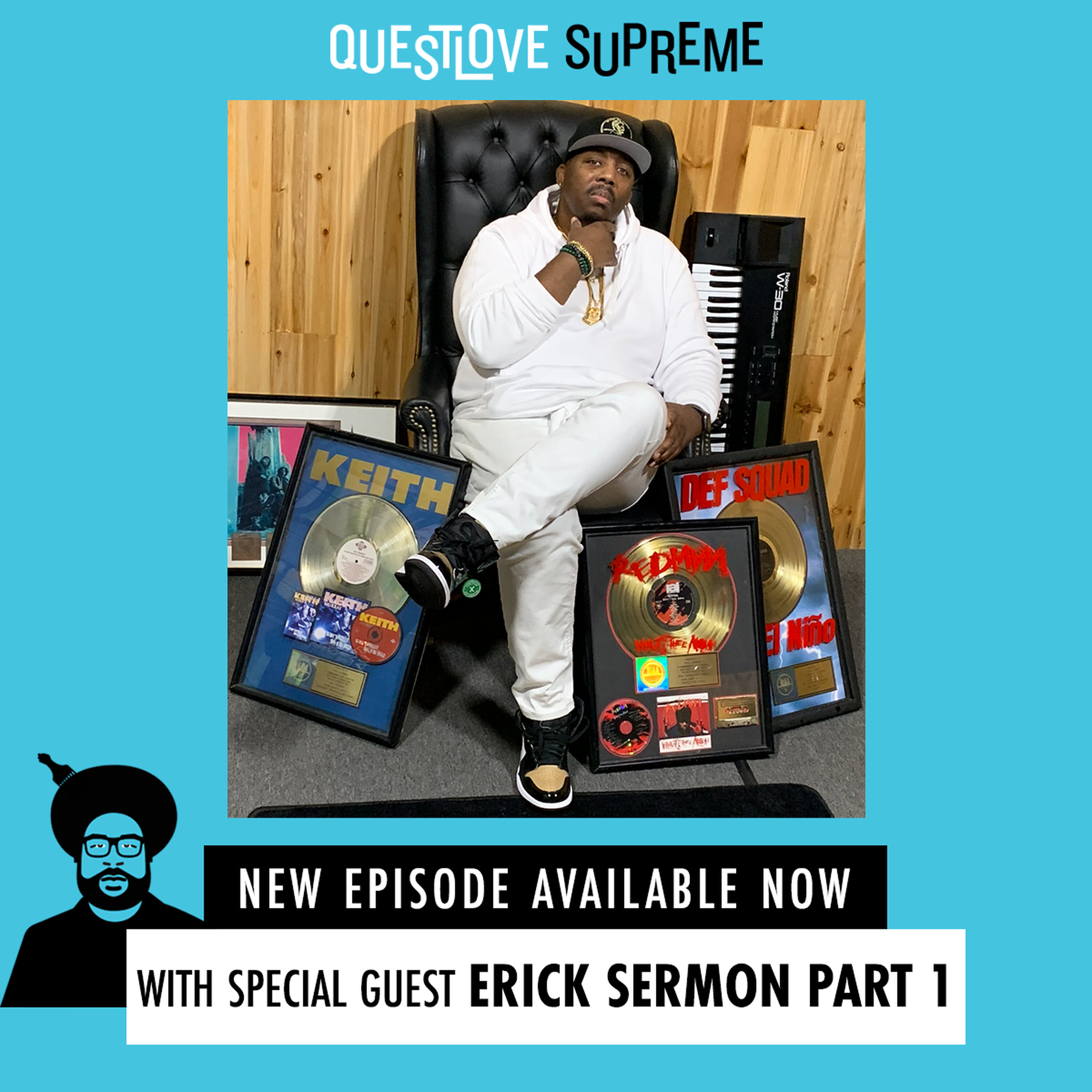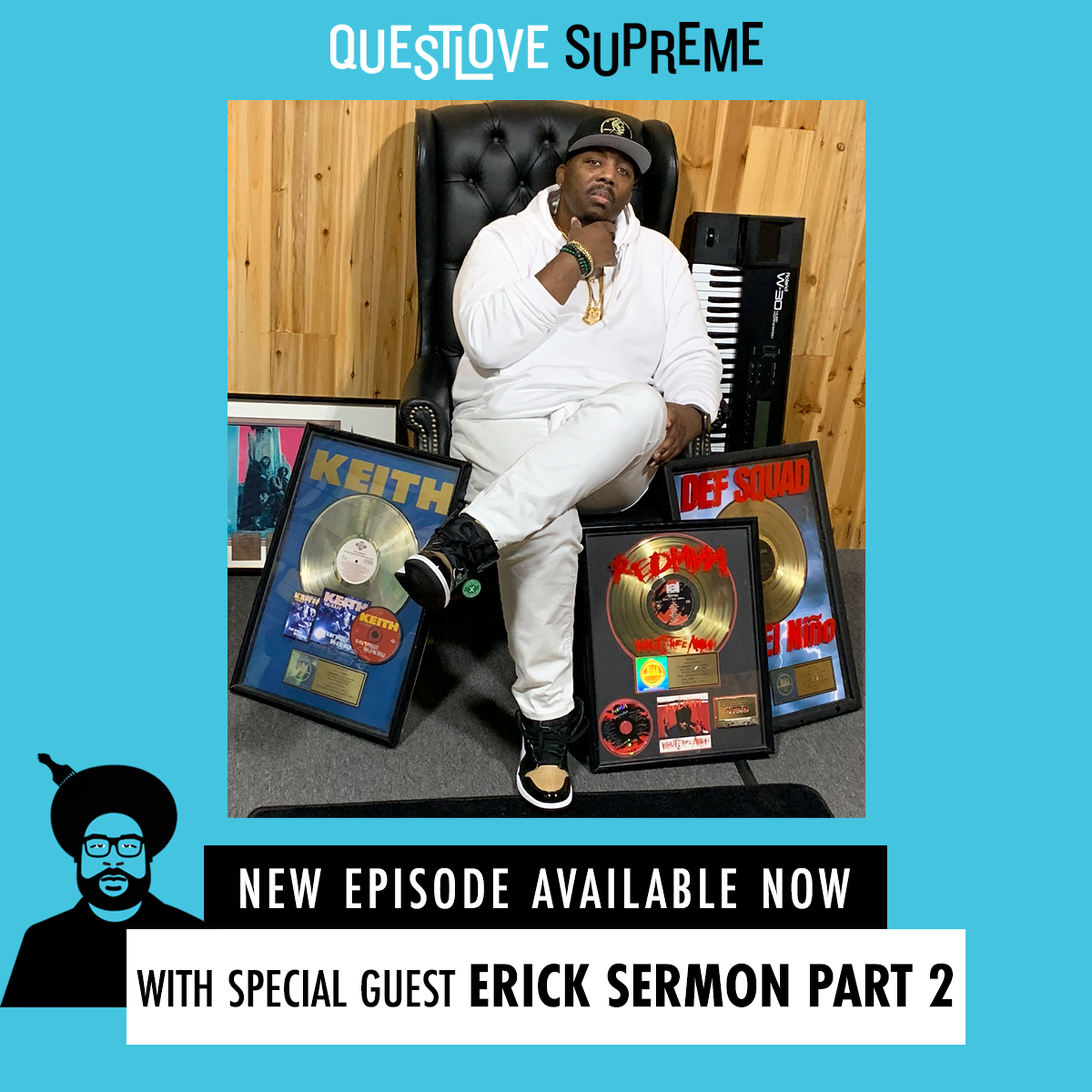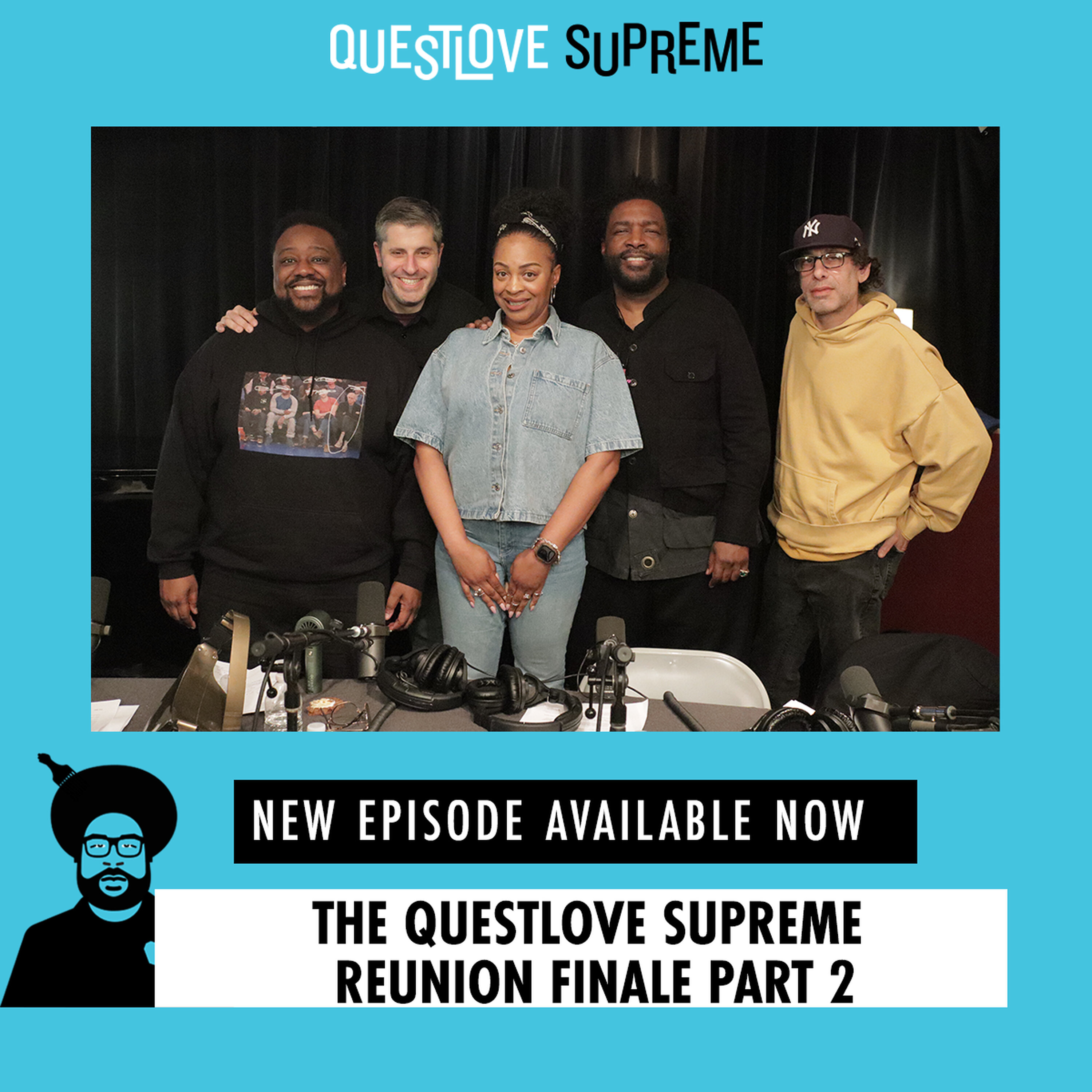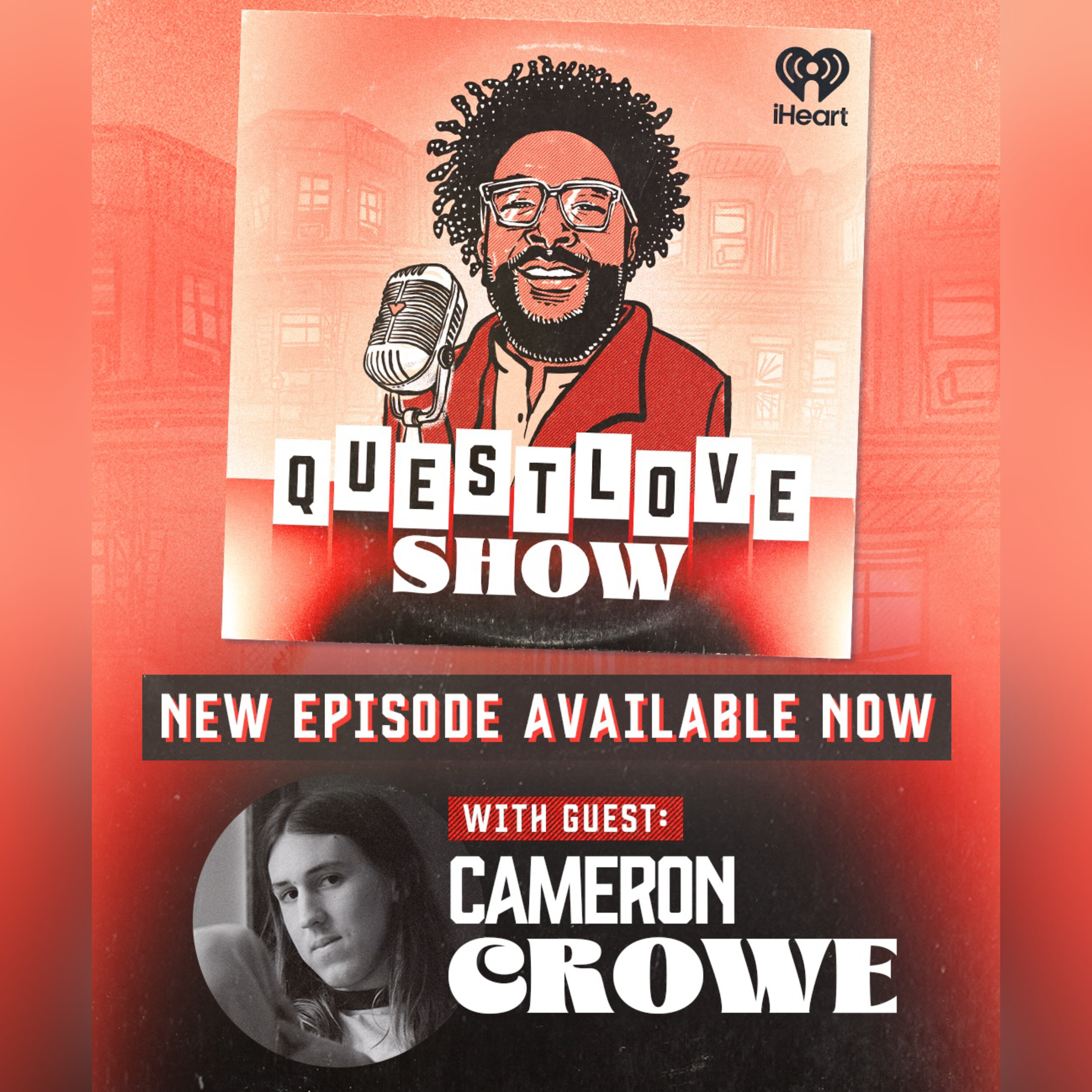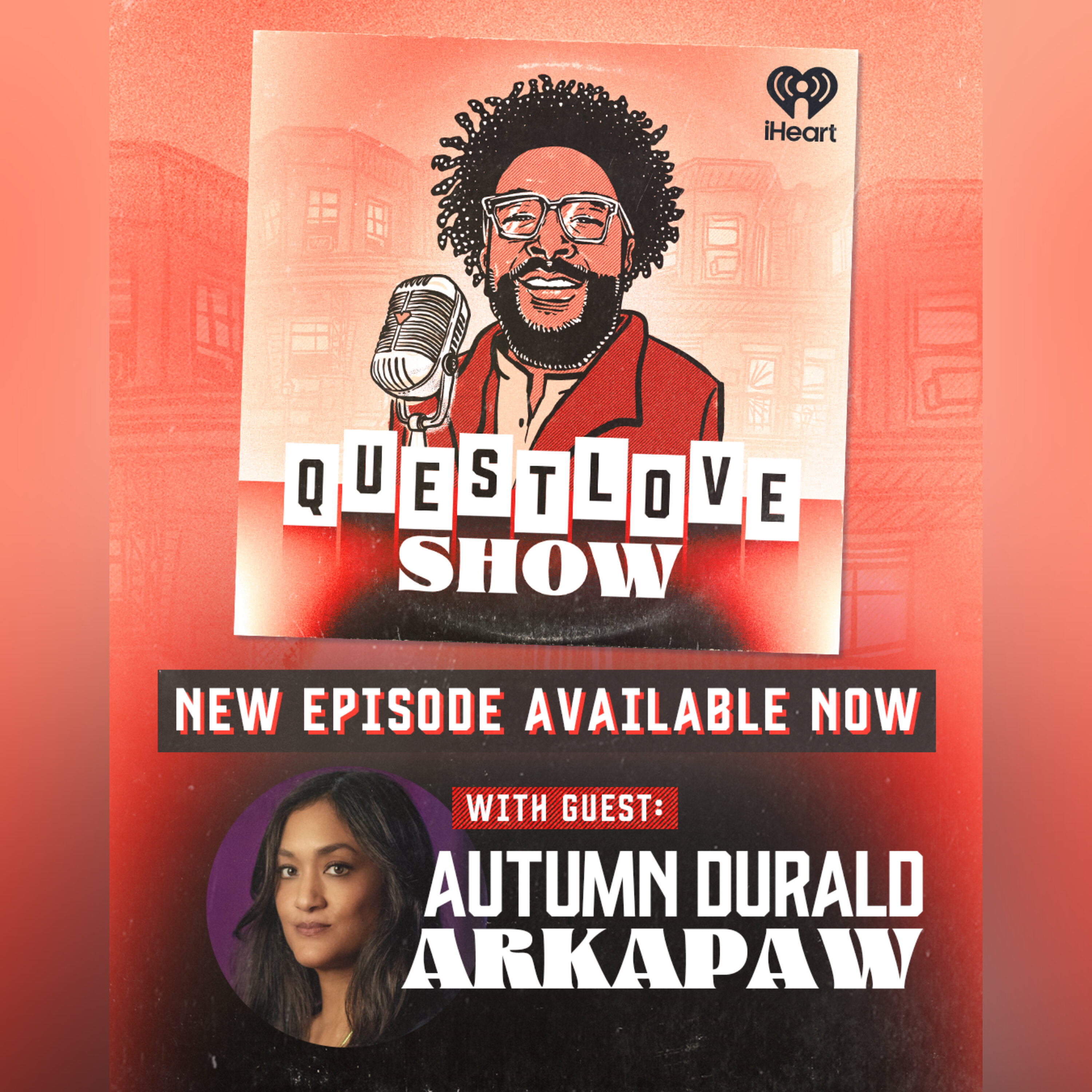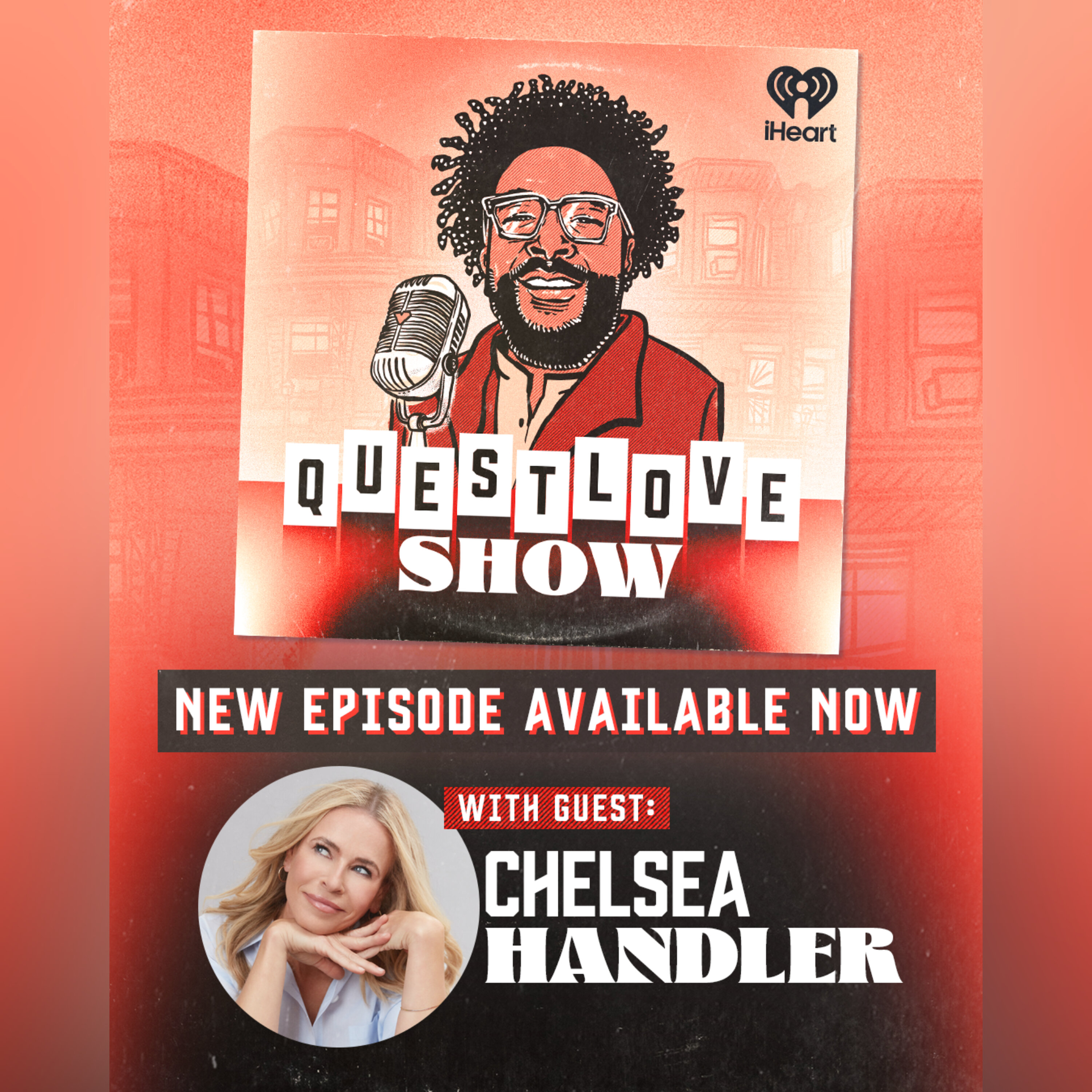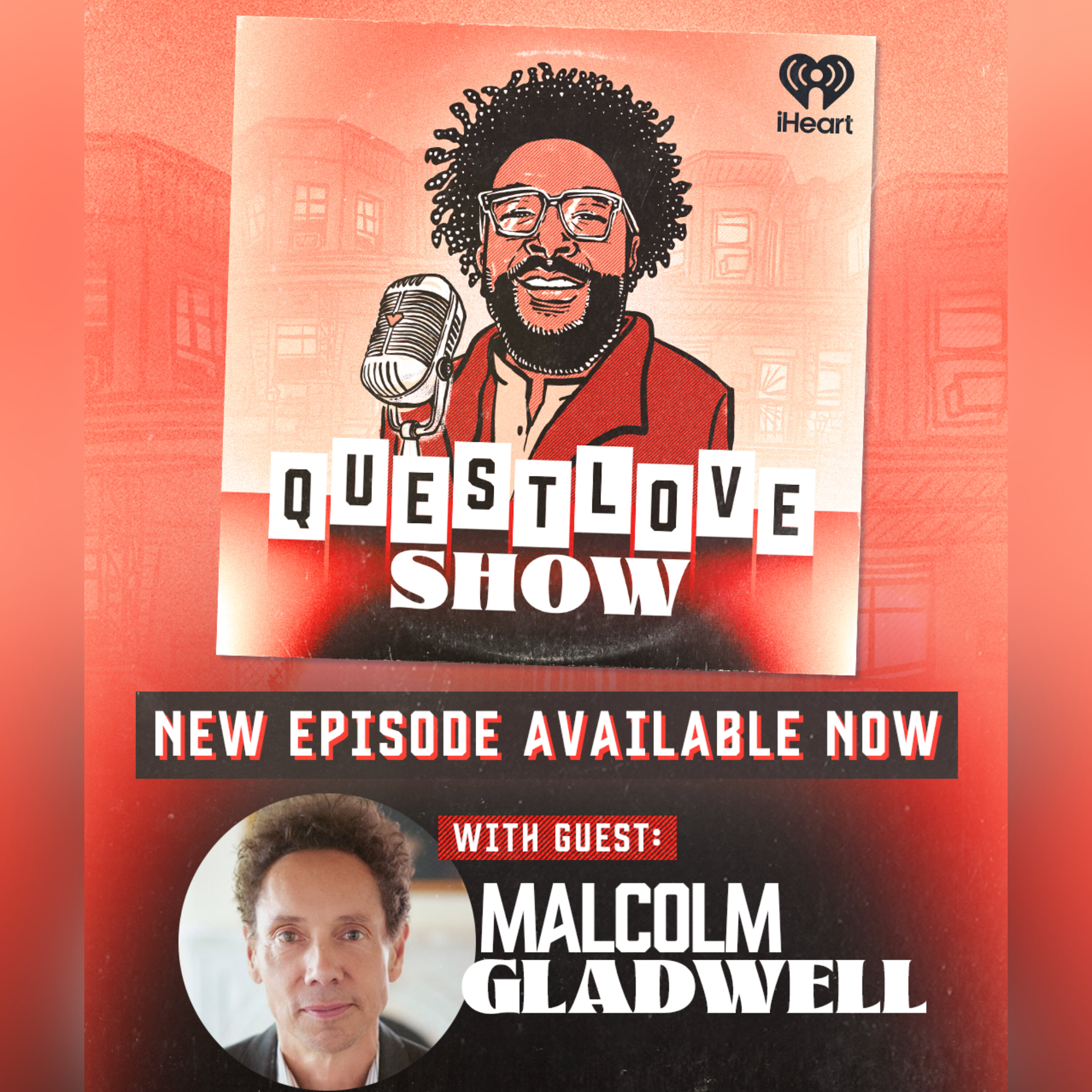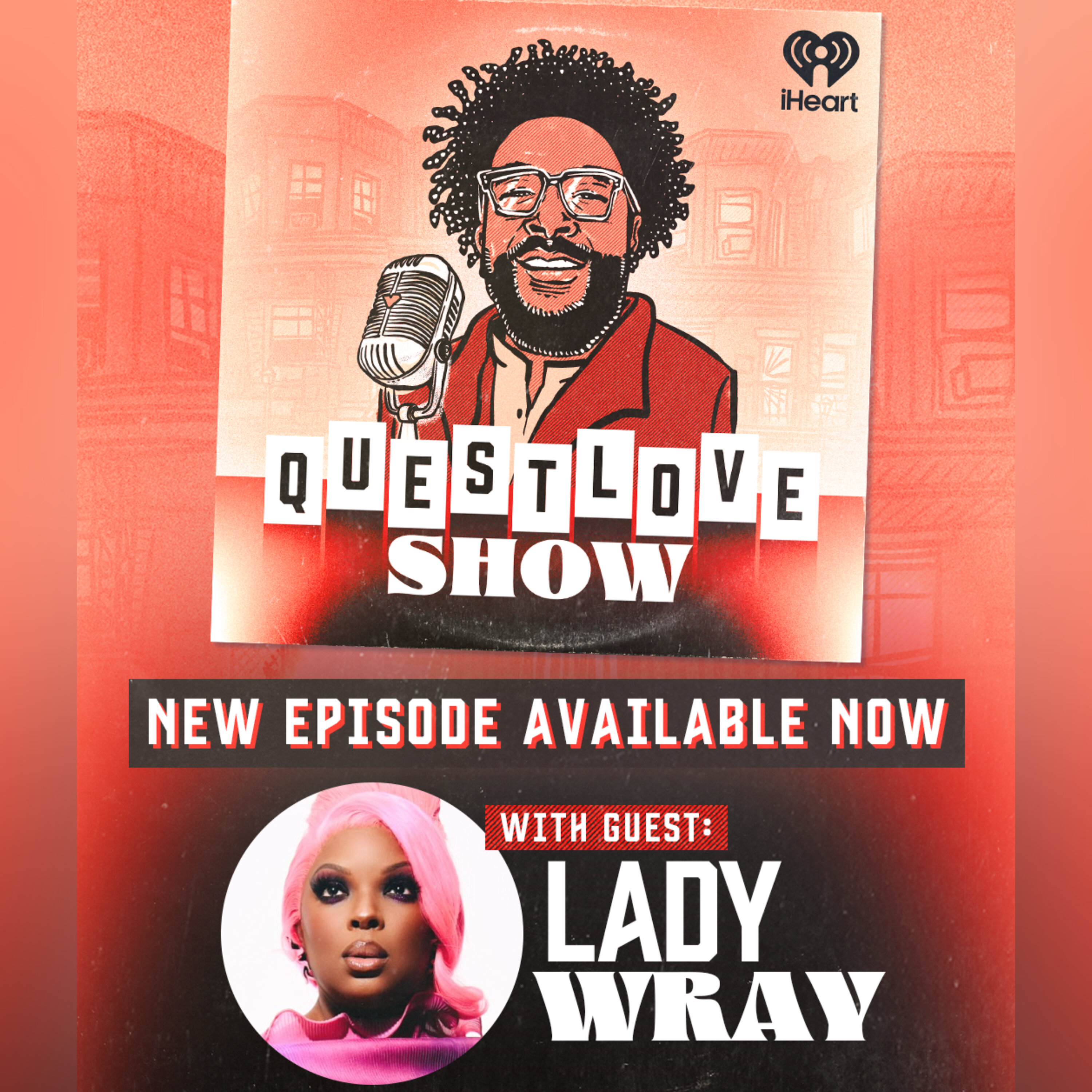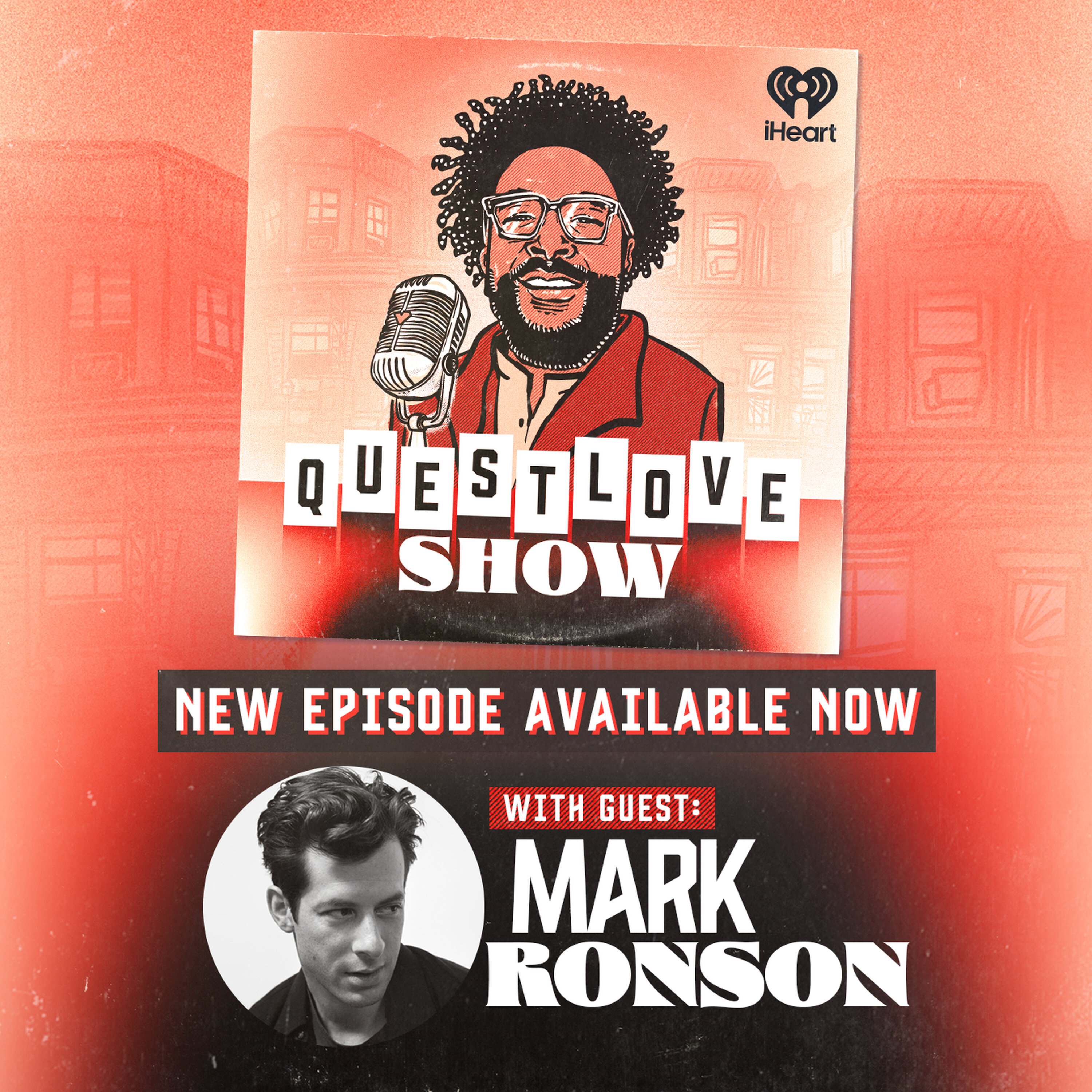Boney James
Boney James joins Questlove Supreme to discuss his journey playing Jazz, Soul, R&B, and Funk. The Grammy Award-winning saxophonist recalls his days playing other instruments as a sideman (and delivering pizzas) to build towards becoming a leader in his space. Boney recalls his upbringing outside of New York City, his time touring with Morris Day, and how he earned his unique stage name. James also describes some of the new ground he's breaking on his latest album, Slow Burn, including his radio-charting single with October London, "All I Want Is You."
00:00:00
Speaker 1: Quest Love Supreme is a production of iHeartRadio. All Right, ladies and gentlemen, welcome to another episode of Quest Love Supreme. Young addition is Quest Love and we are Team Supreme here. While yeah, what's going on? You had another room?
00:00:23
Speaker 2: How about a great more talk show?
00:00:26
Speaker 1: We now you're the queen of the castle because your room choices. You literally know how to make new environments in every episode. We've worked on it every day.
00:00:38
Speaker 2: Yes, but look, seriously, I mean you see the difference though, right.
00:00:41
Speaker 1: I'm impressed. There's punctually going on, y'all can see I'm clearly cluttered.
00:00:46
Speaker 3: Special take it from mister himself.
00:00:50
Speaker 1: Well, also, freaking star wars beams on me. What's good, Steve? How's it going good?
00:00:55
Speaker 4: How's everybody doing today?
00:00:57
Speaker 1: Hi? Bony, Thank good to see us, Steve, Steve our resident instrumental music collegist and on paid bill. Yes, sir, how's life man?
00:01:07
Speaker 3: As a former tenor sax player? I could be more excited to this is the day? Man, I'm into it.
00:01:12
Speaker 1: Wait, I learned more and more about you each episode.
00:01:17
Speaker 3: You note this, So I was a saxophone player all my life? And then I like, then, how come you never came to a jam session on paid bill because I was never invited to a jam session.
00:01:28
Speaker 1: To invite you on paid bill unless you made it known that you're more than a producer songwriting right.
00:01:34
Speaker 3: Well, okay, sorry, no, not at all. In fact, those are Ludwig Quest Love drums behind me, just so we're all on the same page. I mean, wow, the tom is the Tom's from the Breakbeats thing.
00:01:49
Speaker 1: This one. I was impressed. I was a little jealous. I was like, how come you're rocking Quest Loves.
00:01:54
Speaker 3: I like to pretend that this side of the room that I pretend to play all of these things. I also pretend to play all of these things. You'll note that none of them are on but it's okay, it's cool. They look awesome. I guess that Bodie James only plays the saxophone to his left. All that other shit is all fake too. I feel like that's the vibe for sure. I'm kidding all right.
00:02:12
Speaker 1: Anyway. Anyway, you know, we've had many musicians on the show, Ladies and Gentlemen in the past couple of episodes of Quest Love Supreme. Today's no exception. Our guest today is a multi Grammy nominated chart topping arrangers, songwriter, musician, saxophone player who's built an incredible career for the last forty plus years with luminaries, starting off with Barns Day. Okay, I'll get to the Morris date part because I'm very familiar with the color of Success era of Marris, which I definitely want to ask you questions about the Isley's collaborations with Al Jiro, George Duke, so many others. Right now, he is just released his new LP called slow Burn with Corey Henry. I dubbed Corey Henry mister Egyptian Musk. I think he bathes in about four gallons of Egyptian musk a day.
00:03:07
Speaker 5: I didn't we spent together.
00:03:11
Speaker 1: Dude, If you shake Corey. I shook Corey's hand once and had to like shower four times when I got home, And that.
00:03:18
Speaker 3: Was like you and the good old days with Shade Butter. You used to smell like a bakery all the time. That was the joke that went around. Now you don't as much, but you used to smell like that too.
00:03:25
Speaker 1: Right, But I think Corey puts it on his hands, which I'm like, wait a minute, I'm like, why do I smell like Egyptian musk? Like literally, I'm being Corey's oils on like.
00:03:34
Speaker 6: Other people heard us. He's going through that stage, you know, I see well.
00:03:39
Speaker 1: Not to mention Marcus Miller. October, London's on slow Burn just got released, and uh, you know it's rather fitting that, uh, we have a conversation with one and only Bonie James on Quest Love Supreme. Welcome to be here. So this is the first time we're seeing you without your signature? Is it we say it Ballero?
00:03:59
Speaker 5: No, it's Fedora.
00:04:03
Speaker 1: Really okay, I thought it was Balera. This means that you allowed joying your life if you're still this young environment.
00:04:10
Speaker 5: So I feel younger every day. I'm noticing more since I turned sixty a few years ago, that I'm getting younger every day. That's my feeling.
00:04:19
Speaker 1: Yeah, I think as these generation passes, like you remember what sixty looked like when we were kids, I think it's the amount of stress that you allowed it in your life that determines like how you're going to look.
00:04:32
Speaker 5: So, but my career path is very very helpful to my general demeanor and sense of well being, very fortunate.
00:04:39
Speaker 1: So I take it you're in an environment. That is your home studio.
00:04:45
Speaker 5: This is my home studio at the backyard.
00:04:47
Speaker 1: Where do you reside in the world.
00:04:50
Speaker 5: I live in West Hollywood in Los Angeles, okay, and this is when I'm not on the road. This is where I spend most of my time here in the backyard studio.
00:04:59
Speaker 1: Nice. Okay, that's what's up. How long have you had this setup?
00:05:02
Speaker 5: I've been living here for like twenty seven years, okay. The previous owner had been a stockbroker and had an office out here, and then when I moved in, I turned it into my studio. So this is where I've been working ever since. Then.
00:05:15
Speaker 1: I see, I got it, I got it. Where are you originally from? I?
00:05:19
Speaker 5: Well, I was born in Lowell, Massachusetts, which is a little town outside of Boston. And I grew up mostly in New Rochelle, New York, which is a little town outside of Manhattan.
00:05:28
Speaker 1: New Rochelle. Okay, yeah, and I know that from brand Nubian rhymes.
00:05:34
Speaker 5: Afterway through high school, my whole family moved to Los Angeles, Catho. My dad's job moved us, and I've been here ever since.
00:05:41
Speaker 1: Oh okay, So I always start with this question, could you tell me what your first musical memory was.
00:05:52
Speaker 5: My first musical memory. You know, there was a lot of music in my house. My father was an attorney that when I was young five sixty seven worked for Columbia Records, so there were a lot of records around, and I loved music right away, and I love to dance. I remember he had a lot of film soundtracks and I remember what is popping into my head is the soundtrack for Zorba of the Greek? Really Yeah, that music just really excited me, and I used to dance around the living room to disorber the Greek. And I think that's one of my very first musical memories.
00:06:27
Speaker 1: Strangely enough, what era did your dad work at Columbia?
00:06:31
Speaker 5: Well, this has got to be, you know, mid late sixties. You know, there was also Dave Brubak Records were there, and golly, you know Bill Evans Records. And I mean the very first record I remember buying with my own money was Chick Courrea is No Mystery. So this is what early mid seventies, yeah somewhere, yeah, well, yeah, yeah, it was. It was early return to Forever.
00:06:56
Speaker 1: Okay. So that's a curious thing for me because normally, if something outside of the pop frame speaks to someone under the age of fifteen, then they kind of think different to me, like, what was it about that period, because I know that, you know, you were like ten years old when when jazz was changing, like with Bitches Brew and the Headhunters and kind of jazz was figuring out, like what's what it's new? Metamorphosis was how many siblings do you have?
00:07:31
Speaker 5: I had, Well, I I only have one brother left. I had two brothers when I was growing up. My older brother passed away about twenty some odd years ago.
00:07:38
Speaker 1: Are you the youngest.
00:07:39
Speaker 5: I was the middle child. Yeah, my younger brother is five years younger. My older brother was like eleven months older.
00:07:46
Speaker 1: You know.
00:07:46
Speaker 5: I mean to go back to your question. I mean I also loved pop music and R and B music too. I love to listen to the radio, and I remember being really excited by you know, Stevie Wonder and things like that, and Bitches Brew was not my thing even when everyone was digging it. You know. I liked a little bit more accessible music. And I think I still that's kind of you know, the tradition that I did, and I think that that was probably a seed that was planted when I was young, the fusion thing, you know, I don't know. I think I was just I loved instrumental music quite a bit. I remember Barry White and Love Unlimited Orchestra. I was so excited when there was a pop hit of instrumental music on the radio, and that was always my thing.
00:08:26
Speaker 1: It's weird, assuming, Mett, you play stacks all your life, do you play any other instruments as well?
00:08:32
Speaker 5: I started on clarinet. You know, back in the days when I was a kid in New Rochelle, everybody basically in third grade would sign up to play an instrument. There was a band class and I wanted to get a trumpet. We went to the music store. All they had were clarinet, so I took a clarinet home. We rented one, and then two years later there were so many clarinets in this band. The teacher had gotten a saxophone and he leaned on me to switch to the saxophone. And I really resisted it because it was a much heavier case I was going to have to carry too and from the school. But he said, if you play the saxophone, you can be in the stage band when you get to Junior High and the stage band had just come to visit and they had very snassy satin jackets and ascot ties and a drummer and a bass player. And so that was really what convinced me, was the chance to get stage when I got to junior high school and that's when I picked up the saxophone at ten.
00:09:23
Speaker 1: I fig you're the perfect age for me to ask this question because you can answer it sort of in retrospect because oftentimes, especially with a lot of my hip hop constituents and my first generation hip hop constituents, you know, like grand Master Flash or Graham Wizard Theatore. Now, those particular guys would tell me that, you know, there was a period when they were in elementary school or middle school in which some sort of art class was required and sometimes you had to do multiple things. You had to take arts and crafts, but you also had to take music. You had to like the word had is key here. It wasn't like an elective or an option. And then they said that there was a shift or a tied kind of at the end of the pre Watergate Nixon administration in which a lot of these programs got cut. They were all telling me, like, you know, I really wanted to play bass, but we didn't have any bass classes, so I became a DJ. And that's kind of how a lot of the first generation hip hop class was. But a lot of the generation of musicians now, is that how they came to music?
00:10:47
Speaker 5: Well, by now, I mean from Michael Hort, I think a lot of them did. Yeah, I mean.
00:10:52
Speaker 1: Specifically, you're like, you know, the sixties seventies generation.
00:10:56
Speaker 5: Yeah, it was a trip. And it seems like such an ancient history, doesn't it, that that was the deal, you know, And this was a public school, middle class, lower middle class, mixed.
00:11:07
Speaker 1: I'm only asking simply because I think kind of in my rose colored bubble view of it, I thought like, you come out the womb with some sort of musical talent and your parents are like, oh, this is what you want to do, and then you pursue it. But a lot of my idols of the kind of Midwest migration, you know, families who moved from down south to Detroit or Ohio, Indiana, whatever, you know, they were like, no, like I did have natural talent. I just saw bass one day. I mean, even Christian McBride told me, like, even though his dad was a bass player, like he came to risk, came to base late, like when he was twelve or thirteen. I thought he came out the womb like with a bass in hand. So not knowing how to play a clarinet, how did it take you to literally figure out the fingering and all those things?
00:12:06
Speaker 5: Boy, that's you know. I don't remember exactly, but my recollection is say is that I was pretty good at it compared to the other kids in the class, pretty quick, and that was one of the reasons that he thought it would be easier for me to switch to the saxophone two years later. I mean, clarinet never really warmed up too, but as soon as I picked up the saxophone, it really did become my favorite thing to do and all my other hobbies fell away. But prior to that, I did not come up. I mean, my my family has no musical talent whatsoever other than me. My parents can't even carry a tune. You know, if they sing Happy Birthday, you can't even tell what song it is.
00:12:38
Speaker 3: So James and I are very similar. I just want to say, the clarinet to the saxophone.
00:12:42
Speaker 1: The parents.
00:12:42
Speaker 3: My parents are doctors. I loving all this. I feel like I'm watching a showy No, no.
00:12:46
Speaker 1: You're not the same. Because Bonie James let me know that he played the saxophone on pay Bill.
00:12:51
Speaker 3: Oh, here you go, here you go, here's that moment. It's happening. It just happened.
00:12:55
Speaker 5: When so last time you picked up the saxophone, do you do you still play? It's right over there the case.
00:13:00
Speaker 3: No, I don't, as much as I like to walk over there, let.
00:13:03
Speaker 7: Me challenge challenge no way, but I appreciate it.
00:13:09
Speaker 3: But no, not in front of body James. That feels like sacrilegious and weird. Let's move on.
00:13:13
Speaker 1: You co created Hamilton, you can do anything.
00:13:16
Speaker 3: I did not. We produced the album together. I did not make Hamilton. We made an album together a long time ago.
00:13:21
Speaker 1: So was switching to saxophone? Is that transferable? In other words, like, if given a clarinet or saxophone, is it the same fingering? Is it the same?
00:13:31
Speaker 5: Similar? Similar point? Yeah, it's similar to a point. Part of the clarinet is the same. And then when you switch till you go over the octave and it changes. It's a little bit more confusing. The clarinet plus the clarinet is an open holdingstruin. In the saxophone, it's a close holding string with keys. The ambisher completely different. To get a good sound out of the saxophone, you have to hold your your interior mouth and you know, teeth and lips and everything is different. But many sax players also play the clarinet and flute because they're all similar fingerings.
00:14:04
Speaker 1: Have you ever challenged yourself for other brass instruments like trumpet, trombone.
00:14:10
Speaker 5: And I up a clarinet for many, many years, and I have a flute in the closet that every now and then if I need a flute on one of my records, I will shed for a day or two enough to get a wispy sound. But yeah, I mainly have been concentrating on the saxophone. And I did play keyboards for a long time too. That was, you know, my entree into professional show business was playing keyboards.
00:14:29
Speaker 2: But just to be clear, you never played the recorder.
00:14:32
Speaker 5: I did play the recorder as well. Really, quarter is a very challenging. It's really hard, is when.
00:14:39
Speaker 2: They give all the kids first.
00:14:40
Speaker 5: So yeah, but if you've ever heard someone really play the recorder, it's quite impressive because it's who.
00:14:46
Speaker 3: Are your early influences in the early days, like clarinet transitioning to saxophone, like clearly you picked it up, and then with somebody like you should listen to this was there like a touchstone artist.
00:14:56
Speaker 5: I left on when you're a kid and you're picking up the saxophone. And I took, you know, private lessons in addition to the school into Rochelle. The private teacher that taught me, he was a guy named Stanley Hammer, and I came to find out that Bob Mintser, famous sax player from the Yellow Jackets, also studied with him, although he was a few years older. And what I remember about him was he had a couple of dogs that were yapping incessantly during the lessons. You know, when you first start on the saxophone, people will push you. So I started on alto and people will push you to listen to Charlie Parker and you know that kind of beatbop music he was not really didn't warm me up because I was, like I said, I loved radio. I love the R and B. The fusion thing came a little later, but when I heard Grover Washington Junior in seventy five, you know, It was the first cat I heard that was mixing up sort of a go go beat with a lovely saxophone tone and improvisational spirit, but with a song that you could hear. And that was what really, you know, was like, wow, man, this is dope. And that was kind of the path that it started. That's what started me down this path, and that's a tradition I think I'm sort of carrying on today.
00:16:05
Speaker 1: So with the saxophone, how hard is it to find.
00:16:12
Speaker 3: Your Like?
00:16:14
Speaker 1: I know Coltrane when I first hear it, I know Herb Albert when I first hear him. I always wondered how a brass player finds a tone, Like.
00:16:29
Speaker 5: I think that's kind of harder for me to be objective about, but I mean I when I think about it on my own term. So I think it was when I really started to write songs for me as an artist, you know, when I really started to think when you know, because so much of my life prior to when I started making records was working as a sideman, and you have to be a chameleon and and you would often you know, I played keyboards a lot, but when I got to play the saxophone, I have to learn someone else's solo. So I would, you know, pretend to be Ernie Watts or pretend to be David Sanborn, you know, an imitative kind of thing.
00:17:02
Speaker 1: Ernie what wow? Okay.
00:17:03
Speaker 5: But when I really got frustrated with that lifestyle and I thought, man, I really should just try and do my own thing. I wasn't liking any of the songs I was writing for other people. I was trying to, you know, get a publishing deal, all the things young musicians do, and I thought, let me just try and make records, make music for me. That was when I think I started to feel what I was playing more and to really just become more immeshed in the music. And that was when the horn became more my voice and distinguishable. And people tell me now that they can always tell it's me, and I'm.
00:17:33
Speaker 2: Very slow Burn.
00:17:35
Speaker 6: You can tell from some of the other records, like the actual slow Burn record.
00:17:39
Speaker 5: Thank You Yeah. And I think hopefully my sound has continued to evolve. I mean, I'm always working on trying to become more and more the essence of whatever it is that I'm doing, and so much of that is the more adept you get at the horn, the fewer barriers that are for expressing yourself. And if you're really playing from the heart, I think you're going to have an identific thought and identifiable voice, whether you're singing or playing an instrument. So that's my theory.
00:18:04
Speaker 1: Wow, okay, So what was your first creative project before you're taking this seriously or like once once you get your chops in order as a kid into your teens, was what was the first creative project that you put together?
00:18:21
Speaker 5: I was in a band called Line One. This was probably late high school through most of college. Another member that band is a guitar player producer named John Shanks. You might be familiar with.
00:18:33
Speaker 1: I've heard name.
00:18:33
Speaker 5: Yes, he does a lot of rock and roll records. He won Producer of the Year a few years back. He was the guitar player in that band. We're not really in touch now, but you know. And that was like it was started out as sort of a fusion R and B instrumental band, and then we tried to sort of turn into Level forty two or something like that. And we werehearsed in Kenny Gradney's garage. Kenny Gradney, the bass player from Little Feet, was like our mentor and That was like my life for the whole main part of my late teens, early twenties, and until I actually got my gig with Morris Day, and that was you know, we were going to try and be stars, but it never happened for us.
00:19:12
Speaker 1: What was your first professional gig?
00:19:14
Speaker 5: Well, you know, I had decided when I graduate from high school that I was not going to pursue a career music. I thought it was not possible.
00:19:22
Speaker 2: Yeah, here is another job. Okay, another job.
00:19:25
Speaker 1: Okay, watch it ass. What did you want to be when you were a kid.
00:19:28
Speaker 5: I was not sure, but I mean, my father was an attorney, so I thought, well, maybe I'll eventually go to law school. I studied history in college. I went away to UC Berkeley. I didn't practice my horn at all for almost an entire year, and I was miserable and came back to LA for summer vacation and hooked back up with this band. And they were playing some real gigs as opposed to dances or parties and things that we had done before. And they had a gig at the Improv which used to have music on Melrose used to have muscasionally, and I got up on stage with them and I had this epiphan This was like the summer between my freshman and sophomore year at college where I thought, you know what, this is what I really love to do, and I'm going to move back to LA and stick with this band. And I mean I transferred to UCLA and I did graduate from college with a degree in history, but from on I was very much a half assed student and dedicated to music. So it was about nineteen that I kind of made that decision. You know, also, my wife, who I'm still married to now, you know, when we she was very helpful in helping me decide, you know, should I should I try and do this? Should I go to college? Should I be a lawyer? And she's like, you should really try and do this.
00:20:34
Speaker 6: So while y'all met that that far back when she was just a struggling actress in your.
00:20:40
Speaker 5: Yeah, forty four years now married for thirty nine.
00:20:44
Speaker 3: Wow, it might be your greatest success. Sever that's amazing.
00:20:48
Speaker 5: It's one of the great blessings of my life.
00:20:51
Speaker 6: I just asked a question, what would the other job? Did you ever work any other jobs besides music?
00:20:56
Speaker 5: I was a a you know, culinary transportation engineer.
00:20:59
Speaker 1: For me, heay, way way wait.
00:21:03
Speaker 2: A culinary transportation.
00:21:06
Speaker 5: Pizza delivered.
00:21:08
Speaker 1: I was like wait. In my head, I was like, okay.
00:21:13
Speaker 2: I know it was something closed Bill.
00:21:15
Speaker 5: I worked probably for four or five years delivering pizzas to pay the bills while I was playing in these various bands and trying to figure out how you make a living as a musician. And it was right from that pizza gig that I got into Morris's band in nineteen eighty five, and.
00:21:27
Speaker 2: The pizza gig.
00:21:29
Speaker 5: I had to postpone my wedding because I got the gig with Morris and the schedule for that first tour interrupted our wedding plan.
00:21:37
Speaker 1: So she's a patient woman. I take it.
00:21:41
Speaker 5: She's a lovely woman.
00:21:43
Speaker 1: Was your family encouraging of this decision? And this is coming from a person who, at least my dad was not too thrilled at once He eventually found out about the roots. But for you, was your family encouraging of you pursuing this passion or was it like safety first and get the money become a lawyer?
00:22:08
Speaker 5: They were from that, you know, we want you to be happy school of parenting, which I'm very great.
00:22:13
Speaker 1: That's rare, very so don't even get casual about that hippie.
00:22:18
Speaker 5: Sure that they were worried. But you know, after I'm Lily and I moved in together soon after, and I was living independently and was not you know, on their dole, and and I think that they were supportive, is my recollection. And of course once I started making a living as a sidemen and you know, some of those early gigs they paid pretty well for back in the day, and I think that they were relieved. But you know, now, my father passed away a few years ago, but my mom, you know, is still very proud of everything, you know, and it's kind of kind of weird for them that this has turned out for me, because, as I said, there's no music in our family at all, and yet here I'm still doing this all these years later.
00:22:58
Speaker 2: One of the rare people you can actually CD is Starbucks.
00:23:04
Speaker 1: What are those?
00:23:05
Speaker 5: Ye? Right?
00:23:07
Speaker 1: So did you play Keyboards and Sax and Morris's band? Yeah?
00:23:12
Speaker 5: Well I got the gig on keyboards.
00:23:15
Speaker 1: Knows you with the okay? Because I was watching the Soul Train episode of the character in Oak Tree and I was.
00:23:26
Speaker 5: Keyboards is me?
00:23:28
Speaker 1: No?
00:23:28
Speaker 5: No? No, I have a trench coat on. Yes, No, Well, like I had a key I think I was just playing on a stand. But yeah, no, I've done. I did a lot of those TV shows with Morris back from that that era.
00:23:40
Speaker 1: That's your first gig.
00:23:42
Speaker 5: That was my first real professional touring gig.
00:23:45
Speaker 1: Lead up to the story of how you got that gig?
00:23:48
Speaker 5: Okay, So I was as I was playing in that band, line one and we weren't really getting anywhere, and I was the littering pizzas and I was like, man, this is getting kind of old, you know. And then right around that same time, Morris is post Purple Rain. Morris was on the cover of Newsweek magazine. You know a star. He broke up with Prince and moved to La to put a solo band together, and they had a cattle call audition, and somehow I caught wind of it that they were looking for a keyboard player. And I had a little Juno sixty keyboard that I was trying to write songs on, and I taught myself how to play Jungle Love and the Bird to the best of my ability, because I'm not a great keyboard player even to this day. I mean, I can, you know, make things.
00:24:28
Speaker 1: Happen if you the song you know what to do.
00:24:31
Speaker 5: I learned the song I can do it, you know, and I had a groove, you know, I had I think I had the groove, and I had a look and I was happy when I was playing music. I was bopping around. They hired me that same day. Really okay, So that started that starting. Kurt Biscarra was the drummer Kirkie Bee and Roman Johnson was keyboard player. Gail Johnson was keyboard player. Ricky free Smith was still doing it now, is still in the time now? Was there? Then?
00:25:00
Speaker 1: He's the Asian guy playing drums, Filipino guy, Yeah, Filipino. Who is he? Because next to Zorrow I would always see yeah, you know.
00:25:10
Speaker 5: You were all those bud fests with Zoro right right right? That was who he was playing.
00:25:15
Speaker 1: With Bobby Brown. So next to Zorrow, I would see Kirkby everywhere.
00:25:22
Speaker 5: Kirky be his first gig too. We met that day and and our lives were transformed, honestly, you know, because wow, we're like, anyway, who is Kurt? Scare is his name? He's still a very popular successful session drummer. You know, he's played with I see it.
00:25:37
Speaker 1: I still see him working.
00:25:39
Speaker 5: Mick Jagger, and but he did Tom Petty for a while. You know a lot of big gigs. Great drummer, this is.
00:25:46
Speaker 2: You with the mustache. I'm looking at the video for Soultia.
00:25:49
Speaker 5: That wasn't me with the key tart. I think there's there's there's like an American bandstand. You can see me on with Morris. Okay, but uh, I don't think that's me that you're seeing.
00:25:59
Speaker 2: No stash required, right bony oh.
00:26:02
Speaker 5: No, I no hat. It was just a younger version of me.
00:26:08
Speaker 1: So okay, explain to me during that period, how do you even get in the loop now? It's hella different, Like.
00:26:20
Speaker 5: It was a constant struggle, you know. I mean it was how you know, tried to figure it out, you know networking man, I mean it, Yeah, it was different.
00:26:28
Speaker 1: I remember like when I was a teenager. It's like the end. So I came up right when the Internet was getting established. But you know, oftentimes people were read like backstage like or or one of those trade local papers that would have listings of like audition for da da da, audition for data da I'll say today, And musicians come to me all the time, like yo, I played Dada da da da da da da da. And if they're serious about it, I will tell them that you probably want to figure out a way to get within at least three degrees of Adam Blackstone. Yes, Adam Blackstone basically he runs the mafia like he's the mafia, like.
00:27:16
Speaker 2: He's him and his wife.
00:27:18
Speaker 1: Yes, yeah, if you can figure out And sometimes, and I tell them all the time, like, you might not have access to Adam, but you might have access to a cat that plays with a cat that knows Adams. So it's almost like you almost got an audition for like three casts before you even get to kiss the Ring. What was the system in eighty five in terms of like, I hear a gig coming up, and who did you have to know that's the ring the kiss to get inside the game?
00:27:51
Speaker 5: You know. Look, I don't really remember too specifically how I heard about the Morris thing, but I do remember that after I was doing Morris for a few years, and that was like my gig, you know, he was busy and and I convinced them I could play saxophone too, so he gave me a spot in the show. He would run off and do a costume change during Jigglow's Get Lonely two, and I would leave the band for a good five sometimes ten minutes in arenas okay, with saxophone solo. And so I got sort of somehow known as a cat that could play keyboards and saxophone, and that was a valuable thing in the eighties, you know. So yeah, yeah, word of mouth. And then I think I caught the attention of Tony Maiden from Rufus from I was not an Adam Blackstone, but putting some bands together for people. So I went and did Randy Crawford with him, and then he got me with the Isisley Brothers. A couple of years after that, I got in with a guy named Cornelius Mims, who's a bass player. He put me in with Ray Parker Junior and Cherrelle and you know, and I just was doing enough gigs that somehow people knew who I was and would ring.
00:29:01
Speaker 2: Randy Crawford is not a name that said a lot.
00:29:04
Speaker 6: Can you just tell us something, a story or what was it like to work with her in that way?
00:29:09
Speaker 5: Well, I mean she has some wonderful music, you know. Yeah, yeah, everytime she opened her mouth, she sounds just like she sounds on the record, and it's a very unique voice. It was an interesting gig, you know. She would sing very very softly and we all had to play very very softly. And it was an incredible band. The bass player named Say Coup Bunch. It was Oh my gosh, Thundercat's father, Ron Brunner's senior, his father Rubber Randy Crawford's band, Tony Maiden playing guitar, Wayne Ziggy Lindsey playing keyboards, who is now actually quite in there with another one of those Adam black Stunt type guys, Ricky Minor, but he's all in all of his bands. He's actually gave me the Buddy James name in Randy Crawford's band. That's I guess, say, how did you get that name? It was Wayne Lindsay Randy Crawford's band. She was very popular in Scandinavia at the time, not a big name in the States, but a star in like Norway and Denmark and Sweden. So we go over there for months at a time. It's like eighty six, I'm gonna say, and everything costs a fortune. And I said to Wayne Lindsay Mann, I just won't eat for the next couple of days walking down the street. One day he said, shit, you'll get all skinny. I probably weighed fifty pounds less than I do now anyway, and he said, you'll get all skinny. Off to start calling you Bonie James or something, and I said, please don't call me Boni James.
00:30:33
Speaker 1: Mess with me.
00:30:34
Speaker 5: He kept calling me that and introducing me to people that way, and you know, this network of people all started to think that this guy was Bonie James, and it just caught on.
00:30:44
Speaker 1: That is great.
00:30:45
Speaker 6: Before that, you were just going by your government Jim Oppenheim.
00:30:49
Speaker 1: Well you know, Bonnie James got a better ring to it.
00:30:52
Speaker 3: Yeah.
00:30:53
Speaker 5: Well he after making records, he did, in fact call me and say you owe me because I do.
00:30:59
Speaker 1: Yeah, maybe now is the time to go on record to how we first connected. Did I tell you the story? I knew this story was coming. I've been waiting all all day forward. Up, let's let's go. Let's go. Do you know the story Bony, of how we truly hooked up?
00:31:22
Speaker 5: I thought we called you to come and play on the ride CD.
00:31:25
Speaker 1: Yeah you did. So. If there's one thing you know about me is the who's doing first bit? Is kind of the ever repetitive cycled bit that happens in my life. I'll say a good once a month, right, so check it. We're at the tail end of Voodoo, right, d'angelo's voodoo four year process start it. Yeah, Well there's a god empty Angelo right right right, And so you know, we're the tail end of the record. And now we're rehearsing the band that's going to tour this album for an entire year, and we're also kind of messing around at Electric Lady Studios, you know, cause I'll say that the album came out January two thousand. We went close to the edge, I'll say, like it got mastered in sequence maybe the first week of December. So Russ is like, still around and whatnot, and we're getting ready for these first hits small clubs to test out the show and whatnot. And it just so happens that we're going to do a good week in Los Angeles and Russ says, oh, dog, I'm gonna be out there with Bonie. He said, by the way, they want to get you on the album now. Instantly I was like, yo, dog, you serious? Such a man. Been a fan of theirs for exactly.
00:33:05
Speaker 5: Exactly.
00:33:06
Speaker 1: So I was like, man, been been a fan of theirs forever. Da da Da. So I put my assistant with him. They, you know, work it out. Okay, we'll see you in La Da Da Da da Da. So I believe the studio that we recorded it was Westlake Audio, was it not? I can't remember it was it was Westlake Audio only because I know that this was the spot that Michael Jackson's Off the Wall the rhythm tracks were recorded.
00:33:37
Speaker 5: I did work a lot at Westlake back in those days.
00:33:40
Speaker 1: Right, And so I'm instantly like mind blown, like yo, I cannot believe I'm here at the same spot that Off the Wall was created. Now. The thing is because it's so far up in the mountains cell phones back then, pre pre pre iPhone folks like, it's hard to get a signal. And I drove there and didn't know where to go. Like so I was like, well, I'll just sit in the lounge and maybe someone will come out and get me, cause I didn't want to just cold walk. I mean, now I have the confidence of like, not, oh hey, course, love, how you doing. No, no, no, they're in studio a like back then, I just you know, I didn't want to just step into anyone's room, and so about fifteen minutes twenty minutes goes by, and I don't want you guys to think I'm late, but I don't know what to do. And so suddenly I look over across and I was like, wow, that guy looks like Marcus Miller. Now you know, this is two thousand. I haven't fully immersed myself into the music community, so I'm still like play in the back and not say anything. But I was like, oh my god, I think that's Marcus Miller. Should I go and.
00:34:56
Speaker 3: Talk to him?
00:34:57
Speaker 1: And then the next thing I know, three other guys walk in and he's saying their names, and I instantly know the names of the guys from Sea Wind, and I don't know it's Jerry hay Or or whatever. So I was like, yo, it's like the off the Walk cats are here in the flesh. So I'm like, it's just sitting there like mind blowing that these session musicians are here. And then Marcus comes up to me, like what's up, cat, And this is the first time I meet Marcus, and we're hey, man, how you doing Big Fanny work? And da da da da, and We're talking about Luther for like ten minutes whatever, and so he's like, you ready to come along? And I was like, oh, you're on the session too, session dude. Wait. So I walk in, so literally, I walk in the session and I'm still like, okay, it's not disco music. And I pulled Russ to the side. I was like, wait, this is the bony M session, right, ah? And Russ is like, who I said? And here's here comes the whole who's on first thing?
00:36:10
Speaker 5: Oh my gosh.
00:36:11
Speaker 1: He's like, who I said? You said bony bony M right the rasputin and you know he said boot no Boney James. And then but again my entire life. Wow. Even how I got on Hamilton is almost the same way I accidentally got on Hamilton and only found out later how me being late to a meeting, me not knowing the context of when Lynn Manuel was asking me, so you'll do it with us? I thought I was agreeing to a whole nother project. And then my manager's like, yo, did you just tell Lin Manuel Miranda you work on a project called Hamilton. I'm like, yeah, that me and yesterday for Da Da Da Da, They're like, no, you idiot. That was for it. I'm a mister McGoo look it up. Kids of accidental projects.
00:37:03
Speaker 5: But you had no idea who I was.
00:37:05
Speaker 1: No I knew who you were. But when he said Bony, I just instantly thought, Bonie m you didn't.
00:37:13
Speaker 5: Necessarily walked into the session, that it was me and not.
00:37:16
Speaker 1: I walked in the session and I pulled Rust to the side. It was like they're taking a jazz route, like what happened after the disco.
00:37:24
Speaker 5: Because I recall you seemed really quiet that day.
00:37:28
Speaker 1: Well, I'm you know, I'm you can't ask them. I'm a loof Some people say I'm stand office or loof whatever, But it took me ten minutes. Nevertheless, I was excited because dude, you bringing in Marcus Miller and see when and all these cats. But yeah, there's about nine stories like that. But yeah, Hamiltown.
00:37:49
Speaker 5: Absolutely fabus on that track that we cut that day. That was a song called Grand Central, which actually is a dope. You should go back and listen to it and you will feel good about what you did.
00:37:58
Speaker 1: I'm very much familiar with Like I mean, once I committed to it, I committed to it, but at the time I was excited about the fact that doing Bonie m simply because I've been playing for four years straight with D'Angelo rim shot Funk that I thought, oh, man doing like a German disco thing, like I'll do the opposite of me. I'll play with a low snare.
00:38:25
Speaker 2: Yeah.
00:38:27
Speaker 1: I was like, oh, I'm gonna undo me. And then I was like, oh, okay, Well, I guess he wants me because he heard some of the voodoo stuff or whatever, and I'll play like questlove. But I thought I was going there to try my dip my toe in like proto German disco.
00:38:47
Speaker 6: So but you mentioned something a mirror that I want to I want to ask Bonnie about to the both of you guys. The person you both have in common in that way is Mark Marcus Miller, and I'm curious how this relationship started and how you guys continue to to it, because y'all have been together ever since.
00:39:03
Speaker 5: Marcus had played on another song on a previous album that was through Paul Brown, who was my co producer at the time, and Paul had a connection to Luther because he had been the engineer that recorded Luther's vocals for many, many years, and that was how he hooked up with Marcus and I ken't remember what record of it he played on. It might have been my second record, Backbone, or maybe it was the same record. But we got Marcus to play on a track and that was how we met. And then we called him again to do the thing with you, which we didn't actually end up using the bass on the track that he played on with You. I ended up replacing it. Oh, it was something else. But then Marcus and I fell out of touch for many, many years, but we'd see each other maybe at festivals. And then we started co hosting these cruises, these these jazz cruises, about fifteen twenty years ago, and so now we take these music themes Crusis twice a year where we're the hosts and there's twenty artists and like twenty five hundred fans, and so we've been doing that and that's why, you know, I was really excited to get Marcus on the new record. And he's playing on two tracks acoustic based solo on one track on the new album because we were in the dress room on the ship, he was messing around with the acoustic BASSA I didn't even know you played acoustic bass. He said, Man, that's all I play at home. And I'm like, huh, So he's playing acoustic bass solo on my new record, which I don't think a lot of people have heard.
00:40:27
Speaker 1: Him do, but that I've never heard him do that.
00:40:30
Speaker 5: That the market thing. First song on the new record, there's a Marcus Miller acoustic bass solo.
00:40:35
Speaker 6: Is that you said you talked about the cruises. I recently went to the Monterey Jazz Festival, and I'm curious, you know, I didn't realize how much of a nice mix it is of legendary musicians a lot of times with these jazz festivals, and also the newer ones that are popping.
00:40:51
Speaker 2: Is that sometimes for you how you find some of these folks that you want to put on your projects.
00:40:56
Speaker 5: In a way, not so much. You know, most of the people that are these cruises are people I know. You know. It's it's more established artists that they book on the cruise. But I just try and keep my ear out for collaborations quite often.
00:41:09
Speaker 2: You know, you have a good ear for new talent.
00:41:11
Speaker 6: I always wonder like, even with October London, I was like, why aim out of even though he's perfect for that record?
00:41:17
Speaker 5: But you know, I just try and keep a list going, honestly for collaborations. This is a whole other topic, but I kind of have a list in my phone ideas, you know, of various kinds of things, and if I hear somebody, I'll think maybe someday, you know. And then if I'm working on a track, and whenever I start writing a track, I'm always trying to write it for me as the artist. But every now and then I'll come up with something I think, you know, that that's got a vibe. It could be a vocal, you know, maybe this could be a collab with someone who who who should be the person that I reach out to to, you know, co write or sing or whatever. And then you just kind of use your intuition. And I've had some.
00:41:57
Speaker 1: Luck doing Who's at the top of the list?
00:41:59
Speaker 5: Now, Oh my gosh, you know, I don't know, you know, it's all songs specific in your phone, Bony.
00:42:11
Speaker 1: Wait, wait, we kind of skipped though, because I do want to know what is the journey that led to the Trust album, Like, what was the journey of you not being a sideman anymore and you being your own man and starting this project because you also have like your knack for playing with like air quote the Cats. You know, you have Freddie Washington on his record in Paul Jackson Jr. So the first question is tell me about the steps that led to the Trust album.
00:42:47
Speaker 5: All right, Well, so, you know, I was frustrated in my I've been doing the sideman thing for like seven years, and I was really frustrated with it. It's just not artistically satisfying it anyway, I felt like I might as well be delivering pizzas you know quite often. I mean, my one of my very last gigs that was really a catalyst for me to work harder at trying to become a solo artist was.
00:43:10
Speaker 1: Martika Toy Soldiers, Martica.
00:43:13
Speaker 5: Is Falter's Martika ah Nice. So I was playing second keyboards and had one sax solo and I was triggering vocals on an EMU, I think, and it was just so boring, and I thought, you know, I just was not happy, and I thought I should. I should. And right around the same time, you know, because this contemporary jazz had had a foulo period for a while, and I was starting to research and nobody was really doing it. And then all of a sudden I heard people doing it. I was in a record store. I heard a Kirk Whalem record called The Pros and I thought, oh, but people are doing this again, you know. And it was a pretty dope record, and I thought, well, maybe I should really try and start to write songs for me again. And that's when I did that. And then I got into Bob Caldwell's band soon after, and that was a great gig, a lot of saxophone, great songs. The mixer front of house mixer for this Japan to where we did was this cat Paul Brown, Okay, a small production deal with a label called Spindletop Records. They were making a Sam Ryni record. He was about to make his third Sam Ryini record, that's another sax player from that early nineties. And Sam said, I can't can't deal with working with these cats at Spindletop anymore. It's a little bit of jivy, so he backed out. But Paul had the budget. So we had been on the road and he said, hey, out of the blue one day he called me up and said, have you ever wanted to make a record? And I'm like, man, I've been trying to make my record for years. So we got together. I played in my songs and like two weeks later we were in the studio making trust. That's how that happened. And he had from working Spindletop and sam Ryniy was in with Freddie Jet had.
00:44:57
Speaker 1: All the contexts okay, Paul Jackson Junior.
00:45:00
Speaker 5: And uh, you know who was playing drums on that record. Carlos Vega played drums on that first record.
00:45:06
Speaker 1: Carls Vegas, Yeah, and Lenny Castro did percussion any pastro.
00:45:09
Speaker 5: And that was my first record. And then you know, like a few months later I was on the radio. It was a trip, okay.
00:45:17
Speaker 1: So I always wanted to ask this your second album once you get established, and I think the first time I've heard your name, you were nominated for I believe, like a Soul Train Award.
00:45:30
Speaker 5: Probably Sweet Thing. That was like my fourth record. I think that I got the Soul Training Award.
00:45:34
Speaker 2: Oh yeah, Sweet Thing.
00:45:36
Speaker 1: It wasn't Backbone nominated, or.
00:45:38
Speaker 5: Maybe I don't remember. It could be. That's a long time ago.
00:45:43
Speaker 1: So in that environment, especially when you're in the heavy traffic of smooth jazz.
00:45:52
Speaker 2: Is that okay to say?
00:45:53
Speaker 5: I wait to call it that? Yeah?
00:45:55
Speaker 2: And they I thought That was one of my questions.
00:45:57
Speaker 5: We weren't calling it that back then either. That was all pre smooth jazz radio.
00:46:03
Speaker 1: Kind of kind of that was having my question. Have My question is those that are involved in a genre never own that, Like I've never so Doctor Dre's never going like gangster rap, And I'm certain you don't own smooth jazz. But once you once you start to stick, once you're just not the guy that's like, hey, I got my CD. Oh yeah, I'll take it. I'll listen to your little CD like you're you're actually putting numbers on the board first of all? Are you? Because I know that there's no type of snobbery like jazz music snobbery. I mean, there's so many New York musicians looking down on you know the cruse. Joe Sample told me a gazillion stories of how like New York cats used to look down on them and whatever. Marcus had stories. M two made oldest stories about leaving Miles and hey we're gonna write some poppits and them catching fleck and all those things. But you know, is the jazz world like high school or is different clicks and whatnot? Like when you first entered the game, How did you find your click?
00:47:18
Speaker 3: Like the warriors?
00:47:20
Speaker 1: Who are the bullies? Well, you know, I don't want to give me names, but like there has to be bullies, there has to be the cool kids. There have to be the hey, let me let me lead. You know, the person that you meet on your first day kindergarten shows you I might.
00:47:34
Speaker 5: Be unique in this respect a little bit because I'm kind of a loner. And I tried very hard not to get caught up in that. I mean, definitely there were frustrations at times when I was making what I thought were really great records, right, and I'm getting, you know, the attention or or you know, the kind of attention I thought I deserved, and and you know, honestly, that always just made me try harder. And I'm still just honestly, my main focus is to try make better records and be a better sax player. I'm still a student. I don't think I'm one hundred percent formed, And you know, I'm just going to keep doing this till I croak and just try and get better and ignore people that don't love it and know that there's some people that love it. I mean, I truly feel that music is so subjective, and I try not to be judgmental about people that are judging other musicians.
00:48:25
Speaker 6: Tous point, has there been someone who said to you that you were unexpected, that walked up to you and really was like, yo, do I respect what you're doing?
00:48:33
Speaker 2: I love your work?
00:48:34
Speaker 6: And it was somebody who we would be surprised because they might have been considered one of those kind of SnO people.
00:48:39
Speaker 5: Yes, I don't have too much contact with a lot of jests, So I mean many people have told me they love my music, and I'm always really grateful, you know. I mean, I remember Nate China wrote an article in The New York Times had come to see us play and said, you know, it's not my cup of tea, but they're doing it really well. And I thought, oh, that's a nice thing. Who said this, Nate Chinnin Yeah, so I thought that was nice. But generally, I try as hard as I can to ignore all of that noise because I'm just trying to make music. And I don't know that jazz argument thing. I mean, I know it's out there, but is.
00:49:15
Speaker 1: It hard for jazz radio, Like as a guy that's constantly traveling city to city, I'm pretty much familiar with like every I don't like, I'm not a you know, I'm kind of out of my zone when it comes to contemporary radio, like what I would listen to when I was twenty, you know, the hot ninety sevens of the world and whatnot. Like I'm kind of out of that range. So nine times out of ten, I meani to listen to like NPR or the local jazz station, and oftentimes I wonder, Okay, For instance, I live in the New York area right now, so I think, like our main station here is a WBGO in New York. They were kind of locked into an extremely traditional, you know, one era only borderline almost like went and approved left level and I say that with air quotes and sarcasm kind of both format. And then I think around they got new management in twenty eighteen, and not only did they let the air quote sj end quote format on, but then also like I'm starting to hear my music like they're playing neo soul and they're playing breakbeats, and they're they're like really opening up.
00:50:49
Speaker 2: More urban ac kind of stuff. Huh.
00:50:52
Speaker 1: Yeah, So it didn't feel like it was a curse word or like all right, let's let our step cousins in. It felt like a really all inclusive, almost close to what radio was like when I was a kid, where you're hearing a bunch of stuff too, but you know, because you started professionally in ninety one, Like, I know, it's one thing to just make a mark in the world in general, but it's like you kind of also have to make a mark withinside the bubble of your world of jazz. Also, like, how hard was it, at least with radio to embrace you in the first part of your career.
00:51:30
Speaker 5: Back in the day. Well, I recall that I made kind of a splash when I got on the ship. Yes, that's my recollection. I think what I was doing and hopefully what I'm still doing has a distinct sound I'm as compared to say, like the Ripping Tins or some of the other guys that were really big back then and had a little bit more of a you know, an umph behind it, a much more of an R and B influence than some of the cats that were big at that time, and they dug it at radio. And I remember that first record there was no distribution at all. I mean, you know, but I was like I played and people come up to me with like an angry attitude, like, man, I can't find your record. And I was then very fortunate to as that company was going under and trying to sell their catalog to another bad label, Warner Brothers was come in and buy just my contract off of the label. And this was a very tense period as Spintletop was going under and I had already made the Backbone CD and had it in the can, and Warner Brothers was able to sort of rescue it from what had been probably obscurity. And then the second record came out on Warner Brothers, and after that things kind of really opened up. I was still working as a sideman though until like ninety four, to pay my bills.
00:52:52
Speaker 6: I was going to ask you, it seems like there's always been a relationship with urban ac radio that a lot of jazz musicians don't have the honor of having, Like Bony was never just jazz radio. You have great You have real like urban ac singles that I've always heard on.
00:53:08
Speaker 2: The w h u R S, the DASS, the Urban State. Yeah.
00:53:14
Speaker 5: Yeah, you're very grateful, unfortunate that that those stations play on music in fact on the new CD this October London, it's my second highest charting urban AC hit in my career, the biggest. It's like two thousand and one, which is a beautiful thing. It's top ten single, So you know for a guy playing saxophone and ah, it's it's an accomplished it's amusing. I was like, he got it.
00:53:37
Speaker 2: He's in the music video like this.
00:53:40
Speaker 1: Right my song.
00:53:42
Speaker 5: I think it's a really good track. So I'm really proud of you musically. The fact that people are playing on the radio and streaming it, it's it's all good. You know.
00:53:49
Speaker 1: Well, I was going to ask what made you want to because for me that was unprecedented, especially my first three four years in the business, where you know, it took us like four albums to catch on. So thus the roots would often be on these shows, a lot of jazz related shows and whatnot, and again it was it was kind of the ru were off the red nose reindeer thing, like they're letting rappers in here, and you know, they don't know we're serious musicians. And so even the fact that you know, when you started working with like Pino and Blau and myself and like Air quote the Cats.
00:54:33
Speaker 5: Yeah, you were the cats, You're still the cats.
00:54:35
Speaker 1: You were early off the gate in that kind of co sign that that would take you know, other people around like two thousand and six, two thousand and seven to catch up on. But what is it about you? Are you always looking towards tomorrow? Are you always looking towards like who the new cat is now? Because you you are early in terms of the co sign.
00:55:00
Speaker 5: Mom of me hearing what you guys were doing and digging it and wondering, in my love for music and creating things, what would it sound like if I hooked up with these cats?
00:55:12
Speaker 1: Got it?
00:55:12
Speaker 5: That was really what it was. You know, It's like, damn, I love what they're doing. And you know my music has an R and B tinge to it, but these guys are playing like cutting edge, I thought at the time. And still you know, it's just really dope, interesting, creative R and B music with its modern and retro at the same time. And what would it sound like if I put my sound on top of that? And uh, just in the sense of having fun making shit, you know.
00:55:45
Speaker 1: Of of your many collaborations with singers give me and I know it's like, you know, who's your favorite child or what what's your favorite breath? It took? What would you say, is singer wise a moment that pleases you in terms of who you collaborated with?
00:56:08
Speaker 5: Oh man, I mean that's a you know, like you said that they're all like children. No, I've got like thirty some odd collaborations now that I know.
00:56:16
Speaker 6: So is it Algebra, Delila, is it Strena Broussard, is it?
00:56:21
Speaker 2: I don't know, it's somewhere.
00:56:23
Speaker 5: I think every single one of those tracks has something cool about it, and maybe some succeeded more than others. Okay, yeah, man, that's totally honest. I mean, can you look back at your catalog and say, this is my favorite song or something?
00:56:38
Speaker 6: You know?
00:56:39
Speaker 1: The question, the question, dude, I will say this to the grave, that ninety six to two thousand period of making Voodoo was such an eye opening moment for me in terms of like realizing my power and you know, all these mistakes I've made are now this is what you want me to do? You want me to play fucked up like my fond memories? Is that period? So I would say, like collabing outside of my own group, collabing with D'Angelo. There's always a mind blowing two kids in the candy store thing that excites me, so, you know, but you're also allowed to not have favorites, you know what I mean.
00:57:25
Speaker 5: The experience of recording the Coasting Track with Layla was a great thing, I mean, because I didn't really know her that well prior to that, and then that was one of the very few times in recent history where she's actually came over here and we cut it together, just the two of us in this room, over the course of you know, five or six hours of layering all the vocals, and I had never even heard what she had come up with until she came over that day and sang along with my demo on her phone like I'm thinking something like this. And that was just a really joyous experience getting to know her and collaborate with her, and the song turned out great, and then we did some touring together and so now I've feel like, you know, we're friends, which is a nice thing. Such respect for her.
00:58:04
Speaker 2: You did good but hard easy, I mean, it was easy, wasn't har But.
00:58:09
Speaker 5: This October song, honestly, when I hear it back, I think this might be the most integrated saxophone vocal collaboration in terms of it doesn't sound like it's two separate songs, or maybe you know, it's not easy to work the horn into an R and B contemporary R and B hit and have it sound like it belongs there.
00:58:29
Speaker 6: And again October his second single, that doesn't still you hear the Marvin but you not. That doesn't mean Bilber talking about but it's not the karaoke it's still.
00:58:38
Speaker 5: I didn't produce his vocal though, you know, I sent him this track and they sent me this thing back. And you know we didn't even meet till well after the record was done.
00:58:47
Speaker 1: So that's all right. So who is it that, like, is there's still anyone on your bucket list or that you hope to collaborate with.
00:58:58
Speaker 5: Or I mean, look, you know, Stevie Wonder is still my favorite artist. I would say I'd love to work with Stevie someday. You know, even just the harmonica would be nice.
00:59:10
Speaker 1: Okay, Stevie's success, he's accessible. You gotta know the cats that know the cats that know the cats.
00:59:16
Speaker 5: You know, I did a bunch of benefits for him with him, you know, he's got this the toys for tots things that.
00:59:21
Speaker 1: He does for Christmas. I done it a few.
00:59:24
Speaker 5: Times, and so he gave me his number ones and said, you know, if you have a l I called him and and left messages over the years, but I've not I've never been able to look.
00:59:35
Speaker 1: He's world famous. Jimmy jam and Terry Lewis have a kind of a hilarious system when they desperately need Stevie Wonder. It's like they tag team, like, Okay, are you going to go straight to his house and just knock on his door or is it us like you might have to literally.
00:59:52
Speaker 2: He don't even know you called, right, Yeah, no.
00:59:55
Speaker 1: Tru He's good with his phone, but he also just you know, sometimes doesn't do that jazz being the ever morphing art form that it is. You know, is there things that you have yet to do musically that you would like to try? That's sort of different.
01:00:16
Speaker 5: I think, you know, what I've been asked that question before, and what I normally say, and I think this is true, is that I'm really just trying to do me and in each moment, I never know ahead of time what's going to come out. You know, I'm just really trying to connect with whatever music is in me. You know, I get ideas still, luckily, and then it's my job to try and get the ideas that float into my head out so that people can hear them and to realize them so fully that I feel like, Okay, that's done, and that's just an ongoing process. I don't have any sort of extraneous goals of things like I'm going to do this or that or the other thing. I don't think of it that way. I'm just always trying to respond to the music that is in front of me. And where those ideas come from. It's mysterious, but luckily I'm still getting them. So that's the best I can answer that. But I have no plans to do like a straight ahead record or a polka record or something like that.
01:01:13
Speaker 1: All right, well let's do a poka record together.
01:01:17
Speaker 5: People pay money for that shit protection that we should maybe do something together now, that would be a nice goal.
01:01:22
Speaker 1: I mean, I've never met a challenge I couldn't handlem.
01:01:25
Speaker 2: So this time you walk in knowing that it's bony jay, and.
01:01:29
Speaker 1: This time I would know unlike you, babe Bill, not tell me you play saxophone.
01:01:36
Speaker 3: Well, you only could get back to the clarinet. If we're doing polka, I mean, that'd be some shit.
01:01:41
Speaker 1: Our triple and it'll be on Jami record.
01:01:43
Speaker 5: So I still do go and study things, you know, like if I hear something that I couldn't play when I was younger, now I'll sit down and like learn it. And that's good for me just as a sax player, because I'm always still trying to improve my connection to the instrument. But in terms of making a record, I think that the thing the thing I like about my music is that it's it's honest to to just me.
01:02:06
Speaker 6: So do you have do people ever suggest to you folks that they would love to hear you with?
01:02:11
Speaker 5: Sure? Oh yeah all the time.
01:02:13
Speaker 2: Do I have one?
01:02:14
Speaker 3: Yeah?
01:02:15
Speaker 1: Put on the list.
01:02:16
Speaker 6: Yes, And I don't know if you've already done it before, so excuse me. If you have a bony your catalog is you know not then Michael Franks, Oh yeah, nobody like.
01:02:27
Speaker 5: What they're playing shows every now and then. He's got to be in his late seventies, I'm assuming.
01:02:34
Speaker 6: But he still sounds amazing. I've been hearing about his shows that he still does.
01:02:37
Speaker 7: I'm just saying, Desert players just asking like like because you've run in so many different avenues and things like who are your like top three favorite like guys who I.
01:02:49
Speaker 3: Really have the sound? I'm sure you get asked that a lot.
01:02:51
Speaker 5: But I don't listen to much music anymore except when I'm I'm making my own music. But I still love Grover. You know, Wilton Felder was a big influence on me. Sean Coltrane. You know, he's got a thing you don't say, yeah, but but more of the lyrical ballad type Coltrane rather than the more experiment uh, screaming kind of stuff. I mean, I I I love stan Getz. I mean I love Paul Desmond. I love guys that were lyrical, And you know that's kind of more my thing.
01:03:29
Speaker 2: You didn't like to be punched in a face like I like to be.
01:03:34
Speaker 5: I just like a sound. I like when I listened to the saxophone. I like a saxophone that that envelops you. And that's what I'm sort of trying to do. You know. It's like a warm hug. I mean, it can still dig in and make you feel something, but it's coming from a from a kind place.
01:03:50
Speaker 1: Well, brother, again, I'm so glad we finally got the tell that story, Steve. Are you satisfied I finally said it, Bony, Yeah, that was that was cathartic. I think for ever.
01:04:06
Speaker 3: The record. We wanted g Love and we got Quest Love. So it was a bit of a you know, so there you go.
01:04:11
Speaker 5: You end up getting together and working at Electric Lady on a on a later couple of tracks as well. I don't know if you remember that.
01:04:18
Speaker 1: Of course I told you I remember my work absolutely. I mean once I did that, of course I remember. But thank you man, uh, you know, you've been a stand up cat, really good to us over the years, supporting the community and and you know, we thank you for doing the show with us, and you know, much success to you, and thank you. Thank you for for joining us on behalf of Layah and Unpaid Bill and Shukar, Steve quest Love and our guest today Tony James not bony In. Thank you for doing this with us and we'll see you on the next go around. Pe E. This is Sugar Steve.
01:05:03
Speaker 4: Thank you for listening to Questlove Supreme. This podcast is hosted by a Mere quest Love, Thompson, Liah Saint Clair, Sugar, Steve Mandel and unpaid Bill Sherman. The executive producers are a Mere Quest Love Thompson, Sean g and Brian Calpoun. Produced by Brittany Benjamin, Jake Payne and Liah Saint Clair. Edited by Alex Conroy. Produced for iHeart by Noel Brown.
01:05:27
Speaker 1: Questlove Supreme is a production of iHeartRadio. For more podcasts from iHeart Radio, visit the iHeartRadio app, Apple Podcasts, or wherever you listen to your favorite shows.
















